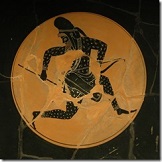


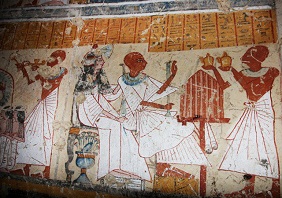
-1000 World pop.: 50M (doubling every 500 years); Persia: 2M; Syria-Palestine: 800K. The Iron I Period of Archeology ends, and the Iron II Period of Archeology begins (ends -600). About this time the Bicameral Mind of humans where the left side takes orders from the right side and thinks it's from a chieftain or god begins evolving into the modern mind, according to Am. psychologist Julian Jaynes (1920-97). The Ionians under Neileus capture Miletus on the W coast of Asia Minor, then kill the men and marry their wives, who get pissed-off and refuse to sit at table with them?; the Temple of Didyma, devoted to Apollo the Didymaion (twin) is built, becoming the 2nd most famous oracle in the Hellenistic world after Delphi. The Chaldeans take and occupy Ur. The Aramaeans overrun Assyria. About this time the original Germans move to Germany from S Norway, Sweden, and Denmark to find some Lebensraum. About this time the ancient city of Damascus in Syria on the Barada River E of the Anti-Lebanon Mts. (ruled by Egyptians and Hittites) becomes an independent Aramaean kingdom. In this cent. the Vannic-speaking Assyrian kingdom of Urartu (Biainele) (Khaldia) is founded in the Armenian mountains of Asia Minor in the Araxes (Aras) River Valley, and the upper Tigris and Euphrates Rivers around Lake Van, with the main cities being Tushpa (capital), Erebuni, and Rusahinili; farming, and cattle, sheep and horse husbandry are practiced; the chief dieties are Khaldis (Haldi) (warrior god), Ardinis (sun god), Teisheba (Teisbas) (Hurrian Teshup) (storm god) and his wife Huba (Hebat); their development of ironworking methods makes them famous among the Greeks. Early in this millennium the savage tattooed horseback nomadic Persian-speaking Scythians (Ashguzai) (Sacae) (Pers. "Skudat" = archers) move into E Europe and the Caucasus (Ukraine) all the way to the N coast of the Black Sea, and according to Herodotus make ceremonial and recreational use of hemp (marijuana); they become known for making cloaks from victims' scalps and cups from their skulls - I want your intestines on a stick and to kill your dog? About this time the city of Pavlopetri (Gr. "Paul's Stone", "Paul's and Peter's") S of the Peloponnese, first inhabited about 2,800 B.C.E. is consumed by the sea after the first of three earthquakes. About this time the warlike red-haired blue-eyed Thracians (ancestors of the Swedes?) settle in N Greece, Bulgaria, and Turkey between the Aegean Sea, Carpathians, Black Sea, and Morava and Vardar Rivers, becoming known for their wine, exquisite works of gold, and the tombs of their chieftains filled with chariots, horses, weapons, and wives. In this cent. the Sabellian Osco-Umbrian-speaking Sabines move to the W Tyrrhenian coastal plain of the Italian peninsula (Latium) from C Europe and vanquish the aborigines, a dark people from the Sahara, moving into the Apennines of C Italy (conquered by the Romans in the 3rd cent. B.C.E.). In this cent. a Greek colony in Smyrna in SW Asia Minor *modern-day Izmir, pop. 2.8M/4.1M) is founded, later claiming to be the birthplace of Homer; it is located at the terminus of the inland trade routes from the Hermus (Gediz) and Meander valleys from the east. In this cent. the harbor city of Tartessus (Tartessos) at the mouth of the Guadalquivir River in S Spain is founded by sea traders, who discover the route to the Tin Islands (Britain) and become trading partners with the Phoenicians. By this time most of England has been cleared of forests, and is covered with farms? About this time Takshashila U. is founded in Taxila ("city of cut stone") in Rawalpindi, Punjab, India, becoming the world's first university, growing to 10.5K students from India, Greece, Babylon, China, Phoenicia, Arabia, and Syria studying 68 different courses; teachers incl. Kautilya, Panini, Jivak, and Vishnu Sharma; after invading Punjab, Alexander the Great takes several scholars back with him to Greece; the Hephthalites (Hunas) destroy it ca. 460 C.E. About this time fortifications are erected on the Festung Ehrenbreitstein Hill near modern-day Koblenz (Coblenz) ("confluence") at the confluence of the Rhine and Moselle Rivers. In this cent. there is a maritime network in the Baltic Sea region, which builds a new type of stone monument arranged in the form of ships on coasts. In this cent. the Celtic Milesians, descended from Milesius of Spain allegedly migrate to Ireland, displacing the native Celtic Firbolg and Tuatha De Danann. In this cent. the Adena civilization (ends 200 B.C.E.) is founded in the Woodlands area of Ohio (N Am.) by tall (6' for women and 7' for men), massive round-headed peoples (other Indians have long narrow skulls and slender bodies), building earthwork monuments, incl. the Great Serpent Mound near modern-day Cincinnati, Ohio. In this cent. the Kingdom of Vanga (Banga) in NE India is founded. About this time trees flourish in SE Iceland in a warm climate, part of a large forest that later disappears after the climate begins cooling about -500. In this millennium the Mayans practice forest conservation? About this time the Bantu peoples in NW Africa begin a mass migration S and E (ends 4th cent. C.E.); their funky Bantu language has 20 genders. About this time the Nok Culture in N Nigeria, known for its life-sized terracotta figures arises, going on to engage in iron smelting by 550 B.C.E. then mysteriously disappear about 300 C.E., giving rise to the Birom, Gwari, Hausi, Jukun, Kanuri, and Nupe peoples. About this time whites from S Europe migrate to S Africa, becoming the Khoisan tribes. Bananas are first cultivated in Vanuatu? In this millennium the Cynetes (Conii) people live in S Portugal (until -600); inscriptions in Southwest Script are later uncovered by archeologists in the area. In this millennium the non-Celtic Ligurians live in Italy N of Etruria, Switzerland, SE Gaul, and Corsica, becoming known for their pacifism and commercialism. In this millennium the Keetoowah settlement on the Tuckasegee River near modern-day Bryson City, N.C. becomes the home of the Cherokee after they migrate from the Great Lakes region of S Canada and N U.S., and they go on to disperse from there, according to Cherokee tradition. About this time the continual grave robbing in the Valley of the Kings causes the royal mummies to be secreted in a common location for guarding; they are safe until the 19th cent., when the Abdul Rassal family discovers them in Deir al-Bahri and begins grave-robbing and selling the loot on the black market? About 1000 B.C.E. a tomb in Luxor, Egypt for Egypt's chief beer brewer is laid; discovered in 2005. I got the powah? The world's loose cannon begins festering, er, developing in the Arabian peninsula? By this time the camel is domesticated in Sharjah, UAE (since 2K B.C.E.?), and a nomadic culture based on goat and sheep herding develops in N Arabia, while the sandy deserts of interior Arabia are linked by camel carvan routes to the N and S; the S mountains employ terracing for cultivation; the N has a priestless polytheistic religion, while the S has a temple-based religion with a pantheon of gods incl. Athtar ("fertile"), Ilmaqah (Almaqah) (moon god), and Wadd ("love"); the N uses Aramaic as its written language, and the S uses Sabean and Minean; the Hadrami tribe rules the Wadi Hadramaut in S Arabia from Shabwa, and controls the production of frankincense; the Mineans control the E foothills of the Sarat (Sarawat) Mts. on the W coast, with capital at Ma'in; Saba (Sheba) (Heb. "promise, oath"), home of the Sabaeans, with capital at Marib (Ma'rib) was the wealthiest S Arabian kingdom, with palaces and temples dedicated to the Moon (Sun?) god Ilmaqah at Sirwah, Yithil, and Sa'ana; migrants from Iberia (Spain) bring their magnificent war horses to North Africa, which spread to Arabia; radiocarbon dating of camel domestication in the S Levant to this time makes all the Bible stories about Abraham, Joseph, and Jacob riding camels in the Age of the Patriarchs into moose hockey? In this millennium standing stones such as in North Down are erected in Ulster. The Late Vedic Period in India ends; by this time the Vedas, by the seven Rishis (Shining Ones) (stars of the Great Bear) are written; Sanskrit as a spoken language begins to break down over the next two cents. By this time the Celts in Scotland, France, Germany enjoy a dark, cloudy, tasty fermented beer made with dark toasted malt; the Romans consider them barbarians and look down on them for not drinking wine, claiming that they use their big beards to strain their beer; meanwhile the Greeks learn beermaking from the Egyptians, teaching it to the Romans, who call beer cerevisia, from Ceres (goddess of agriculture) and vis (stength). In this cent. the Chinese use moldy soybean curd as an antibiotic on wounds. Cinnamon from the Far East reaches the Levant. The soft limestone tablet Gezer Calendar is erected 30 mi. NW of Jerusalem on the site of the Biblical city of Gezer, outlining their lunar agricultural year; a school boy's exercise?; discovered in 1908 C.E. A pottery shard in Khirbet Qeiyafa (the Qeiyafa Ostracon) is left, excavated in 2008 near the Elah Valley in Israel 18 mi. W of Jerusalem on the border of Judah and Philistia, containing the earliest known example of Hebrew writing, making the writing of the Bible possible from this cent. on. The Anthedon Port (AKA Tida Port) is the earliest known seaport in Gaza; discovered in 1997, and bulldozed by Hamas in 2013. In this millennium the Assyrians and Babylonians begin worshiping the demonic god Pazuzu, son of god Hanbi, portrayed with the head of a dog, a scaly body, a serpent-headed penis, the talons of a bird, a scorpion tail, and two sets of wings, and usually with the right hand upraised; he supposedly protects against the disease-bearing SW wind and keeps demoness Lamashtu from stealing babies from the womb; William Petter Blatty's 1971 novel "The Exorcist" features Pazuzu as the demon possessing Regan. About this time the town of Toilia is built in Magna Grecia in memory of the Asia Minor city of Troia; the acropolis is called the Obelanon; in the 16th cent. it is renamed Ferrandina. Inventions: About this time the Kalimba thumb piano is invented in W Africa, tined with bamboo; metal-tined ones appear in the Zambezi River Valley about 700 C.E. About this time the Semitic seafaring Phoenicians invent the Phoenician (Proto-Canaanite) Alphabet, attributing it to the legendary figure Cadmus (Kadmos) ("from the east") from Tyre, who founds the acropolis-citadel of Cadmea AKA Thebes (modern-day pop. 22K), known for the story of the Spartoi ("sown men"), and the Seven-Gated Wall built by Amphion, along with the story of Laius, who butt-fucks Chrysippus, making Thebes famous for pederasty, and the story of Oedipus and the Seven Against Thebes, along with the exploits of Heracles (Hercules) (son of Zeus and Alcmene), the immolation of Semele, and the advent of Dionysus.
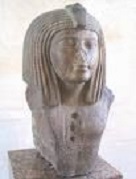
-992 Amenemope dies, and Osorkon (Osochor) the Elder (Aakheperre Setepenre) (d. -986), son of Shoshenq A of the Berber Libyan Ma (Meshwesh) becomes king #5 of the Egyptian 21st Dynasty, becoming the first pharaoh of Libyan extraction.
-990 Abi-Baal (d. -978) ("my father is Baal") becomes king of Tyre (until -981), transforming Tyre into a superb harbor. Alt. date for the birth of Israeli king Solomon (d. -930) after adding 45 years to Bishop Ussher's chronology.
-987 Eulma-Shakin-Shumi dies, and Ninurta-Kudurri-Usur I (d. -985) ("Ninurta protect my border/offspring") becomes king of Babylon
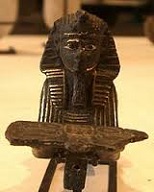
-986 Osorkon the Elder dies, and Siamun ("Son of Amun") (Netjerkheperre-Setepenamun) ("Like a god is the manifestation of Ra, Chosen of Amun") (d. -967) becomes pharaoh #6 of the Egyptian 21st Dynasty. Ninurta-Kudurri-Usur I dies, and his brother (son of Bazi) Shirikti-Shuqamuna ("goft of the god Suqamuna") becomes king of Babylon for 3 mo. (-985?).
-984 Shirikti-Shuqamuna dies, and Mar-Biti-Apla-Usur (d. -979) ("god Marbiti protect the heir") (a soldier from the Sealand with an Elamite name) becomes king of Babylon (until -979), founding the Seventh (Elamite) Dynasty.
-979 Mar-Biti-Apla-Usur dies, and Nabu-Mukin-Apli (d. -943) becomes king of Babylon, founding the Babylonian Eighth Dynasty.
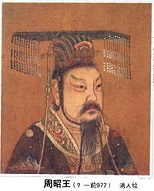
-978 Abi-Baal dies, and his son Hiram I (d. -944) (-980 to -947?) becomes king of Tyre (until -944), going on to unify all of Phoenicia from Mount Carmel to Arvad, except for vassal dynasties in Byblos and Arvad; he later enters into an alliance with King Solomon of Israel, sailing joint fleets in the Mediterranean and Indian Ocean, and trades with the port of Ophir (Supara), near Bombay, India on the W coast of the Indian peninsula, which becomes a flourishing trade center in this cent.; the first Jewish merchants arrive in Yemen, some staying permanently. Zhou Kang Wang dies, and next year his son Zhou Zhao Wang (Ji Xia) (d. -957) becomes Xi Zhou king #4 of China, going on to wage a disastrous war with the Chu confederation, ending his dynasty's expansion and starting its decline.
-975 Death of Israeli king #2 Solomon (b. -1035) in Jerusalem: "In the abundance of wisdom there is an abundance of vexation" (Ecclesiastes 1:18).
-972 Ashur-Rabi II dies, and his son Ashur-Resh-Ishi II (d. -967) ("the god Asshur has lifted my head) becomes king of Assyria (until -967). Alt. date for the end of King David's rule (Eerdman's Dict. of the Bible).

-970 In this year (-972?) (-967?) David is succeeded as king of Israel by his son (by Bathsheba the Bathing Babe) Solomon (-1035 to -975) (-990 to -931) (Sol-Om-On = Sun-Moon-Venus?) (Heb. "shalom" = peace), whom David anointed before he died in order to stop his eldest son (by Haggith) Adonijah (Heb. "Jehovah is my lord") from inheriting the throne; he rules for you guessed it 40 years, and bases his Red Sea navy at Ezion-Geber (Heb. "giant's backbone") on the Gulf of Aqaba (a part of Edom conquered by his daddy which the Israelites stopped at during their 40-year wanderings); he becomes known for his wisdom (3K proverbs, 1,005 songs in his bestselling writings Song of Songs (Song of Solomon) (Canticles), Book of Proverbs, and Ecclesiastes), plus his great riches, incl. 12K horses with horsemen, 1.4K chariots, 700 wives, 300 concubines, and fabled gold mines - the richest and smartest man who ever lived was a Jew?
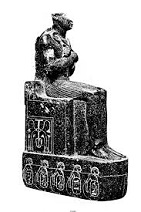
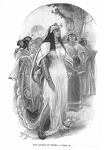
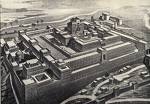
-967 Siamun dies, and high priest of Amun Psusennes (Pasebkhanut) II (Titkheperure) (Tyketkheperre) (Hor-Pasebakhaenniut II) ("Image of the transformations of Ra") (d. -943) becomes king #7 (last) of the Egyptian 21st Dynasty. Ashur-Resh-Ishi II dies, and his son Tiglath-Pileser II (Tukulti-Apil-Esharra) (d. -935) becomes king of Assyria. I can't tell you how happy I am you're here? About this time Jewish King Solomon builds the Temple of Solomon (First Temple of Jehovah) on Mount Moriah ("foundation") AKA Mount Zion in Jerusalem; about this time Solomon, who is known for his active gonads and love of women, and has 700 wives and 300 concubines (1 Ki. 11:3) (but there's always room for more) is visited by the Queen of Sheba (Sheba, Queen of the South) (S Arabia?) (Yemen?) (Ethiopia?) (1 Ki. ch. 10) for 6 mo., who at first makes him promise not to touch her, but as she's a black sugarpants babe and he's got a wicked sweet tooth he tricks her into touching one of his vases, then uses the power (kings only) pickup line, "Now that you have touched something of mine, I will touch something of yours", and jumps her bones (and marries her?), then she returns to her country (Axum?) (Sacred Hill of Yeha?) pregnant with his son Ebna la-Hakim ("son of the wise"), whom she renames Menelik I ("son of the wise"), who goes on to found the Ethiopian Dynasty, as recorded in the (authentic or total moose hockey?) Ethiopian Book of Kings (Kebra Nagast) (Kebia August); he later returns to visit his daddy Solomon (the original Guess Who's Coming to Dinner?), who shows pleasure at his hybrid vigor and gives him the Ark of the Covenant (Tabot) (only a replica?), which he takes back to Ethiopia, where it survives to modern times in a sealed temple where only priests can look at it because it protects the nation; Menelik is buried on Mt. Kilimanjaro; the Ark is secretly transported back to Israel in 1991 C.E.? During King Solomon of Israel's reign the first Jews arrive in India in Solomon's merchant fleet, and some settle in Cochin in S India, later being joined by Jews from Spain et al.; meanwhile a group of 14 shipwrecked Jews settle on the Konkan coast of W Maharashtra, calling themselves Bene Israel.
-965 KingEzron (Rezon) (the Syrian) of Aram-Zobah conquers Damascus, going on to fight with the Israelite kings Saul then David, who defeats Zobah and makes it tributary to Israel (2 Sam. 10) until the accession of Solomon, when it becomes independent again (1 Kings 11:23).
-957 Zhou Zhao Wang dies, and next year his son Zhou Mu Wang (d. -918) becomes Xi Zhou king #5 of China.
-952 Thersippos dies, and Phorbas (d. -921) becomes king of Athens.
-950 The Homeric Minimum of reduced solar activity begins (ends -800). Sudden climatic change in Ulster leads to wetter conditions and a pop. reduction in lowland areas - I'm Finnegan, and I love to fight? About this time Phrygian tribes from Thrace invade the WC plateau of Asia Minor; the Thyni and Bithyni tribes from Thrace migrate to the S shore of the Black Sea, founding Bithynia. Leather is used for written scrolls about this time.
-946 Zhou Mu Wang dies, and Zhou Gong Wang (d. -934) becomes Xi Zhou king #6 of China.
-944 Hiram I dies, and his son Baal-Ezer (Baal-Eser) (Baal-Bazer) I (d. -927) becomes king of Tyre (until -927).
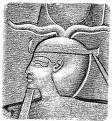
-943 Psusennes II dies, and Shoshenq (Sheshonq) (Sheshonk) I (d. -922) becomes king #1 of the Libyan (Berber Meshwesh tribe) Twenty-Second (XXII) (22nd) (Libyan Bubastite) Dynasty in Egypt, which lasts more than two cents. (until -715); he rules from the city of Bubastis (Per-Bast) ("House of Bastet") (Tell-Basta) in the Nile Delta, and goes on to wage a successful campaign against the kingdoms of Canaan, Philistia, Syria, Judah, Israel, and the Negev, conquering Megiddo, Byblos et al. (not Jerusalem?); the Shishak of the Bible? (1 Kings 11:40, 1 Kings 14:25, 2 Chron. 12:2-9). Nabu-Mukin-Apli dies, and Ninurta-Kudurri-Usur II becomes king of Babylon for 8 mo.
-942 Ninurta-Kudurri-Usur II dies, and his brother Mar-Biti-Ahhe-Iddina (d. -920) ("has given me brothers) becomes king of Babylon.
-934 Tiglath-Pileser II dies, and his son Ashur-Dan II (d. -912) becomes king of Assyria. Zhou Gong Wang dies, and Zhou Yi Wang (d. -909) becomes Xi Zhou king #7 of China.
-932 Alt. date for the end of Solomon's rule (Eeerdman's Dict. of the Bible).
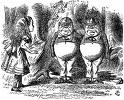
-931 The original Tweedledum and Tweedledee? Solomon (b. -990) dies after pissing-off Jehovah by letting his pagan wives lure him into their dirty business (but out of respect to his daddy David he waits until Solomon dies to lower the boom), and he is succeeded by his 40-y.-o. son (by an Ammonite mother) Rehoboam (Roboam) (-972 to -914) (Heb. "who enlarges the people"), who is crowned in Shechem, and reigns for 17 years as the last king of the united monarchy, and the first ruler of the S 2-tribe kingdom of Judah-Benjamin (plus Levites and individual switchovers); shortly after his coronation the 10 tribes of N Israel revolt from his heavy-handed tax machine and make Jeroboam (d. -910) (Heb. "he increases the people", "he pleads the people's cause") their king after recalling him from Egypt, and the kingdom splits into the rival kingdoms of 10-tribe Israel (N) (capital Shechem then Tirzah) and the poorer 2-tribe Judah (S) (capital Jerusalem) (1 Kings 11-12, 2 Chron. 10:1); end of the Hebrew Camelot Days; Rehoboam then supposedly listens to his Ammonite mother Naamah and abandons the true faith of Jehovah for sex worship, pissing Big J off again, resulting in an Egyptian invasion in his 5th year (1 Ki. 14:22-24 2 Chron. 12-1).
-930 Eurysthenes dies, and his son Agis I (d. -900) becomes Agiad king #2 of Sparta. Abi-Ball becomes king of Byblos in Phoenicia (until -920). Abi-Baal (d. -978) becomes king of Tyre, which is tra
-927 Baal-Ezer I dies, and his brother Abd-Ashtart (Abd-Astratus) (d. -918) becomes king of Tyre.

-926 Solomon's Temple of Jehovah in Jerusalem is plundered by the Egyptians in the 5th year of Judean king Rehoboam by his protector Pharaoh Shishak (Sheshonq I?), who allegedly carries the Ark of the Covenant to Tanis, as mentioned in the first Steven Spielberg Indiana Jones flick Raiders of the Lost Ark (1981) ; he takes all the treasures of the Jewish Temple and the king's house, incl. the gold shields of Solomon, which Rehoboam replaces with copper ones (1 Ki. 14:25-28, 2 Chron. 12:1-12).

-922 Tanis is buried in a month-long sandstorm; Shishak I dies, buried along with the Ark of the Covenant :), and his son (by Karomat A) Osorkon I (d. -887) becomes king #2 of the Egyptian 22nd Dynasty, going on to build many temples.
-921 Phorbas dies, and Megakles (d. -891) becomes king of Athens.
-920 Mari-Biti-Ahhe-Iddina dies, and Shamash-Mudammiq (d. -900) (named after Assyro-Babylonian sun-justice god Shamash) becomes king of Babylon. Elibaal becomes king of Byblos in Phoenicia.
-918 Abd-Ashtart dies, and Methus-Ashtart (Methus-Astartus) (d. -906) becomes king of Tyre (until -906).
-914 Rehoboam (b. -972) dies at age 58, and his son (one of 28) Abijah (Abijam) (d. -911) (Heb. "my dad is Jehovah") becomes king #2 of Judah (1 Ki. 14:31, 15:1-8); he is the son of Rehoboam's favorite concubine (of 60 concubines and 18 wives) Maacah (Micaiah) (2 Chron. 13), the granddaughter of David's favorite (3rd) son Absalom, and a descendant of King David on both his father's and mother's side, and hence "leaned upon Jehovah" (2 Chron. 13:13-20), proving it by marrying 14 wives and fathering 22 sons and 16 daughters.
-912 Abijah's army of 400K defeats Jeroboam's army of 800K, killing 500K of them and breaking Jeroboam's military power; the sacred golden calf city of Bethel is captured (2 Chron. chs. 12-13). Ashur-Dan II dies, and his son Adad-Nirari II (d. -891) becomes king of Assyria.
-911 Abijah dies, leaving 38 children by 14 wives, and his son Asa (d. -870) becomes king #3 of Judah (2 Chron. 13:21, 14:1, 1 Ki. 15:9-10).
-910 Jeroboam dies, and his son Nadab (d. -901) (Heb. "generous, noble") becomes king #2 of the northern 10-tribe kingdom of Israel, continuing his father's golden calf worship - preferring McDonald's to Mister Steak?
-909 In year 3 of King Asa of Judah (1 Kings 15:28) while sieging the former Levite city of Gibbethon (in Philistine hands), Nadab is assassinated by Baasha (d. -886) (Heb. "Baal hears"), the son of Ahijah of the tribe of Issachar, who then exterminates Jeroboam's house and takes the throne of Israel for himself, becoming king #3 of the 10-tribe kingdom of Israel, founding Israel's second dynasty and ruling for 24 years (1 Ki. 14:10, 20, 15:25-31). Zhou Yi Wang dies, and Zhou Xiao Wang (d. -894) becomes Xi Zhou king #8 of China, ordering the Duke of Shen to attack the Quan Rong in NW China.
-906 Methus-Ashtart dies, and his brother Astarymus (d. -897) becomes king of Tyre (until -897).



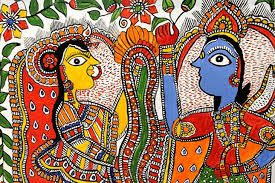
About this year the Iron Age Cold Epoch (Neoglaciation) (Climate Pessimum) begins (ends -300), bringing unusually cold climate to the North Atlantic, peaking during the expansion of Greece era about 450 B.C.E. Agis I dies, and Echestratus (d. -870) becomes Agiad king #4 of Sparta. Shamash-Mudammiq dies, and Nabu-Shuma-Ukin I (d. -887) becomes king of Babylon. In this cent. the Phoenicians sail W through Gibraltar, founding new colonies in Gades ("wall") (modern-day Cadiz) (SW coast of Spain near Gibraltar), Utica (Tunisia, N Africa), and Lixis (W coast of Africa). In this cent. the city of Lanuvium (Lanivium) 20 mi. SE of Rome is founded by Diomedes of Troy; in this cent. Rome is really founded? In this cent. the city of Samarkand ("samar" + "kand" = rock + fort) in modern-day Uzbekistan (modern-day pop. 500K) is founded. In this cent. Celtic peoples invade the British Isles. Late in this cent. the Greeks adopt the Phoenician alphabet after it is brought by Phoenician traders, and the Classical Period of the Greek Language begins, bringing the Attic dialect to the fore (ends -330) - At-ti-ca, At-ti-ca, At-ti-ca? Italy is an anthill of competing tribes? In this cent. the non-Indo-European-speaking Etruscans migrate from Asia Minor to the Italian Peninsula, settling in mineral-rich Etruria (modern-day Tuscany-Umbria) in the W-C part N of Rome, becoming skilled in bronze, silver and goldwork, as well as granular decoration, and originating many of the things Romans are later known for, incl. gladiator contests, road and bridge building, irrigation works, and the trumpet (salpinx); they worship the Sun god Cautha (Cath), along with Tinia and Uni (prototypes of Jupiter and Juno), and construct tombs which are houses for the dead, decorated with paintings showing a joyous afterlife; the Sabellians also inhabit Italy, along with the Iapygians (Iapyges) in Apulia (Puglia) (in the heel of SE Italy between the Appenines, Adriatic and Gulf of Taranto), the Venetic-speaking Veneti in Venetia, and the Latin-speaking Latins in Latium, the region to the E and S of Rome on the W Tyrrhenian coastal plain, from the Tiber River in the N to Monte Circeo 65 mi. to the S, bounded on the N by Etruria, the S by Campania Felix (Lat. "fertile countryside") (known for good farmland and harbors), the E by the foothills of the Apennine and Lepini Mts., and split into 50 small communities; about this time Rome is six clusters of round twig huts on six low hills just SE of the Tiber River, with a marketplace beside the river and a crude fortress on the 7nth hill; one of the hills is eventually taken over by the Sabines; the oldest city of Latium is Alba (Lat. "white") Longa (founded in the 12th cent. B.C.E.); in this cent. Nicostrata (a woman) allegedly invents the Roman alphabet from the Chalcidian alphabet of Cumae; popular Latin names are based on the god Mars (Marcus, Marcellus). About this time the Videha (Mithila) (Tirabhukti) Kingdom (ends -500) in the Mitila region of modern-day Bihar in N India between the Mahananda River, Ganges River, Gandaki River, and foothills of the Himalaya Mts., becomes a major political-cultural center of India along with Kuru and Pancala, becoming known for 8th-7th cent. world-renouncing philosopher king Janaka (father of Sita in the "Ramayana") , whose court became an intellectual center for sages (rishi) incl. Yajnavalkya (Yagyavikya), who coins the term Advaita (monism) and welcomes women to participate in Vedic studies; the Madhubani district of Mithila becomes known for Madhubani Art, created by women and characterized by eye-catching geometrical patterns with ritual content. The Chavin Civilization is founded in the Andes region of Peru (ends 200 C.E.), forming the basis of the 15th cent. C.E. Inca Empire; the shrine of Chavin de Huantar (HuŠntar) in the foothills of C Peru creates and spreads religious icons based on jaguar men and snakes. About this time Ancient Greek Architecture begins (ends 100 C.E.), becoming known for its temples, open-air theaters (starting -525), public squares (agoras), storied colonnades (stoas), processional gateways (propylons), town council bldgs. (buleuterions), public monuments, monumental tombs (mausoleums), and stadiums; architectural styles are divided into the Doric Order, the Ionic Order, and the Corinthian Order; Ancient Roman Architecture shamelessly steals from them. In this cent. Rishabha (Adinatha) (First Protector) AKA Adishvara or Adeshvara (Primal Lord), the 23rd Tirthankara (ford maker) allegedly founds Jainism (Sansk. "to conquer"), the religion of not hurting a fly (non-violence and self-control), which peaks in India in the 8th cent. B.C.E., and after all the carnage is now down to 4M followers, albeit 90+% literate. The Osorkon Bust (Elibaal Inscription is discovered in Byblos, Phoenicia (modern-day Lebanon) in 1881. A green 26-lb. 5-in.-thick Olmec stone slab inscribed with insects, corn, and fish (28 glyphs) is discovered in Mexico in 2006, becoming the earliest known example of writing in the Western Hemisphere. Architecture: The 42m-high Buddhist Mahayana temple (stupa) Borobudur ("monastery on a hill") is built in C Java in this cent. Poetry: Poetry: In this cent. the Sanskrit Mahabharata, the world's longest epic poem is written in India, about the struggle between the Pandava and Kaurava families - the original Dallas, Dynasty, and Falcon Crest?
-899 On Apr. 21 there is a solar eclipse, causing a "double dawn" over Zheng, China.
-897 Astartymus dies, and his brother Phelles (d. -896) becomes the last king of the Abi-Baal Dynasty of Tyre.
-896 Phelles is assassinated by Esh-Baal (Itto-Baal) (d. -863), high priest of Astarte, who becomes king of Tyre (until -863) and founds a new dynasty; he marries his 15-y.-o. daughter Jezebel (Heb. "Where is the prince [Baal]?) to Ahab (Heb. "uncle"), son of Omri in Israel, and links his house by marriage to Ben Hadad I of Damascus; Ahab builds her a temple to Astarte, pissing-off the Jehovah purists.
-895 Spartan king Soos dies, and Eurypon (Eurytion) (d. -865) becomes king #3 of Sparta, founding the Eurypontid Dynasty.
-894 Zhou Xiao Wang dies, and Zhou Yi Wang (d. -878) becomes Xi Zhou king #9 of China.
-891 Adad-Nirari II ("Father of Assyrian Imperial Admin.") dies after signing a treaty with Babylon guaranteeing peace for 80 years, and his son Tukulti-Ninurta II (d. -884) becomes king of Assyria. Megakles dies, and Diognitos (d. -863) becomes king of Athens.
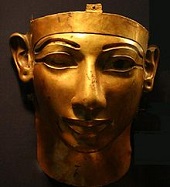
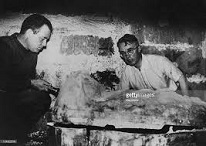
-887 Osorkon I dies, and his son Shoshenq (Shishenq) (Haqakheperre) II (d. -885), becomes king #3 of the Egyptian 22nd Dynasty, becoming the only king of this dynasty whose tomb isn't plundered because it is hidden inside an antechamber of Psusennes I's tomb in Tanis; in the 1939-40 season French Egyptologist Jean Pierre Marie Montet (1885-1966) discovers the intact tombs of Pharaoh Psusennes I, Pharaoh Amenemope, and Pharaoh Shoshenq II, along with the partially-plundered tomb of Takelot I, and the fully-plundered tomb of Osorkon II in Tanis; on May 20, 1939 he removes Shoshenq II's coffin lid in the presence of King Farouk of Egypt, and discovers a hawk-headed silver coffin, gold funerary mask, and a treasure trove of jewel-encrusted bracelets and pectorals. Nabu-Shuma-Ukin I dies, and Nabu-apla-iddina (d. -855) becomes king of Babylon, having the Stone Tablet of Nabu-apla-iddina inscribed to record a deed restoring lands to a priest.
-886 Baasha dies and is buried in his capital city Tirzah, and his son Elah (d. -885) (Heb. "big tree") becomes the king #4 of the 10-tribe kingdom of Israel, ruling in Tirzah for parts of two years (1 Ki. 16:8).
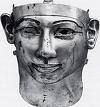
-885 Osorkon I dies, and his son (by Tashedkhons) Takelot I (Hedjkheperre Setepenre) (d. -872) becomes king #4 of the Egyptian 22nd Dynasty. In the 27th year of Asa of Judah (1 Ki. 16:15-18), Judean king Elah's chief of half the chariots Zimri (Zambri) rebels, waits until the army is on maneuvers at Gibbethon and Elah is drunk, then kills him and the whole house of Baasha, allegedly fulfilling a prophecy (1 Ki. 16:1-14); he then proclaims himself king #5 of the 10-tribe kingdom of Israel, but rules for only seven days when the army proclaims army chief Omri king and returns to siege him at Tirzah, causing him to burn the king's house down over himself (1 Ki. 16:3-20) and die; later el taunts Jehu from a window with the killer soundbyte, "Did it go all right with Zimri the killer of his lord?" (1 Ki. 9:30-31); Omri (d. -873), of who knows what tribe becomes king #6 of the northern 10-tribe kingdom of godforsaken Israel, ruling for 12 years and founding its third dynasty, which is so powerful that the Assyrians start calling Israel "the land/house of Omri", even after his house falls; Tibni, the son of Ginath presents himself as the rightful (7th) king, dividing the people and causing a 4-year civil war.
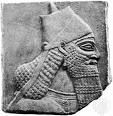

-883 Tukulti-Ninurta II dies after rebuilding the walls of Nineveh, and his son Ashurnasirpal (Assurnasirpal) (Ashur-Nasir-Apli) II (d. -859) becomes king of Assyria, and the king of cruel, the "classic Neo-Assyrian monarch", known for undertaking 10 major military campaigns throughout W Asia as far as the Mediterranean; he moves the capital from Assur (Ashur) to Nimrud-Kalash; "I built a pillar against his city gate and I flayed all the chiefs who had revolted, and I covered the pillar with their skin. Some I walled up within the pillar, some I impaled upon the pillar on stakes, and others I bound to the stakes of the pillar."
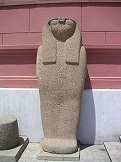
-880 Shoshenq II's son Harsiese A (Hejkheperre Setepenamun) (d. -860), high priest of Amun in Thebes declares himself king of Egypt, founding the Twenty-Third (XXIII) (23rd) Egyptian Dynasty (ends -720), and splitting Egypt N-S. Tibni dies, leaving Omri the sole (and now 8th) king of the 10-tribe kingdom of Israel for eight years (1 Ki. 16:21-23, 29), where he continues doing sex, drugs and rock & roll ("kept doing what was bad in the eyes of Jehovah and came to do worse than all who were prior to him") (1 Ki. 16:25-26), although that doesn't stop him from "mightiness" (1 Ki. 16:27); about 840 B.C.E. the Moabite Stone says (lines 4-8) that he brings Moab into subjection, which Ahab continues after him (2 Ki. 3:4); he moves the capital from Tirzah to the more defensible new city of Samaria, which he purchases along with the whole mountain from its owner Shemer (1 Ki. 16:23-24); he surrenders some cities to the king of Syria (1 Ki. 20:34), and is the first Israelite king to pray tribute to Assyria; it contains a reference to the House of David?
-879 Ben-Hadad II (d. -842) becomes king of the Arameans, and forms a coalition of neighboring kingdoms (incl. Israel and Judah) to fight the superpower threat from Assyria.
-878 Ashurnasirpal II captures the Aramean stronghold of Kaprabi. Zhou Yi Wang dies, and Zhou Li Wang (d. -827) becomes Xi Zhou king #10 of China.
-877 Ashurnasirpal II begins his great campaign to Phoenicia, conquering Karkimesh, Aleppo and the coast of Lebanon.
-873 Omri dies, and in -871 his son Ahab (d. -853) (Heb. "father's brother") becomes king #9 of the 10-tribe kingdom of Israel, ruling in Samaria for 22 years (1 Ki. 16:28-29, 22:40, 51); he marries 15-y.-o. Jezebel (Heb. "Where is Baal?") (1 Ki. 16:31) of Tyre, great-aunt of Carthage founder Dido and daughter of Itto-Baal (Ethbaal) (Ithobalus) (former priest of Ashtoreth AKA Astarte AKA Asherah), and king of Sidon by regicide), who leads him down from family-style golden arches calf worship to total sex-drugs-and-rock-n-roll (Tom Cruise and Nicole Kidman style?) Baal worship, supporting 450 prophets of Baal from the royal table and ordering all of Jehovah's prophets slain (100 are saved by Ahab's house mgr. Obadiah by hiding them in a cave) (1 Ki. 18:3-13, 19:10); Ahab rebuilds Jericho to strengthen control over Moab, and fortifies Samaria, building a "house of ivory" (1 Ki. 22:39, Amos 3:15, 6:4); after Syrian king Ben-hadad demands Gilead (on the E bank of the Jordan River) and Ahab refuses, uttering the soundbyte "It is not the man who puts on the armor who should boast... but the one who takes it off", Ben-hadad leads a 32-king coalition on Ahab, but is defeated (1 Ki. chs. 20-21); too bad, Ahab doesn't follow Jehovah's orders and kill Ben-Hadad, but extends him the hand of peace, pissing off Jehovah's prophet Elijah, who begins an epic power struggle with him and his "harlot" wife Jezebel and their prophets of Baal (1 Kings chs. 17-19), beginning with three years of drought.

-872 Takelot I dies, and his son (by Kapes) Osorkon II (d. -837) becomes king #5 of the Egyptian 22nd Dynasty, ruling from Tanis, facing competition from his cousin Harsiese A, who rules from Thebes, but soon dies, allowing Osorkon II to appoint his young son (by Djedmutesankh) Nimlot C as high priest of Amun in Thebes; meanwhile he appoints his young son Hornakht (Harnakht) as high priest of Amun in Tanis, who dies before age 10, and is buried in his tomb in Tanis.
-870 Echestratus dies, and his son Labotas (Leobotes) (d. -840) becomes Agiad king #4 of Sparta, launching a war against the Argives. Asa dies, and his 35-y.-o. son (by Azubah the daughter of Shilhi) (co-regent since -873) "Jumpin'" Jehoshaphat (Yehoshafat) (Jehosaphat) (Josaphat) (d. -849) (Heb. "Jehovah is judge") becomes king #4 of Judah, ruling for 25 years (1 Kings 22:41-2, 2 Chron. 20:31), proving to be one of the "good" kings, his reigned marked by peace and even tribute from Philistines and Arabs; too bad that he enters into a marriage alliance with idolatrous Israel, marrying his firstborn son Jehoram to king Ahab's wicked daughter Athaliah (1 Ki. 22:44, 2 Chron. 18:1).
-867 Phoenicia is subjugated by Assyria (ends -612).
-865 Eurypon dies, and Prytanis (d. -835) becomes Eurypontid king #2 of Sparta.
-863 Diognitos dies, and Pherekles (d. -844) becomes king of Athens. Esh-Baal I dies, and his son Baal-Eser II (d. -829) becomes king Tyre (until -829).
-860 Karibil A founds the Kingdom of Saba (Sheba) ) in S Arabia (Yemen) (ends -275), with the kings being known as the makrab after they conquer surrounding states, going through 79 kings by 275 C.E., when the Himyar (Himyarite) Kingdom (founded -110) in Yemen under Yasir Yuhan'im I conquers it, going through 23 kings by the time it ends in 577 C.E. with Maadikarib III.
-859 Ashurnasirpal II dies, and his son Shalmaneser (Shalmeneser) III (Shulanu-Asharedu) (d. -824) becomes king of Assyria, with capital at Nineveh (2 Ki. chs. 7-8); a relief shows him shaking hands with a Babylonian ruler, becoming the earliest known depiction of a handshake? About this time Aramu (Arame) (d. -824) becomes the first king or Urartu, with capital at Arzashkun, which is captured and burned by Shalmaneser III in the -840s.
-856 Shalmaneser III defeats the Amorite state of Bit-Adini (Beth Eden) ("house of Eden") and establishes a bridgehead over the Euphrates River; he also defeats Aramu (Arame), the first known king of Urartu (Lake Van).
-855 Shalmaneser III raids Kizzuwatna (Cilicia) (SE Asia Minor on the Mediterranean coast), Syria, and Urartu, pillaging N of Lake Van. Nabu-Apla-Iddina dies, and Marduk-zakir-shumi I (d. -819) ("Marduk pronounced the name") becomes Dynasty IX king of Babylon (until -819).
-853 Shalmaneser III enters the plains of Syria and is met by a Syrian coalition army led by Iruhuleni of Hama and Ben-Hadad II of Damascus, supported by 12 kings, incl. those of Phoenicia and Israel (King Asa contributes a chariot force); Assyria claims a V at the Battle of Karkar (Qarqar) on the Orontes River, although it is really indecisive; King Ahab of Israel induces King Jehoshaphat of Judah to join him in the retaking of Ramoth-gilead from the Syrians, and is killed by a Syrian archer; when his body is brought to Samaria for burial, Jehovah's curse (1 Ki. 21:1-23, 2 Ki. 9:26) on him for the murder of his Jezreelite neighbor Naboth comes true, because when "they began to wash off the war chariot by the pool of Samaria... the dogs went licking up his blood" (1 Ki. 22:1-38); Ahab's son Ahaziah (d. -852) (Heb. "Jehovah has taken hold") becomes king #10 of the 10-tribe kingdom of Israel for two years, continuing to practice Baal worship (1 Ki. 22:51-3); Moab quickly revolts (2 Ki. 1:1, 3:4-5), but before he can take charge Ahaziah has a house accident, falling through a grating in his roof chamber, leaving him bedridden (2 Ki. 1:2); his brother Jehoram (d. -841) becomes co-regent; Israel forms a shipbuilding alliance with King Jehoshaphat of Judah at Ezion-Geber on the Gulf of Aqaba, but it fails (2 Chron. 20:35-7, 1 Ki. 22:48-9).
-852 The city of Nisibis in SE Asia Minor is first mentioned as the seat of Assyrian provincial gov. Shamash-Abua. The ailing Ahaziah has a sorcerer's battle with Jehovah's prophet Elijah (who gives him a death notice from Big J himself) and loses (1 Ki. ch. 2-17), dying sonless, leaving his brother Jehoram (Joram) (d. -841) (Heb. "Jehovah is exalted") (brother-in-law of the other Jehoram in Judah because the latter is married to his sister Athaliah) as the 11th king of the 10-tribe soap opera kingdom of northern Israel; he reigns 12 years (2 Ki. 1:17-18, 3:1, 9:22), reversing his daddy's Baal thang, removing the sacred pillar erected by the red priest Lucille (just kidding, it was the Babalu priest Desi), but still falling short, continuing to do "what was bad in Jehovah's eyes", clinging to Jeroboam's golden calf worship (1 Ki. 12:26-29, 16:33; 2 Ki. 3:2-3); Joel writes his book during his reign?; Elijah is taken up to ? in a windstorm (and years later writes a letter to Judean king Jehoram, 2 Chron. 21:1, 12-15), and his assistant (for the past six years) Elisha succeeds him as Jehovah's prophet in Israel, performing many miracles in his 60-year ministry after asking Jehovah for "two parts in Elijah's spirit" (2 Ki. 2:9) so he can be his firstborn spiritual son, entitled to two parts of his father's inheritance. Meanwhile, in South Soapoperaland, Jehoshaphat's firstborn son Jehoram becomes co-ruler with his father of the kingdom of Judah.

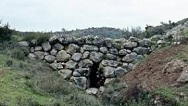
-850 About this time the Aryan tribe of Persians settles in Anshan S of Susa, and the Aryan Invasion of Persia (Iran) (begun -1900) ends. Mesha, son of Kemoshmelek, king of Moab E of the Dead Sea erects the Moabite Stone, crowing about his successful revolt against the Hebrews and their whimpy god Jehovah (Yahweh), becoming the earliest known reference to this god outside the Bible (see 2 Ki. 3:27 for the Israelite version); rediscovered in 1868 C.E. Syrian king Ben-Hadad erects a monument in the city of Dan proclaiming his big V over the towns of N Israel. The brother of Marduk-Zakir-Shumi I launches a revolt against Babylon with the help of the Arameans; Babylon calls on Assyria for help, and Shalmaneser III defeats the rebels, making Babylon a vassal. Architecture: The oldest datable bridge on Earth is a slab-stone single-arch bridge over the Meles River in Smyrna (Izmir), Turkey.
-849 Baal-Mazzar (d. -830) becomes king of Tyre? Jehoshaphat dies, and his 32-y.-o. firstborn son Jehoram (d. -842) (Heb. "Jehovah is High") becomes king #5 of Judah, reigning eight years (2 Ki. 1:17, 8:16, 21:2-20); thus both Judah and Israel are ruled by brothers-in-law named Jehoram; due to his wife Athaliah's bad influence, Jehoram of Judah departs from his dad's righteous ways, murders his six brothers, causes Edom and Libnah to rebel (2 Ki. 8:20-22), and is plagued by Arabs and Philistines who invade and overrun Judah and take his wives and sons captive - a foretaste of the days of Muhammad? Shalmaneser III campaigns against Syria.
-848 Shalmaneser III campaigns against Syria.
-844 Pherekles dies, and Ariphron (d. -824) becomes king of Athens. Aramu dies, and his son Lutipri (d. -834) becomes king #2 of Urartu.
-843 King (since -865) Ben-Hadad II (Hadadezer) (Adad-Idri) of Aram-Damascus sends to inquire of prophet Elisha if he will recover from his sickness, and the latter predicts that he will die and that Hazael will rule in his place; the next day (842 B.C.E.) Hazael suffocates the king under a wet "netted cloth" and becomes king of Aram-Damascus (2 Ki. 8:15), going on to fight the Assyrians and gaining influence over the N Syrian state of Unqi, expanding its borders over large parts of modern-day Syria and Israel-Samaria, conquering Israel and reaching most of the Golan to the Sea of Galilee.
-842 King Baal-Mazzar of Tyre pays tribute to Shalmaneser III. After receiving a prophetic mandate, Jehu, son of Nimshi and CIC of the army is anointed king in Ramoth-gilead in order to destroy the house of Ahab in retaliation for the acts of wicked Jezebel, and leads a bloody military revolt to seize the throne of Israel; after meeting Jehoram of Israel at Jezreel and telling him that there can be no peace in Israel while the "whoredoms and sorceries" of Jezebel continue, he shoots an arrow through the fleeing king's heart, then kills King Ahaziah of Judah (grandson of Ahab and El), then returns to Jezreel to kill Jezebel herself; she tries to pussy-whip him by dressing up and flashing him from a window, but her own attendants throw her out and she is trampled to death by horses, then eaten by dogs, leaving only the skull, feet, and palms (2 Ki. 9:32-37); Jehu (d. -814) (Heb. "Jehovah is he") becomes king #10 of Israel (2 Ki. chs. 9-10); as a "son of a murderer" (2 Ki. 6:32) Jehoram's body is pitched into the field of Naboth, the man his daddy Ahab had murdered in order to get a vineyard (2 Ki. 9:14-26); Jehu wipes out the dynasty of Omri, and obliterates Baal worship in Israel; his dynasty lasts five generations, so Jehovah must have really liked it? Not to be left out of the TV sweeps, Jehoram of Judah, plagued by Jehovah with a sickness in his intestines for two years, tosses his matzohs when "his intestines came out", and he dies and is buried in Jerusalem, "but not in the burial places of the kings"; next year his son Ahaziah (Jehoahaz) (d. -841) (Heb. "Jehovah has t aken hold"), who escaped the invasions becomes king #6 of Judah, reigning only 1-2 years (1 Ki. 22:51-3; 2 Ki. 1:17-18, 3:1-3, 10:12-14; 2 Chron. 21:7, 6-20; 22:1; 1 Chron. 3:10-11), and having a new son Jehoash with his wife Zibiah from Beersheba (2 Ki. 12:1; 1 Chron. 3:11).


-841 Baal-ezer II dies, and his son Mattan I (d. -832) becomes king of Tyre. Ahaziah is killed by Jehu (2 Ki. 9:14-28), and his enraged mother Athaliah (d. -835) (Heb. "Jehovah is great, exalted") kills all the others of the royal line except Ahaziah's infant son Jehoash, who is hidden by the high priest Jehoiada and his wife Jehosheba (Jehoash's aunt) in the Temple; Athaliah takes the throne by force, becoming king #7 (only female) of Judah, reigning for six years, taking the opportunity to rob the Temple of its holy things and offer them up to her god Baal, which as you must know by now, makes Jehovah mighty angry. Shalmaneser III campaigns against Syria; he attacks Damascus, crushing the army of Hazael; he receives gold and silver tribute from Judean king Jehu, son of Omri, and erects the Black Obelisk of Shalmaneser III.
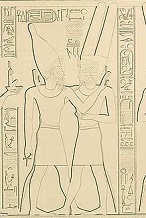
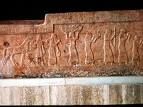
-840 Nimlot C dies, and his son Takelot F (high priest of Amun in Thebes) becomes Takelot II (Hedjkheperre-Setpenre) (Se Ese = "Son of Isis") (d. -815), king #2 of the Egyptian 23rd Dynasty. Labotas dies, and his son Doryssus (Dorissus) (Doriagus) (d. -820) becomes Agiad king #5 of Sparta. Ft. Shalmaneser in Nimrud-Kalash is built; it is excavated in 1957 C.E.
-838 Shalmaneser III attacks Damascus, fails, and never returns to Syria.
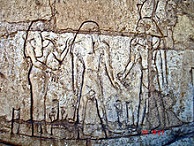
-837 Osorkon II dies, and non-son Shoshenq III (Usermaatre Setepenre) (Setepenamum) (d. -798) becomes king #6 of the Egyptian 22nd Dynasty, ruling for 39 years.
-836 The Assyrians defeat the Medes, becoming their first known mention in historical records.
-835 Prytanis dies, and Polydectes (d. -805) becomes Europontid king #3 of Sparta. Ahaziah's youngest son Jehoash having been hidden in the Temple until he reaches the ripe old age of 7, high priest Jehoiada (Heb. "Jehovah knows") and his wife Jehosheba gain the help of five chieftains and 500 men, then stage a palace coup (2 Ki. 11:4-12, 21; 2 Chron. 23:1-11), kill Athaliah at the entry of the horse gate, tear down her house of Baal and murder her Baal priest Mattan (2 Ki. 11:13-20, 2 Chron. 23:12-21); they crown Jehoash (Joash) (d. -796) (Heb. "Jehovah is strong, "Jehovah has bestowed") as king #8 of Joltin' Judah; he reigns 40 years, at first being placed under the wing of Jehoiada, marrying two wives, one of which, Jehoaddan, saves the faltering line of David leading to Messiah; but upon the death of Jehoida he goes bad, opts for idolatry and phallic sacred poles, and finally kills the prophet Zechariah, thus sealing his Biblical fate (2 Chron. 24:20-22).
-834 Lutipri dies, and his son Sarduri (Sarduris) I (d. -828) becomes king #3 of Urartu, moving the capital to Tushpa (Van), and fighting the Assyrians.
-832 Mattan I dies, and his son Pummayyon (d. -785) becomes king of Tyre.
-830 Baal-Mazzar of Phoenicia dies? Damascus king Hazael destroys the Philistine city of Gath, home of Goliath; rediscovered in 2015.
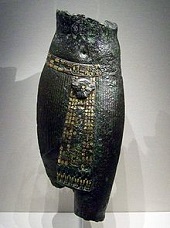
-829 Pedubast (Pedubastis) I (d. -804) becomes king #3 of the Egyptian 23rd Dynasty, ruling for 25 years, going on to get into a long civil war with Takelot II, taking over in -815, after which he makes his son Iuput (Auput) I his co-regent, becoming king #4. Baal-Eser II dies, and Mattan (Mittin) I (d. -820) becomes king of Tyre (until -820).
-828 Sarduri I dies, and his son Ishpuinis (Ispuini) (d. -810) becomes king #4 of Urartu, going on to conquer the city of Musasir from the Mannaeans and make it the religious center of his empire, which worships war god Haldi; he then stops an attack by Assyrian king Shamshi-Adad V, after which he begins calling himself "king of the Universe", "glorious king", and "king of the land of Nairi".
-827 A revolt erupts in Assyria led by Shalmaneser III's son Ashur-Dan-Aplu. Zhou Li Wang dies, and Zhou Xuan Wang (d. -781) becomes Xi Zhou king #11 of China.

Takelot II (d. -800) founds the Egyptian Twenty-Fourth (XXIV) (24th) Dynasty, which rivals the 23rd.
-824 Shalmaneser III dies before the revolt ends, and his son Shamsi-Adad V (d. -810) becomes king of Assyria; Babylon helps Assyria put down the great rebellion. Ariphron dies, and Thespieas (d. -797) becomes king of Athens.
-823 The Assyrian revolt is crushed.
-822 Urartian king Ishpuini fights the Assyrians.
-820 Mattan I dies, and Pygmalion (Pu'mayton) (d. -774) becomes king of Tyre (until -774). Doryssus is KIA in a battle with the Argives, and his son Agesilaus I (d. -785) becomes Agiad king #6 of Sparta.
-819 Marduk-Zakir-Shumi I dies, and Marduk-Balassu-Iqbi (d. -813) ("Marduk has promised his life") becomes king of Babylon.
-814 Jehu dies, and his son Jehoahaz (Joahaz) (d. -798) becomes the 13th king of Israel. The Phoenician settlement in Kition (Latarkia) moves out and founds the new independent town of Qart Hadasht (New City), later called Carchedon by the Greeks, and Carthage (Carthago) by the Latins; it eventually has a 20-mi.-circumference wall built around it; according to myth it was founded (in -814?) by Queen Dido (Elissa) (Alissar), daughter of King Belus of Tyre, whose brother and co-monarch Pygmalion murdered her hubby-uncle Sychaeus (Acerbas), high priest of Melqart in the temple, hiding it from her for a long time and causing her to flee there; after being offered as much land by native chief Iarbas as a bull's hide can cover, she cuts one into thin strips and pastes them together to maximize the area; after committing suicide to avoid marrying him, a nig, er, African prince, and/or hooking up with lily-white Troy survivor Aeneas and doing it because he jilted her, she is visited by Aeneas in the underworld, who sees her reunited with Sychaeus, and won't look at him; Carthage is destroyed by the Romans in 146 B.C.E.; they engaged in child sacrifice?
-813 Marduk-Balassu-Iqbi is deposed by Shamshi-Adad V and carried off to Assyria.
-811 Baba-Aha-Iddina is deposed by Shamshi-Adad V; there are no kings in Babylon for a dozen years.
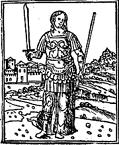
-810 Shamshi-Adad V dies, and his wife Semiramis (Semiramide) (Semiramida) (Shamiram) (Sammuramat) rules Assyria while her son is a minor; she later becomes the focus of a great legend about an Amazon warrior babe. Ishpuinis dies, and his son Menua (Menuas) (d. -785) becomes king #5 of Urartu (Lake Van), going on to extend his kingdom to the entire Armenian highland area, building the walls and 47-mi. aqueduct of Tushpa, and building Ft. Menuakhinil on Mount Ararat.
-806 Adad-Nirari III (d. -783) reaches majority and rules Assyria; he raids Syria and imposes tributary status on all the states there incl. Israel and Edom.
-805 Polydectes dies, and Eunomus (d. -775) becomes Eurypontid king #4 of Sparta.
-804 Pedubast I dies, and Shoshenq VI (d. -798) becomes king #5 of the Egyptian 23rd Dynasty, ruling from Thebes for six years.

-800 Alt. date for the Hallstatt Culture. In this cent. the Greek kingdom of Lydia (ends -547) in W Asia Minor between the Ionian cities of the W coast and Phrygia, with capital at Sardis (Sardes) on the N base of Mt. Timolus on the gold-bearing Pactolus River 2.5 mi. S of the Hermus River (5 mi. NE of Smyrna) is founded by Lydus (son of Atys), worshiping the gods Santas, Baki (Bacchus) et al. In this cent. the city of Sparta (originally Lacedaemon, after King Lacedamon of Laconia, son of Zeus and nymph Taygete, husband of Sparta, daughter of Eurotas, and father of Amyclas, Eurydice, and Asine), capital city of Laconia in the SE Peloponnesus (Land of Pelops) (Gr. "dark face") (Morea) ("mulberry") in the Eurotas River Valley is founded by Dorians via the merger of 4-5 Laconian villages; the Spartan Dyarchy allegedly begins when King Aristodemus dies, leaving twin sons Eurysthenes and Procles, who found the two jointly-reigning royal dynasties of the Agiads (ends -215) and the Eurypontids (ends -192?); the original inhabitants are enslaved, becoming the Helots. About this time Karanos (Caranus), brother of King Pheidon of Argos becomes king #1 of Macedon (Macedonia), home of 9,570 ft. Mt. Olympus on the S border just N of Thessaly (which the Titans piled Mt. Pelion and Mt. Ossa on in a futile attempt to reach heaven). Ninurta-Apla-? (d. -790) becomes king of Babylon. Takelot II dies, and his son Osorkon III (d. -778) becomes king of the rival Egyptian dynasty. The D'mt Kingdom in Ethiopia is founded in this cent. by the Semitic-speaking Habesha (Axumite) people, centered in the province of Tigray in C Eritrea by -400. By this cent. the Greek city-state (polis) system emerges, with the main cities being Athens (modern-day pop. 664K/3M) (in Attica) (which imports grain from the Black Sea region), Chalcis (Chalkis) (in Euboea) (known for its metalwork), Eretria (in Euboea) (known for its coinage), and Samos (an island in the E Aegean Sea) (both for furniture and textiles), Corinth (in Corinthus (48 mi. W of Athens), Sicyon (Sikyon) (Sekyon) in Argolis W of Corinth, between the Nemean and Sythas Rivers, and home of Lake Lerna and the multi-headed hydra?); commerce is mainly by sea; the Delphic Oracle is rededicated, becoming the #1 site for the worship of Apollo; the Greek Archaic Period in Art begins (ends -510) (-750 to -480?), switching from abstract geometric patterns to a more naturalistic style; the men marry at age 30 and women at 15-16, becoming breed mares and slaves, living in seclusion, except for Spartan women, who receive physical training with men (you can have it if you kick my ass first?); Mt. Pentelicus and Mt. Paros produce marble, Mt. Laurium and Mt. Pangaeus produce silver, Mt. Pangaeus and Thasos produce gold; Laconia produces iron, and Cyprus produces copper, causing the Romans to name copper after it (cyprium) - you own it, we tote it? By this time Soccaly, er, Sicily (shaped like a deflated soccer ball and placed at the toe of the boot of Italy for easy kicking?) is inhabited by Sicans, Sicels (Sikels), Elymi (Elymians), as well as Phoenician colonists; S Italy is inhabited by Sicels, Messapii (SE heel) and the Dacian Apuli (Salentini) (Sallentini) (Calabri), who found the fortress city of Apulon (Apulum) near modern-day Alba Iulia, Romania - it's theirs to lose? In this cent. the Assyrians build an artificial harbor in Ashdod on the coast of Israel. In this cent. the colony of Sexi (Sexi Firmum Iulium) is founded by the Phoenicians in the Costa Tropical of SE Spain (in the Malaca district near modern-day Almunecar) in a colonization race with the Greeks; during the age of the Roman Empire it incl. the suburbs of Villa Fatuus Maximus, Socordia, and er, Paenis - I'm too sexi for my toga? In this cent. the city of Todi (Tutere) (Tuder) ("border") in C Italy on a tall double-crested hill overlooking the E bank of the Tiber River is founded by the Umbri at the Etruscan frontier. In this cent. the original group of Nordic (blonde) Germanics from the Baltic Sea region splits into West (Goths), East (Vandals) and N Germanic (Scandinavian) groups, the West Germanics reaching coastal NW Germany (Hanover) by the end of the cent. About this time the Napata Kingdom on the W bank of the Nile River in Nubia (modern-day Karima, N Sudan) is founded (until 350 C.E.), with capital at Meroe (MeroŽ) (Medewi or Bedewi) (modern-day Shendi, Sudan) 120 mi. NE of Khartoum, taking its culture from the Egyptian 25th Dynasty based in Kush; about 280 B.C.E. the royal burial ground is transferred to Meroe from Napata. In this cent. the Paracas Culture in Peru begins (ends 100 C.E.); the auburn-haired nobility practices skull-binding, creating elongated skulls. In this cent. cotton from India appears in Assyria. About this time a burial mound in the Celtic Halstatt Culture village of Kasendorf, Bavaria, Germany (7 mi. W of Kulmbach) contains large numbers of beer jugs containing traces of beer incl. an amphora with traces of black wheat ale flavored with oak leaves, becoming the earliest known beermaking operation in Europe; discovered in 1935. The Axial (Axis) Age of Karl Jaspers (1883-1969) begins (ends -200), when "the great world traditions that have continued to nourish humanity came into being: Confucianism and Daoism in China; Hinduism and Buddhism in India; monotheism in Israel; and philosophical rationalism in Greece", and where "What mattered was not what you believed but how you behaved", and the concept of kenosis (Greek for emptying), "spirituality of self-surrender" is the goal. As far back as this cent. the Later Upanishads ("sitting down near") begin to be composed (ends -400?); traditionally, 108 of them exist, varying from 1-50 printed pages in length, forming the lit. foundation of Hinduism, incl. the Brahman (universal spirit), the Atman (individual self), and the divine syllable Aum, and how the non-dual Brahman-Atman is the all inclusive ground of the Universe while all reality in the Universe is but an illusion - we won't mention sacred cows? The Trojan War really happened about this time? Inventions: The Saddle (without stirrup) is developed in this cent. by the Assyrians, consisting of a simple cloth and surcingle; stirrups aren't invented until the 4th cent. C.E. in China? Science: About this time Couching (using a sharp instrument to push a cloudy lens to the bottom of the eye to cure cataract) is first described in the medical treatise "Sushruta Samhita, Uttar Tantra" by Indian surgeon Maharshi Sushutra.
-798 Shoshenq III dies, and his son Shoshenq IV (Hedjkheperre Setepenre) (d. -785) becomes king #7 of the Egyptian 22nd Dynasty. Jehoahaz dies, and his son Jehoash (Joash) (d. -782) becomes king #14 of Israel.
-797 Thespieas dies, and Agamistor (d. -777) becomes king of Athens.
-796 Jehoash pays tribute to Adad-Nirari III; Jehoash is murdered by two of his servants, is buried in the city of David with his forefathers, and his 25-y.-o. son Amaziah (Amatzyah) (Amasias) (d. -781) (Heb. "Jehovah is mighty") becomes king #9 of Judah for 29 years (until -768) (2 Ki. 12:19-21, 14:1-2; 2 Chron. 24:25-27), starting by executing his father's murderers but sparing their children, then becoming the first king of Judah to hire a mercenary army of 100K Israelite soldiers to help him reconquer Edom (which rebelled during the reign of his great-grandfather Jehoram) until a prophet commands him to send them back, after which Jehovah grants him a decisive V (2 Chron. 25:14-16); too bad, he begins to worship idols taken from the Edomites.
-793 Jehoash's son Jeroboam II (d. -753) becomes coregent of Israel (until -782). Pedubast I dies.
-792 King Amaziah of Judah challenges Israeli king Jehu's grandson Jehoash to battle (2 Kings 14:9), and rushes into a disastrous battle at Beth-shemesh (Beit Shemesh) on the border with Dan, getting taken POW while Jerusalem incl. the Temple is looted and hostages carried off to Samaria, bringing on a conspiracy to kill him. Hebrew prophet Elisha (Heb. "My Jehovah is salvation") dies in the reign of Israeli king Jehoash's grandson Zechariah after a 60-year ministry and 16 miracles (2 Ki. ch. 2-13), incl. making the waters of the Jordan divide (2:14), curing the bad water supply of Jericho (2:19-22), getting bears to attack juvenile delinquents (2:23-4), supplying water to armies (3:16-26), supplying edible oil to a widow (4:1-7), causing a barren Shunammite woman to conceive (4:8-17), raising a child from the dead (4:18-37), making a poisonous stew edible (4:38-41), feeding 100 men with 20 loaves (4:42-4), helping cure Naaman of leprosy (5:1-14) then causing Gehazi to get Naaman's leprosy (5:24-7), making an axe head float (6:5-7), causing a servant to see angelic chariots (6:15-17), striking the Syrian army with blindness (6:18), then restoring their sight (6:19-23), and raising a man from the dead (13:20-1).
-791 16-y.-o. Uzziah (Azariah) (Uzziah) (Ozias) (Heb. "Jehovah is my strength") (-807 to -740) becomes co-regent of Judah with his father Amaziah.
-790 Ninurta-Apla-? dies, and Marduk-Bel-Zeri (d. -780) becomes king of Babylon.
-785 Shoshenq IV dies, and (his son?) Pami ("He who belongs to the Cat Bastet") (d. -778) becomes king #8 of the Egyptian 22nd Dynasty. Agesilaus I dies, and his son Archelaus (d. -760) becomes Agiad king #7 of Sparta, hooking up with Charilaus to conquer Elis, as well as the city of Aegys, selling the pop. into slavery. Menua dies, and his son Argishti (Argishtis) I (-827 to -764) becomes king #6 of Urartu (until -764), building the Fortress of Erebuni (Arin Berd) ("Fortress of Blood") on the N border on the W Ararat plain as his capital (finished -782), growing into modern-day Yerevan, Armenia (modern-day pop. 1M).
-783 Adad-Nirari III dies, and his son Shalmaneser IV (Shulanu-Asharedu) (d. -772) becomes king of Assyria.
-782 Jehoash dies, and Jeroboam II (d. -753) becomes king #15 of the 10-tribe kingdom of Israel; Assyria, the second world power of the Bible begins to dominate Israel (2 Ki. 15:19); prophet Jonah (Ionas) (Heb. "dove", "peace") from Gath-Heber N of Nazareth flourishes during his reign.
-781 Jewish minor prophet Amos of Tekoa (10 mi. S. of Jerusalem) is "taken from following the flock" by Jehovah (Amos 7:15) and sent to the northern kingdom of Israel at the time of Jeroboam II of Israel and Uzziah of Judah; two years later a great earthquake occurs in Judah (Zech. 14:5); later (unknown) he is thrown out of Israel by Baal priest Amaziah, and returns to Tekoa, where about -750 he writes the Book of Amos. Zhou Xuan Wang dies, and Zhou You Wang (d. -771) becomes Xi Zhou king #12 of China.
-780 On June 4 the Chinese record their first total solar eclipse. Marduk-Bel Zeri dies, and Marduk-Apla-Usur (d. -769) (a Chaldean) becomes king of Babylon. Alara of Nubia (d. -760) founds the Kingdom of Napata in Kush (ends -656), becoming the first prince of Nubia.

-778 Pimay dies, and his co-regent son (since -767) Shoshenq V (d. -740) becomes king #9 of the Egyptian 22nd Dynasty.
-777 Agamistor dies, and Aeschylos (d. -754) becomes king of Athens.

-776 There are two eclipses this year (lunar on Aug. 21, solar on Sept. 6). After Roman god Heracles (Hercules) allegedly founds them way back when, the first known dangly (nude) Olympic Games (Olympiad) are held in the sacred precinct of Altis (sacred grove of Zeus) in Olympia, Greece in the Olympia Valley in the W Peloponnesus in Greece at the confluence of the Alpheios and Kladios Rivers, according to the calculations of Hippias of Elis (-460 to -399); the only competition is a 200-yard dangly foot race called the Stadion (Stade), which is won by cook Koroibos (Coroebus) of Elis, who receives an olive branch; the Stadion is the only event in -776 to -724; the Greeks begin counting time from this year, starting on the first new moon following the summer solstice; the games are held every 4 years for 1,200 years (until 394 C.E.), for which the warring city-states call a 1-mo. truce, and safe passage is guaranteed for competitors and spectators; eventually four sites are used in a 4-year cycle, with year one being the Olympian Games, year two the Isthmian Games (Isthmia) on the Isthmus of Corinth (in honor of Poseidon) (founded -581), and the Nemean Games in Nemea 100 mi. W of Athens (in honor of Zeus) (founded in the 6th cent. B.C.E.), and year three the Nemean Games and the Pythian (Delphic) Games in Delphi (in honor of Apollo) (founded in the 6th cent. B.C.E.). Architecture: Argishtis I of Urartu builds Ft. Argishtiqinili (Argishtikhinli).
-775 Eunomus dies, and Charillus (Charilaus) (Harilaos) (d. -750), ward, nephew, and student of reformer Lycurgus becomes Eurypontid king #5 of Sparta, invading Argolis and stirring up animosity against Tegea. Pithecusae (Ischia) on an island in the Bay of Naples is settled by colonists from the Euboean cities of Chalcis and Eretria and the Aeolian city of Cyme.
-774 Pygmalion dies, and there is confusion in Tyre until -750.
-772 The second Olympiad. Shalmaneser IV dies, and his brother Ashur-Dan III (d. -755) becomes king of Assyria.
-771 Northern barbarians overrun the Western Chou Dynasty in China; Zhou You Wang dies, ending the Xi Zhou Dynasty, and Zhou Ping Wang (d. -720) founds the Dong (Western) Zhou Dynasty in China. the capital is moved to Luoyang (Loyang) at the confluence of the Luo and Yellow Rivers, beginning the Spring and Autumn Period of the Xi Zhou (Chou) Dynasty (ends -401); dukes become powerful and establish their own kingdoms. Births: Rome founders Romulus (d. -717) (king #1 of Rome) and Remus (d. -753) in Alba Longa, Italy; identical twin sons of priestess Rhea Silvia and the god Mars.
-770 In June the first Dragon Boat Race is held at Dongting Lake on the banks of the Yangtze River.

-769 Osorkon III dies, and his eldest son and co-regent (since -774) Takelot III (d. -759) becomes king #7 of the Egyptian 23rd Dynasty. Marduk-Apla-Usur dies, and Eriba-Marduk (d. -761) (a Chaldean) becomes king of Babylon.
-768 The third Olympiad. Amaziah is assassinated in his hiding place in Lachish, and buried in the royal sepulcher in Jerusalem, and his 40-y.-o. son (regent since -791) Uzziah (Azariah) (Uzziah) (Ozias) (Heb. "Jehovah is my strength") (-807 to -740) becomes king #10 of Judah for 28 more years (until -740) (2 Chron. ch. 26).
-764 The fourth Olympiad. Argishti I dies, and his son Sarduri II (d. -735) becomes king #7 of Urartu, reorganizing the army along Assyrian lines and extending his kingdom as far as Nineveh and N Syria, erecting a massive wall in Tushpa (Van) with the following soundbyte: "The magnificent king, the mighty king, king of the universe, king of the land of Nairi, a king having none equal to him, a shepherd to be wondered at, fearing no battle, a king who humbled those who would not submit to his authority."
-763 On June 15 (Jewish month of Sivan) the Total Eclipse of Bur Sagale (Assyria) occurs while Bur Sagale is gov. of Guzana, becoming the earliest solar eclipse mentioned in historical sources (an Assyrian text) that has been successfully identified; modern historians use this date from the Assyrian Eponym (Limmu) Lists to synchronize the histories of Assyria and Judah and Israel.
-761 Eriba-Marduk dies after defeating an Aramean invasion, and is succeeded by Nabu-Shuma-Ishkin (d. -748) as king of Babylon.
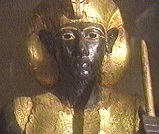
-760 The fifth Olympiad. Archelaus dies, and his son Teleclus (Teleklos) (d. -740) becomes Agiad king #8 of Sparta, going on to subdue the towns of Amyclae, Pharis, and Geranthrae. Alara the Nubian dies, and (his brother?) Kashta the Kushite (d. -752) conquers Egypt, becoming king #1 of the Egyptian Twenty-Fifth (25th) Dynasty (ends -656), ruling from Napata (250 mi. N of Khartoum) in Nubia (modern-day Sudan), installing his daughter Amenirdis I as the successor of Orsonkon III's daughter Shepenupet I, divine wife of Amun in Thebes. Greek cities begin founding colonies along the Mediterranean and Black Sea coasts. Ab'amar Saqid founds the Kingdom of Nashan in S Arabia (Yemen) (ends -480).
-759 Takelot III dies, and his younger brother (son of Osorkon III) Rudamun ((Usermaatre-Setpenamun) (d. -755) becomes king #8 (last) of the Egyptian 23rd Dynasty.
-757 The coastal town of Cumae in Campagnia in S Italy (NW of Neapolis or Naples) is founded in Oscan territory by Greek colonists from Pithecusae, Chalcis and Eretria, and Cyme, becoming the first colony in Magna Graecia (Greater Greece); Lake Avernus nearby is the fabled entrance to the underworld, and near the shore are caves which become the seat of an acropolis which is the seat of the ageless Cumaean Sibyl (Gr. "prophetess"), who gives out golden boughs to those wishing to go to the underworld; "The Sibyl, with frenzied mouth uttering things not to be laughed at, unadorned and unperfumed, yet reaches to a thousand years with her voice by aid of the god" (Heraclitus).
-756 The Sixth Olympiad; the Delphic Oracle is consulted as to how to crown the victors, and their reply is "Do not make the fruit of the apple tree the prize of victory, but take the wild olive", causing the winner of the foot race to be crowned with an olive branch. The city of Trabezon (originally Trapezous) (Gr. "trapeza" = table") (modern-day Trabzon, pop. 768K) on the SE shore of the Black Sea is founded by Milesian traders as a trading colony along with Sinope (modern-day Sinop, pop. 36K) on the C shore, Cyzicus on the SW shore, and Abydos in the Hellespont, trading with the Greek Mossynoeci (Gr. "Mossynoikoi" = dwellers in wooden towers); in 258 C.E. the Goths sack and rebuild Trabezon.
-755 Ashur-Dan III dies, and his brother Ashur-Nirari V (d. -745) becomes king of Assyria.
-754 Nimlot (d. -725) founds the Hermopolis Dynasty in Hermopolis (Magna), Egypt. Aeschylos dies, and Alcmeon (d. -753) becomes king of Athens.

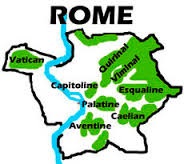
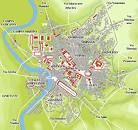
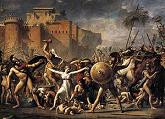
-753 Every people has a founding myth, a frame for their identity, which lets them restart the calendar with year one, and contains within itself the seeds of their ultimate destruction? The Romans claim to come from Long and White, and must be bragging? On Apr. 21 the city of Rome (Roma) (modern-day pop. 2.9M/4.36M), is traditionally founded by twins (fraternal or identical?) Romulus (-771 to -717) and Remus (-771 to -753), born in nearby Alba Longa (12 mi. to the SE in the Alban Hills on the W crater rim of Lake Albano) of the god Mars and mother Rhea (Rea) Silvia (Ilia), a vestal virgin who is the daughter of King Numitor of Alba Longa, and a descendant of Aeneas (Gr. "he who is praised") (the very title later adopted by Muhammad?), leader of the Trojans and son of Anchises and Venus, who escapes from Troy and wanders for years before coming to Latium, and whose son Ascanius or Iulus is the founder and 1st king of Alba Longa, keeper of the Palladium or image of Pallas Athena stolen from Troy by Ulysses and Diomedes, which ends up in the Roman temple of Vesta; at birth they are kidnapped by order of the jealous Numitor, then deposited on the banks of the Tiber (in a basket like Moses?) to die, but rescued and raised by she-wolf Lupa (sucking wolf tit and drinking wolf milk, to make them into predators?), who suckles them in the Lupercal(e) (Lat. "she-wolf"), a cave on the SW foot of the Palatine Hill (uncovered in 2007 C.E.); they are later raised by shepherd Faustulus and his wife Acca Larentia (Larentina), until they grow up and return to kill the king, then recruit Latin colonists from Alba Longa for their new digs, originally called Saturnia after Saturn, "father of the gods", then Rome, City of the Seven Hills, home of the united cities of Latium (named after the god Lateinos (Chaldean "to lie hidden"), their version of Saturn, offspring of the Sun, represented with a ring or halo around his head, and known as the Hidden God, the God of Mystery, with both Saturn and Lateinos having the Number of the Beast 666, hence the pope also?), on the left (E) bank of the Tiber River 17 mi. inland from the Tyrrhenian Sea near malarial swamps where the river makes two sharp bends in a reverse S-shape; the Seven Hills of Rome (Poor Queer, er, Queen Vicky Eats Crow At Christmas?) are: Palatine Hill (C) (centermost) (140 ft. above the Tiber E of the S bend) (home of the aristocrats) (first to be settled); Quirinal Hill (NE) (named after Sabine war god Quirinus); Viminal Hill (NE) (finger-shaped land pointing toward C Rome between the Quirinal Hill to the NE and Esquiline Hall to the SE); (located between the Forum and the Campus Martius); Esquiline Hill (E) (N part of the Oppian Hill); Capitoline Hill (named after the Temple of Jupiter Optimus Maximus) (original name: Mons Saturnius) (W) (; Aventine Hill (SW) (home of the plebs or plebeians, consisting of two small peaks and a gully); Caelian Hill (SE); later the Pincian Hill (NE) (N of the Quirinal) and the Janiculum Hill (W) (on the right bank of the Tiber opposite the N bend) are inhabited with overflow pop.; the area between the Capitoline and Palatine Hills is a marshy valley, which is drained by -500 and turned into a marketplace (the Forum); actually, the legendary founding is moose hockey, and communities existed on the Palatine, Capitoline and Esquiline Hills by -1000, and the city was really formed by the Etruscans after they conquered Latium around -600 and forced the independent communities under their yoke?; the Circus Maximus is later built between the Palatine and Aventine Hills (with the cheap seats on the Aventine side?); the Tarpeian Rock is on the S side of the Capitoline Hill, and used for executing traitors by throwing them off the top; the Campus Martius (Lat. "Mars Field") parade ground W of the Quirinal and Capitoline Hills, E of the N bend of the Tiber River is the first expansion area for overflow pop. before bridges are built across the Tiber and a fort built on the Janiculum Hill for future expansion; the city is open for 1K years until the Aurelian Wall is built c. 270 C.E., encircling all the hills and connecting with the Tiber to the N and S; Romans begin counting time up from this date, or rather, counting down from this date, after Romulus and Remus attempt to conjure a vision from the gods, and Romulus conjures twelve fowls circling over the hills, while Remus is short-changed, only conjures six and fouls out, and the augur Vettius proclaims that Romulus will be king, after which Romulus marks the square sacred boundary of Rome on the Palatine Hill above the E shore of the River Tiber, known as the Roma Quadrata with the sacred bronze plow on the feast day (Parilia or Palilia) (Apr. 21) of the herd-flock god Pales (the hermaphrodite ass-god of ancient Caanan, for whom Palestine is named, as well as the Palatine Hill), then orders a ditch dug and sacred wall (pomerium) built around it, which jealous Remus jumps over, causing Romulus to kill him for sacrilege, becoming Rome's first king (which is why it's called Rome instead of Reme?); Vettius claims that the vision means that the fowls are eagles, indicating that Rome will kick everybody's butt and the city will thrive for twelve cents., but then the eagles will turn into vultures, indicating that Rome will fall and the inhabitants will become bird food (proof that paganism is true, or just a self-fulfilling prophecy, or a deep psychological meaning about killing one's good side so the bad side can run riot, becoming fatal in the end?) (if only he'd said twelve millennia?); when Jesus Christ is later portrayed as entering Jerusalem triumphantly on an ass, you figure it out?; speaking of bad side, Romulus rules for 37 years, waging war with the Sabines under Titus Tatius (d. -748) of Cures (on the left bank of the Tiber River 26 mi. from Rome), starting it by arranging for the mass-kidnapping and Rape of the Sabine Women in C Italy, which causes Tatius to capture Rome with help from Tarpeia, daughter of the cmdr. of the Roman citadel, who opens the gates on the promise that she will receive what the Sabines have on their left arms, which turns out to be their shields, after which they throw her from the Tarpeian Rock (which becomes the mode of execution of all capital punishment), after which the Sabine women (led by Romulus' wife Hersilia, daughter of Tatius) convince Tatius and Romulus to reconcile and rule Rome jointly, with the combined community called the Quirites; in modern times the historicity of Romulus is questioned, with German historian Theodor Mommsen uttering the soundbyte in 1854: "The founding of a city in the strict sense, such as the legend assumes, is of course to be reckoned altogether out of the question: Rome was not built in a day"; in 1900 Giacomo Boni (1859-1925) claims to find the tomb of Romulus; in 2007 U. of Rome prof. Count Andrea Carandini (1937-) uncovers evidence of the sacred wall plus Romulus' palace?; the next six kings are Numa Pompilius (-715 to -676), Tullus Hostilius (-673 to -641), Ancus Marcius (-640 to -617), Lucius Tarquinius Priscus (-616 to -578), Servius Tullius (-578 to -534), and Lucius Tarquinius Superbus (-534 to -510), the last three being Etruscans; the govt. is based on three tribes, the Ramnes, Tities and Luceres (Latins, Sabines and Etruscans?), with the pop. split into the patricians (large landowners) and the plebs (plebeians) (clines) (Lat. "fillers") (small landowners); only the patricians constitute the populus (citizens), and have political rights and can serve in the army; the govt. is run by elective king and a small royal council of elders (senate), plus a 100-man assembly of elders (patres) composed of 10 curiae (assemblies) for each tribe, each elder serving for for life and having to be a patrician; the rex leads the army in person, and is preceded by lictors (officers), who bear the fasces, the symbols of power and punishment, and is the supreme judge in all civil and criminal suits; Roman citizenship requires membership in a gens (Lat. "to beget"), i.e., a clan traceable through the male line to a common free ancestor without any slaves in the middle; at first only patricians can use the "gentile" name as the middle of their three names, but later the plebes are permitted; Romulus later worships in the small temple of Jupiter Feretrius ("Jupiter who carries away the spoils of war") on the Capitoline Hill; the crude round hut called the House of Romulus on the central Palatine Hill stands for the next eight cents. - when do they install the mechanical bulls? Alcmeon dies, and Haropas (d. -743) becomes king of Athens. Jeroboam II dies, and his son Zechariah (d. -752) (Heb. "Remembered by Jehovah") becomes king #16 of Israel for 6 mo. (until -752) when his army capt. Shallum (d. -743) (Heb. "retribution") "conspired against Zechariah, and smote him before the people, and slew him, and reigned in his stead" (2 Kings 15:10), ending the dynasty of Jehu after four generations, becoming king #17 of Israel for 1 mo. until pissed-off fellow army capt. Menachem (Menahem) Ben Gadi (d. -738) (Heb. "comforter, consoler") marches from Tirzah 6 mi. E to Samaria, sieges it, and murders Shallum and becomes king #18 of Israel for 10 years (2 Kings 15:14-22), becoming known for drunkenness and debauchery, brutually suppressing a revolt at Tiphsah and destroying the city and killing the pop. after ripping open the wombs of pregnant women, "departing not from the sins of Jeroboam". The Old Guo Kingdom is reestablished in China.
-752 The seventh Olympiad.
-751 Carthage is founded in this year?

-750 Esh-Baal (Itto-Baal) II (d. -739) becomes king of Tyre (until -739). The Greek Dark Ages (begun -1150) end, and the Greek Archaic Period begins (ends -480); having lost their knowledge of the surrounding seas, the Ionian Greeks begin exploring and colonizing Asia Minor and founding cities in Pontus (isolated rocky S coast of the Black Sea); by -650 abstract geometric patterning is replaced by naturalistic art, incl. nude dangly Kouroi (Gr. "male youth") statues. Charillus dies, and Nicander (d. -720) becomes Eurypontid king of Sparta. King Azariah (Uzziah) of Judah is struck with leprosy; his son Jotham (Yotam) (d. -735) (Heb. "Jehovah is honest") (son of mother Jerusha) becomes coregent in Judah; the Israelites recapture the city of Dan - was it steely? The beginnings of the Sicilian Mafia as a gaggle of pirates? The city of Zancle ("sickle-city"), (modern-day Messina) on the NE end of Sicily on the W shore of the Strait of Messina (Mamertinum Fretum) (Fretum Siculum) is founded by pirates from Cumae. In this half-cent. the widespread use of iron in the Persian region begins. About this time rhinoplasty (the art of nose jobs) is first mentioned. Births: Greek "The Iliad and The Odyssey" poet (blind) Homer (d. -700) (b. 1100 B.C.E.?) (b. 850 B.C.E.?) in Chios.
-748 The eighth Olympiad. Nabu-Shuma-Ishkin dies, and Nabonassar (Nabu-Nasir) (Nabonasser) (Nebo-adon-Assur) (Nabo-n-assar) (d. -733) becomes king of Babylon next Feb. 26; a more accurate astronomy-based dating system is instituted in his reign. Titus Tatius (b. ?) is killed for revenge by the citizens of Lavinium, leaving Romulus as sole ruler of Rome.
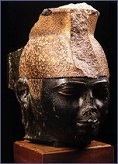
-747 Kashta of Kush (Nubia) dies, and his Amun-worshipping black African son Pi'ankhy (Piankhy) (Piye) (Peye) (d. -715) becomes ruler of Kush, going on to save Egypt from itself by invading it.

-745 Ashur-Nirari V is murdered by Tiglath-Pileser III (Tukulti-Apil-Esharra) (Pul) (d. -727), who founds the Second Assyrian Empire, and invades Phoenicia; he believes that his god gave him permission to ethnically-cleanse whole lands for settlement by his people, and is responsible for the Assyrian program of mass deportations, adding up to 4.5M in 3 cents.
-744 The ninth Olympiad - still possible to afford good seats? The Assyrians displace 65K people in Iran.
-743 Haropas dies, and Aesimides (d. -733) becomes king of Athens. Tiglath-Pileser III defeats the Urartians and wins back N Syria. The First Messenian War between Sparta and Messenia (W of Laconia) begins (ends -724), with the Achaeans of Messenia and Dorians of Sparta fighting it out to the bitter end.
-742 Assyria annexes Phoenicia and the Syrian coast; 30K Syrians of Hama are sent to the Zagros Mts.; 18K Arameans from the left bank of the Tigris are moved to N Syria. Israeli king Menahem pays tribute to Tiglath-Pileser III. About this year Hosea of Israel writes The Book of Hosea, becoming the first of the 12 minor prophets, and harping on about the apostasy of the people, who turn away from Jehovah to worship the calves of Jeroboam (1 Ki. 12:26-30, Hosea 8:4-6) and Baal.
-741 Assyria conquers Arpad.
-740 The 10th Olympiad. Teleclus is KIA by the Messenians in the temple of Artemis Limnatis on the border after he brings some young men dressed as maidens to their festival to murder the Messenian nobles, and they figure it out; his son Alacamenes (Alcmenes) (Alkamenos) (d. -700) becomes Agiad king #9 of Sparta, going on to conquer Helos near the mouth of the Eurotas River, last independent town of the original Achaean pop. (origin of the term "Helot"), and lead the night expedition against Ampheia that started the First Messenian War. Samsi (Shamshi) (d. -720) becomes queen of the Midianites (until -720). Leprous king Uzziah (Azariah) dies, and his 25-y.-o. son Jotham (Yotam) (d. -731) (Heb. "Jehovah is honest") (son of Jerusha the daughter of Zadok), who had been administering the affairs of the king's house and judging the people becomes king #11 of Judah (until -735), beginning construction of the Wall of Ophel; in this year prophet Isaiah (Heb. "Yeshayahu" = salvation of Jehovah), son of Amoz has a vision giving him a commission to preach to the people of Judah and Jerusalem, but warning him that the nation will come to ruin, and only a "tenth", a "holy seed" would be left (Is. 6:1-13); in 2019 Israeli archeologist Eliat Mazar discovers a clay bulla at the base of the S wall of the Temple Mount in Jerusalem bearing Isaiah's name, and another clay bulla in 2015 10 ft. away bearing the seal of King Hezekiah.
-739 Esh-Baal II dies, and Hiram II (d. -730) becomes king of Tyre (until -730). The Sino-Tibetan language-speaking Karen People of Mongolia settle in Burma.
-738 Hiram II of Phoenicia pays tribute to Tiglath-Pileser III. Menachem dies, and his son Pekahiah (d. -737) (Heb. "Jehovah has opened his eyes") becomes king #19 of Israel (2nd and last from the house of Gadi), continuing the sins of Jeroboam (idolatrous calf worship) that Jehovah doesn't like for two years; Assyrian king Tiglath-Pileser II invades Israel and forces it to pay tribute. Romulus establishes the Roman calendar based on the Greek lunar calendar; later king Numa Pompilius adds Jan. at the beginning and Feb. at the end to create a 12-mo. year (until -452). The Iron Age fortified settlement of Biskupin on Lake Biskupin 56 mi. NE of Poznan, Poland is built.
-737 Pekahiah is murdered by his general (adjutant) Pekah (d. -732) (Heb. "open-eyed") (son of Remaliah) and 50 men of Gilead, and Pekah becomes the 20th and penultimate king of the 10-tribe kingdom of Israel (2 Ki. 15:25-27), going on to reign for 20 years while continuing the idolatrous calf worship (2 Ki. 15:28); Pekah allies with Aram-Damascus king (since -754) Rezin (d. -732) to attack king (since -745) Tiglath-Pileser III (d. -727) of Assyria, trying to coerce King Ahaz of Judah to join, causing him to appeal to Tiglath-Pileser III - two decades of frightful fashion and big hair?
-736 The 11th Olympiad. A shipwrecked Greek nautilus (sailor) named Teocle washes up in Sicily at Taormina and founds a colony there.
-735 Jotham is deposed by a pro-Assyrian faction in favor of his 20-y.-o. (25-y.-o.) son Ahaz (d. -715) (Jehoahaz) (Heb. "Jehovah has grabbed hold") becomes king #12 (co-regent until -732?) of Judah, becoming known for misrule and apostasy (2 Chron. chs. 27, 28). The Assyrians attack Urartu, annex the Lake Urmia region, and unsuccessfully siege Tushpa. Sarduri II dies, and his son Rusa (Rusas) I (d. -713) becomes king #8 of Urartu, going on to lose most of his daddy's conquered lands to Tiglath-Pileser III of Assyria. Naxos, the first Greek colony in Sicily is founded by Thucles of Chalcis; the Greeks begin driving the Phoenicians out of Sicily, except for the west coast cities of Motya, Panormus, and Solus.
-734 After King Ahaz of Judah calls on Assyria for help in its war with Israel and Damascus, Assyrian king Tiglath-Pileser III captures Damascus and executes King Reza before deporting the pop. to Kir and annexing the Aramean Kingdom (founded -1000) (2 Kings 16:9), dividing it into six provinces centered around Damascus; Assyria imposes an embargo on the export of timber from Tyre and Sidon to Philistia and Egypt; Palestine and trans-Jordania are crushed; the prince of Ascalon is killed, and the men of Gaza and the other of the so-called Five Strong Cities of Philistia flee to Egypt "like a bird"; Tiglath-Pileser III conquers The Galilee,and the land of Naphtali on the E side incl. Ijon, Hazor, Kedesh, Gilead, Abel Beth Maacah (Abel Maim), and Janoah, deporting most of the pop. to Assyria, then attacks Israel, annexing all teritory N of Jezreel (half of Israel); the Jews are exiled from Perea (E of the Jordan River); the kings of Edom and Judah pay tribute. The city-state of Syracuse in SE Sicily is founded by the Bacchiadae clan oligarchy of the Corinthian (Anatolian) Greeks led by Archias, going on to become the #1 city in Sicily; they found another colony on the island of Korkyra (Corcyra) (modern-day Corfu) in NW Greece.
-733 Nabonassar dies, and his son Nabu-Nadin-Zeri (d. -732) becomes king of Babylon. Aesimides dies, and Klidikos (d. -723) becomes king of Athens.
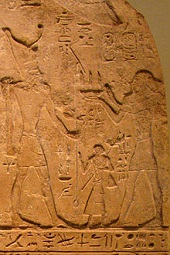
-732 The 12th Olympiad. Shepsesre Tefnakht (Tnephachthos) I (d. -725) becomes king #1 of the Twenty-Fourth (XXIV) (24th) Egyptian Dynasty (ends -720), calling himself "great chief of the west"; his descendants rule Egypt from Sais in the W Nile delta for the next 139 years (until -588). Jotham dies, and his son Ahaz (Jehoahaz I) (d. -716) (Heb. "Jehovah has held") becomes king #12 of Judah, reigning for 16 years. After pissing him off by attempting to coerce King Ahaz of Judah to take action against Assyria in league with King Rezin of Damascus, Israeli King Pekah is murdered by pro-Assyrian party head Hoshea (Heb. "salvation") (son of Elah), who becomes king #21 (last) of the 10-tribe kingdom of Israel based in Samaria (until -721) after paying Assyrian king Tiglath-Pileser III (Pul) 10 talents of gold and 1K talents of silver as tribute; an 8-year interregnum begins (2 Ki. chs. 14-15, 2 Chron. ch. 26)?; too bad, when Tiglath-Pileser III dies in -727, Hoshea conspires with Egypt to rebel, causing his successor Shalmaneser V to invade; meanwhile Judah calls on Assyria for help in its war with Israel and Aram-Damascus, and Tiglath-Pileser III conquers the Galilee and exiles many of its inhabitants, going on to capture Aram-Damascus and transport its pop. to their original homeland Kir, dividing the Aramean kingdom (founded -1000) into six provinces centered around Damascus, and annexing one-half of Israel; the Jews are exiled from Perea (E of the Jordan River). Nabu-Nadin-Zeri is killed in a revolt, and Nabu-Shuma-Ukin II becomes king of Babylon for 1 mo.; Isaiah writes the Book of Isaiah about this time?
-731 Nabu-Shuma-Ukin II is overthrown by Aramean chief Nabu-Mukin-Zeri (d. -729), and becomes king of Babylon, founding the Ninth Babylonian Dynasty (ends -626). Ex-king Joatham of Judah dies, and is buried in the city of David.


Nubian king Pi'ankhy captures Thebes, becoming king #2 of the Egyptian 25th (Kushite) Dynasty, "Lord of the Two Lands", the first black pharaoh; too bad, after taking up an offer from delta warlord Tefnahkt, he takes their best bling and horses and returns to Nubia permanently, after which he is buried in an Egyptian-style pyramid in Napata in modern-day Sudan, becoming the first entombed pharaoh in 500+ years. Iny dies, and Osorkon IV (d. -715) becomes king of the rival Egyptian dynasty. Hiram II dies, and Mattan II (d. -729) becomes king of Tyre (until -729). Colonists from Eretria settle at Mende in the Chalcidice in NE Greece, and Methone and Dicaea in Macedonia. The Hallstatt Iron Age Culture, characterized by iron and bronze swords with winged metal terminals and horse domestication evolves from the Urnfield Culture, and begins spreading from Austria to France, Belgium, Netherlands, Iberia, and Ireland, launching the Iron Age in Europe (until -400), speaking a proto-Celtic language that becomes the ancestor of all later Celtic languages, branching into separate Celtiberian, Goidelic, and Byrthonic tongues; named from a necropolis containing 2K graves in Hallstatt in Upper Austria, excavated in 1846-99. A Greek inscription from about this time is found in Pithecusae in the Bay of Naples. Deaths: Spartan lawgiver Lycurgus (b. -700).
-729 Tiglath-Pileser III conquers Babylon, kills Nabu-Mukin-Zeri and becomes king of Babylon, annexing it as a province of Assyria; the Chaldeans maintain independence in the S. Mattan II dies, and Eluli (Luli) (Elulaios) (d. -694) becomes king of Tyre (until -694). Leontini (Lentini) (Leontinoi) in SE Sicily is founded as a Naxian colony by Thucles; other Naxians under Evarchus found Catana.
-728 The 13th Olympiad. The Megarians give up trying to colonize Trotilon and Thapsos in Sicily, and instead colonize Megara Hyblaea, 14 mi. N of Syracuse. Ahaz appoints his son Hezekiah (d. -686) (Heb. "Jehovah strengthens") coregent of Judah, who seeks unification with the kingless northern kingdom of Israel, inviting them to an ecumenical Passover (2 Chron. 30:1).
-727 Tiglath-Pileser III dies after receiving 30K camels as tribute from Midianite queen Samsi.
-726 Tiglath-Pileser III's son Shalmaneser V (Shulanu-Asharedu) (d. -722) becomes king of Assyria, and assumes the name Ululaju when a scending the throne of Babylon.

-725 Midas (d. -675) becomes king of Phrygia, and bathes in the Pactolus River, making its sands an eternal hope for gold diggers?; he gets the Midas Touch from Bacchus, but after it works out bad he switches to the worship of Pan. Tefnakhte I dies, and Bakenranef (Bocchoris) (d. -720) becomes king #2 (last) of the Egyptian 24th Dynasty based in Sais. Nimlot dies, and Thutemhat (d. -710) becomes king of Hermopolis. Births: Chinese PM (-685) Guan Zhong (Yiwu) (d. -645).
-724 The 14th Olympiad. Sparta defeats Messenia, ending the First Messenian War (begun -743), and divides it into allotments (klaroi) that pay rent to finance their army, with Messenian depopulated by the emigration of Achaeans to other states, and the remaining Messenians reduced to serfs (helots).
-723 Klidikos dies, and Ippomenes (d. -713) becomes king of Athens.

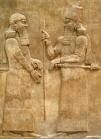
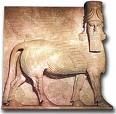
-722 In the 6th year of King Ahaz of Judah (2 Ki. 18:10), after a 3-year siege Samaria is conquered (2 Ki. ch. 17) by the Assyrians under king (since -727) Shalmaneser V, who is assassinated, allowing his successor Sargon II (Sharru-Kin) (-763 to -705) ("legitimate king", "god made firm the king") to claim credit after the Assyrian army withdraws to secure his succession, Israel revolts again, and he returns to finish them off in -720 -baby back ribs tonight? Sometime in his reign, Sargon II receives tribute from S Arabian king Ita'amra the Sabaean. The Chun Qiu (Ch'un-Ch'iu) (Chin. "spring and autumn") chronological record is started in China, recording events of the reigns of 12 rulers of Lu till just before Confucius' death in -479.
-721 On Mar. 19 the Babylonians record their first lunar eclipse. Piye dies, and Kashta's son (by Pebatjma) (Piye's son?) Neferkare Shabaka (Shabako) (Shabaqo) (d. -707) becomes king #3 of the Egyptian 25th Dynasty, going on to consolidate control of Egypt down to the Nile Delta, making Thebes his capital and initiating an enormous amount of construction while fending off the Assyrians under Sargon II; he leaves the Shabaka Stone, an attempt to preserve Old Kingdom history, which is later used as a millstone, defacing the hieroglyphics. Sargon II annexes Israel. The Chaldeans enter Babylonia and begin competing for the throne with the help of Elam; Marduk-Apal-Iddina II (Merodach-Baladan) (d. -710) becomes king of Babylon.
-720 The 15th Olympiad features the addition of a 2.5 mi. (12X around the stadium) race. Pharaoh Shabaka captures Bakenranef, and has his bacon fried (burned alive), ending the Egyptian 24th Dynasty (begun -732); Shabaka reuinites Egypt. Assyrian king Sargon II reconquers Samaria after another revolt; the 27,290 members of the Lost Ten Tribes of Israel, incl. King Hoshea are carried away like foam upon the water to Harran; the depopulated land is slowly settled by Aramaic-speaking Assyrians, and the Samaritan Religion is born; Jerusalem is strengthened with a great influx of refugees; after the time of Nehemiah, the Hebrew language dies out, and Aramaic, the language of the Aramean internat. land traders becomes the universal language of the civilized Western world by the time of Darius I the Great; of the original Twelve Tribes, only the depleted 2-tribe (Judah and Benjamin) S kingdom of Judah is left (along with some Levites, the landless priest-class 13th tribe), and Judah only has seven more kings to go before their royal line is kaput (Manasseh, Amon, Josiah, Jehoahaz, Jehoiakim, Jehoiachin, Zedekiah); later speculators trace the lost tribes to the British Isles, North Am., South Am., India (the Manashe Tribe in Manipur and Mizoram in E India), Abyssinia, Afghanistan, China, Japan, Africa, and Uzbekistan and Tajikistan; the proof that the Tribe of Dan migrated W is their naming of the Danube, Dnieper, and Denmark?; in the 18th cent. the Anglo-Israelite Theory, that they are the ancestors of the Anglo-Saxon peoples makes it easier for Jews to immigrate; did they go to Japan, as indicated by similar ceremonies?; some Scots claim that they are the lost tribes, and that the Stone of Scone (pr. SKOON) is really the Beth-El (Jacob's Pillow) in Genesis; the Book of Mormon claims that they migrate to North Am., quoting Bible prophet Isaiah (Heb. "Jehovah is salvation"); "From the isles of the sea, from those parts beyond the sea into which they were carried captive" (Is. 24:24) (maybe to the British Isles?). Sargon II marches on Babylon, but is defeated at the Battle of Der by the Elamites under Humbanigash. The Syrians under king Ilu-Bi'di (Yau-bi'di) of Hama (Hamath) rebel against Assyria, are defeated at the Battle of Qarqar, and Ilu-B'idi is flayed - tourniquet, tourniquet! X-ray comin' on thru? Nicander dies, and Theopompus (d. -675) becomes Eurypontid king of Sparta. Shepsesre Tefnakht dies, and Bakenranef (Bocchoris) (d. -715) becomes king of the Egyptian 24th Dynasty. Zhou Ping Wang dies, and Zhou Huan Wang (d. -697) becomes Dong Zhou king #2 of China. Settlers from Chalcis settle Rhegium in S Italy across the Strait of Messina from Sicily. Settlers from Achaea and Troezen found the colony of Sybaris on the W shore of the Gulf of Taranto between the Crathis (Crati) and Sybaris (Coscile) Rivers in S Italy (Magna Graecia), which becomes known for opulence and conspicuous (sybaritic?) consumption, becoming the oldest Greek colony in Italy (until -510).
-719 King Rusa I of Urartu replaces Mannean rulers friendly to Assyria with his own rulers.
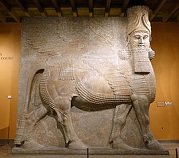

-717 Carchemish (Karchemish), the last independent Hittite kingdom is conquered by Sargon II and annexed to Assyria. Architecture: Sargon II begins his royal residence of Dur-Sharrukin (modern-day Khorsabad), a planned city in modern-day N Iraq (9 mi. NE of Mosul) (finished in -704), which becomes capital #4 of Assyria; excavated in 1843 by Paul-Emile (Paul-…mile) Botta (1802-70) of France; the entrance to Sargon II's palace throne room features a pair of reliefs of a 16-ft.-high Winged Bull that combines features of a man (head), eagle (wings) and lion (tail); it ends up in the Oriental Inst. of the U. of Chicago. Deaths: Roman king #1 (-753 to -717) Romulus (b. -771) on July 5; slain by the Senate, or carried away to live with the gods, with instructions to worship him as the god Quirinus, causing the Quirinal Hill to be built in his honor?; his tomb is built in the 4th cent. B.C.E.
-716 The 16th Olympiad. Ahaz dies, and although he is buried in the city of David (Jerusalem) (2 Ki. 16:20), his body is not placed at the royal burial place of the kings (2 Chron. 28:27); his 25-y.-o. son Hezekiah (Hizkiyahu) (r. -715 to -686) (Heb. "strengthened by Jehovah") becomes king #13 of Judah ("the finest" - 2 Ki. 18:5), and reverses his father's idolatrous policies, "sticking to Jehovah" (2 Chron. 29:1), and compiling the Proverbs of Solomon (Prov. 25:1).

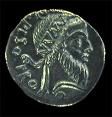
-715 Pi'anky dies, and Shabako (d. -702) becomes king #2 of Egypt's 25th (Kushite) Dynasty, conquering Egypt from the 6th Cataract to the Mediterranean. Sargon II of Assyria declares war on his old enemies the Urartians, going after their ally Mettati first. Median chieftain Deioces (Deiokes) (Dahyauka) (Daiaukku) (Diyako) (d. -647) founds the Median Dynasty after uniting the warring petty kingdoms. Traditional date that is succeeded by Sabine Numa Pompilius (d. -676), youngest of the four sons of Pomponius (born on the day of Rome's founding) as king #2 of Rome, who introduces many Roman religious customs. An inscription of Sargon II mentions Mita of Mushku, who might be King Midas of the gold touch?
-714 The Assyrians under Sargon II launch a carefully planned attack against Urartu after King Rusa I stirs up a revolt among the Manneans.
-713 After their sacred city of Musasir (Musri) S of Lake Van is conquered, Rusa I commits suicide, and his son Argishti II (d. -680) becomes king #9 of Urartu (until -680). Ippomenes dies, and Leokrates (d. -703) becomes king of Athens. A revolt in the Zagros Mts. is put down by the Assyrians.

-712 The 17th Olympiad. The Neo-Hittite kingdoms of the Taurus incl. Cilicia are annexed to Assyria. A revolt against Assyria instigated by Egypt, led by King Iamanni of Ashdod followed by Judah, Edom, and Moab and Pi'ru of Musu is crushed; Pharaoh Shabaka gives asylum to Ashdod king Iamanni. Births: Greek poet Terpander (d. -645) in Antissa, Lesbos.
-711 Births: Japanese Yamato emperor #1 (-660 to -585) Jimmu (Jinmu) (d. -585) on Jan. 1.
-710 Sargon II invades Babylon, pushing the Babylonians south; Marduk-Apal-Iddina II escapes to the Elamites. About this time the Lelantine War by Chalcis, supported by Corinth, Samos, and Thessaly against Eretria, supported by Aegina, Miletus, and Megara is fought over the rich Lelantine Plains (Lelantian Fields) in E Attica, and Chalcis and its allies are victorious (ends -650) - now get out there and plant? The capital city of Ecbatana (Hamadan) is founded by Deioces, first king of the Medes in the mountainous E fringes of Babylonia between the Elburz and Zagros Mts. Chalcis colonizes Torone in the Chalcidice in NE Greece, and goes on to found 30 small colonies on the peninsula.
-709 Phrygia in Asia Minor becomes a tributary to Assyria.

-708 The 18th Olympiad adds the pentathlon to the short list of events. Babylon falls to Assyria, and now the known world pays homage to Assyria the Great? The city of Croton (Crotona) in S Italy in the sole of Italy's boot on the E coast of Bruttium (Calabria) on the Gulf of Taranto is founded as a Greek colony, becoming the leading city of Magna Graecia, known for its healthy climate and great athletes, later building the Temple of Hera Lacinia, which becomes the main religious shrine of Magna Graecia; by modern times it is reduced to a single column.
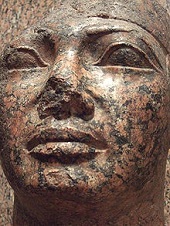
-707 Shabaka dies, and his nephew (son of Piye) Shebtiku (Shebataka) (Shebitqo) (Djekare) ("Enduring is the soul of Ra") (d. -690) becomes king #4 of the Egyptian 25th Dynasty, going on to pursue a policy of conciliation with Assyria, extraditing king Iamanni of Ashdod, etc., until the reign of Sennacherib, when he flops and begins resisting Assyrian expansion. The Cimmerians defeat the Urartians under Argishti II, but they keep the Assyrians at bay and build a number of new fortresses and irrigation works.
-706 The city of Tarentum (Taras) (modern-day Taranto in S Italy) is founded by Parthenian (children of Greek women and Spartan men) colonists led by Phalanthus, becoming Sparta's only colony?
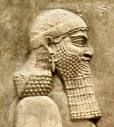
-705 Sargon II is KIA in battle, and his son Sennacherib (Sin-Ahhe-Eriba) (d. -681) (Akkadian "the Moon god") becomes king of Assyria, dissociating himself from what he thinks of as his loser father, and abandoning his father's newly-built capital in order to move to Nineveh, which he turns into a magnificent city, with a royal palace of 80 rooms built on a foundation of 160M bricks, and featuring bas-relief stone panels of winged lions or bulls with a man's head, along with grisly scenes of cruel treatments of POWs incl. impalings. Hezekiah of Judah quits paying tribute to Assyria, and starts fortifying Jerusalem (2 Ki. 18:7, 20:12, 2 Chron. 32:5).
-704 The 19th Olympiad.
-703 Marduk-Zakir-Shumi II becomes king of Babylon for 1 mo. before Marduk-Apal-Iddina II reenters and reclaims the throne for 9 mo.; the Assyrians drive him back into exile in Elam, and 208K people are deported to Assyria. Leokrates dies, and Apsandros (d. -693) becomes king of Athens. Architecture: Sennacherib begins building the Jerwan Aqueduct to bring water from the Khenis River to Nineveh (finished -690), becoming the world's first aqueduct; the real Hanging Gardens of Babylon?

-702 Bel-Ibni is appointed gov. of Babylon by Sennacherib.
-701 Sennacherib makes the Medes a tributary (until -674). A revolt by Sidon-Tyre, Escalon, Judah, and Ekron supported by Egyptian Pharaoh Shebtiku causes the Assyrians to attack; Sennacherib defeats the Egyptians at the Battle of Eltekeh in S Palestine, then invades and conquers Phoenicia-Palestine to reinstate his ally Padi of Ekron; king Eluli of Tyre flees to Cyprus, and Sennacherib appoints Baal (Baalu) I (d. -660) as king of Tyre (until -660), then sieges and conquers the Israelite city of Lachish between Mt. Hebron and the maritime plain of Philistia (Johsua 10:3-5, 12:11), causing Sennacherib to order reliefs installed in his royal palace in Nineveh, showing an Israelite chariot, with the soundbyte: "Sennacherib, king of the world, king of Assyria sat upon a throne and passed in review the booty from Lachish"; King Lule of Sidon flees to Cyprus; King Sidka of Ascalon is captured and sent to Assyria; about this time he defeats Arab tribal queen Iati'e (Yatie).


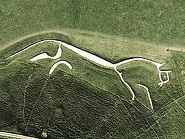
-700 The 20th Olympiad. Marduk-Apal-Iddina revolts again, and Sennacherib chases him back to Elam; Bel-Ibni is suspected of collusion and recalled to Assyria. The Assyrians under Sennacherib invade Judah, destroy many cities and siege Jerusalem after the Egyptians under Pharaoh Taharqa at Hezekiah's request stall their advance; the Assyrian gen. appeals to Jerusalem's pop. over King Hezekiah's head (Is. 36:4), and the Jewish officials plead with him not to speak in Hebrew, the language of (the) hoi poloi, but in Aramaic, the language of diplomacy understood by themselves (2 Ki. 18:26); the Assyrians claim a plague, and the Bible claims that it is Jehovah's angel slaying 185K of the cream of their warriors overnight (2 Ki. chs. 18-19, 32), but the Assyrians are turned back, yet only after making Hezekiah a vassal ("like a bird in a cage"), who has to pay a large tribute? Alacamenes dies, and Polydorus (Polydorus) (d. -665) becomes Agiad king #10 of Sparta, hooking up with co-king Theopompus to change the constitution so that the kings and the Gerousia (council of elders) can veto decisions of the Apella (male citizen body); during the First Messenian War he is in charge of the left flank, while Theopompus is in command of the right flank. Perdikkas (Perdiccas) I (d. -652) becomes king of Macedonia (until -678). Gemenef-Khons-Bak (d. -680) becomes king of Tanis. In this cent. Thessaly changes from a tetrarchy to a Thessalian League, a loose confederacy of feudal city-states in the Thessalian Valley led by a tagos (elected gen.) of the Aleuadae clan; throughout this cent. Thessaly possesses the strongest army in Greece, and dominates the Amphictyonic League (Amphictyony of Anthela), a religious league which by 600 B.C.E. incl. all the city-states of C Greece. In this cent. Persian chief Achaemenes (Hakhamanish) founds the Achaemenid Dynasty after winning independence from the Neo-Elamates; his son Teispes (Chishpish) (d. -640) takes the title of king of Anshan and allies with the Elamites against Sennacherib. In this cent. the Germanic Frisian (Frisii) tribe from the Baltic colonizes the coastal districts of the modern-day Dutch provinces of Friesland and Groningen. In this cent. the Priteni tribe of Celts arrives in the British Isles, becoming the ancestors of the Cruitin (Cruithin) (Cruthin) tribe in Ireland. In this cent. the Phoenicians found the city of Tripoli in N Africa, consisting of Oea, Lepcis Magna, and Hadrumetum; they also found Motya in Sicily, Sulcis, Caralis, Nora, and Tharros in Sardinia, and Mogador on an island on the W African coast 450 mi. S of Gibraltar; the Phoenician cities of Tyre, Sidon, and Byblos also found the port of Tripolis in Phoenicia 70 km. N of Beirut, each city controlling a walled sector. In this cent. the Greeks found the kingdom of Cyrenaica in E Libya (ends 4th cent. B.C.E.), dominated by the city of Cyrene (founded 630 B.C.E.). Early in this cent. the seasonable settlements for herdsmen on Rome's seven hills begin to move down to the E fringes of the marshy valley between the Capitoline, Palatine, and Quirinal Hills that later (before -500) is drained and becomes the Forum Romanum Magnum (Roman Forum) (Lat. "forum" = "out-of-doors place") marketplace. In this cent. the Arab Abdeel (Abdilla) and Nebaioth (Nebayot) tribes roam Palestine, while the Qedar tribe based in N Arabia founds a kingdom that by the 6th cent. B.C.E. controls the region from the Sinai to the Persian Gulf. In this cent. the royal garden of Ramat Rachel near Jerusalem is built and used until the 4th cent. B.C.E. About this time the Uffington White Horse is built in modern-day Uffington, Berkshire, England on the Berkshire Downs overlooking the Vale of the White Horse to the N. In this cent. the Greeks develop hoplite warfare, with each citizen-soldier furnishing his own hoplon (round bronze shield), bronze helmet with cheek and nose guards, and 9-ft. spear, fighting in a shoulder-to-shoulder phalanx while marching in step to flute music? - can you really help which peltast you fall in love with? The tradition of Halloween is developed about this time by the Druid Celts of the Westward Islands, who believe that Samhain, lord of the dead calls forth hosts of evil spirits, requiring them to light great fires and don frightening costumes to ward off and fool them; meanwhile dead shades revisit their homes, while seers have a window for examining portents. About this time tiny silver scrolls inscribed with portions of the Bible Book of Numbers are buried in Ketef Hinnom SW of Jerusalem; discovered in 1979, becoming the oldest known texts of the Bible. In this cent. Greek (Boeotian) poet Hesiod flourishes, becoming the greatest early Greek poet after Homer, writing Theogony (Genealogy of the Gods), which names the nine Muses as scroll-carrying history muse Clio, flute-carrying lyric poetry muse Euterpe, staff-carrying mask-and-ivy-wreath-wearing tragedy muse Melpomene, lyre-carrying song-dance muse Terpsichore, lyre-carrying erotic poetry muse Erato, veil-wearing sacred poetry muse Polyhymnia, celestial globe-carrying astronomy muse Urania, and wax tablet-and-stylus-carrying epic poetry muse Calliope; he also leaves Works and Days, describing Greek agriculture as based on the scarcity of resources requiring the depositing and lending of grain, providing "directions for the whole business of family economy in the country" (John Claudius Loudon); "Through work men grow rich in flocks and substance"; he also describes the ages as a cycle of decline, from golden to silver, bronze, and iron, claiming that the ages do not only change the quality of life, but the after-death state, with the people of the golden and silver ages becoming spirits when they die who watch over and benefit the human race, while the people of the bronze age go down to a twilight existence in Hades, and the "godlike race of hero-men" sail beyond the Pillars of Hercules to the Happy Isles (Hesperides) (Elysian Fields), ruled by Cronos (Saturn). Inscriptions in Georgia on two temple altars. In this cent. Greek poet Pisander flourishes, writing an epic poem on the Twelve Labors of Hercules (Gr. "glory of Hera"), son of Zeus and Alcmene, wife of Amphitryon; jealous Hera robs him of the throne of Argos and gives it to Eurystheus, making him his servant, and he can only secure his freedom after he completes 12 er, herculean tasks incl. killing the invulnerable Nemean lion; destroying the Lernaean Hydra; capturing the Erymantian boar; capturing the hind of Cerynea; destroying the man-eating Stymphalian birds; procuring the belt of Hippolyta, queen of the Amazons; cleansing the Augean stables (where King Augeas of Ellis had kept 3K oxen for 30 years); capturing the Cretan bull; capturing the man-eating mares of Diomedes; capturing the red cattle of Geryon; procuring the golden apples of the Hesperides; capturing Cerberus, watchdog of the gates of Hades - first Paris, then London, then Rome, I can't go on living like this? In this cent. and the next, the four Greek Lesbian Poets flourish on the island of Lesbos in the Aegean Sea between Smyrna and the Hellespont (Dardanelles) (the Big Crack?), incl. Terpander of Antissa (-712 to -645), Alcaeus (Alkaios of Mytilene, Sappho (-630 to -570), and Arion of Methymna after lyre-man Orpheus, son of King Oeagrus of Thrace and a Muse (Calliope or Polyhymnia) is killed by Thracian women at an orgy for Dionysus because he got tired of watching and was only dreaming of his dead babe Eurydice, and they cut off his head, which floated to Lesbos, turning them into lyric poets - I'd like to see them in action? A Tomb of a Chiapa de Corzo Dignitary Inside a Pyramid in Chiapas state in S Mexico contains jade collars, pyrite and obsidian artifacts along with ceramic vessels; found in 2010 C.E. Inventions: False teeth are first mentioned about this time - anything to do with Halloween costumes? Sennacherib orders the construction of the world's first known Aqueduct in Jerwan. In this cent. the Sumerians invent the Arch Bridge, using corbelled arches in aqueducts. In this cent. Biremes (ships with two banks of oars) are developed. By this cent. Arabs in N Arabia develop a new saddle that allows them to use camels for military purposes, allowing them to control trade in Arabia and earn enough money to buy metal weapons. In this cent. the Incas begin using llama poop as a fertilizer to grow maize (corn). Births: Spartan lawgiver ("the Father of Sparta") Lycurgus (Gr. "he who brings into being the works of a wolf") (d. -630). Deaths: Greek poet Homer (b. -750) in Chios; leaves The Iliad (24 vols.), about the 10-year Trojan War; "Sing, O goddess, the anger of Achilles, son of Peleus, that brought countless ills upon the Achaeans. Many a brave soul did it send hurrying down to Hades, and many a hero did it yield a prey to dogs and vultures, for so were the counsels of Jove fulfilled from the day on which the son of Atreus, king of men, and great Achilles, first fell out with one another" (opening); also leaves The Odyssey (24 vols.), about king Odysseus (Ulysses) of Ithaca (an island off the W coast of Greece S of Kythera), and his 10-year journey home in the face of the wrath of Poseidon for blinding his son, the cyclops Polyphemus, receiving the help of the goddess Athena, while his wife Penelope (Gr. "with a web over her face", "striped duck") fends off a host of arrogant suitors who eat her out of house and home by spinning a cloak during the day and having it taken apart at night, and their son Telemachus searches for his father then helps him outsmart and murder the suitors; the Odyssey was written or completed by Homer's son Homer II?; the Great Wanderings of Ulysses incl. the Kikonians, the Lotus Eaters, the Cyclopes, Aiolia, Isle of Aiolos, mortal king who keeps the winds in a bag, the Laistrygones, land of a giant cannibal people, the Isle of Circe, the Land of the Dead, the Sirens, the crashing rocks Scylla and Charybdis, Thrinakia, where his men eat the cattle of Sun god Helios AKA Hyperion and are killed, and Ogygia, the isle of Calypso, daughter of Atlas; mentions blood sausage; "Tell me, O muse, of that ingenious hero who travelled far and wide after he had sacked the famous town of Troy. Many cities did he visit, and many were the nations with whose manners and customs he was acquainted; moreover he suffered much by sea while trying to save his own life and bring his men safely home; but do what he might he could not save his men, for they perished through their own sheer folly in eating the cattle of the Sun god Helios; so the god prevented them from ever reaching home. Tell me, too, about all these things, O daughter of Jove, from whatsoever source you may know them." (opening)
-699 Sennacherib appoints his son Ashur-Nadin-Shumi (d. -694) as king of Babylon.
-697 Zhou Huan Wang dies, and Zhou Zhuang Wang (d. -682) becomes Dong Zhou king #3 of China.
-696 The 21st Olympiad; boxing is added as an event. Hezekiah's son Manasseh (Heb. "One Making Forgetful") (d. -642) becomes coregent of Judah, reigning 54 years and becoming king #14 of Judah after David (2 Ki. 21), going bad and doing "worse than the nations that Jehovah had annihilated from before the sons of Israel" (2 Chron. 33:2-9); he is said by Jewish tradition to have ordered the prophet Isaiah sawed apart; he is captured by the Assyrians and taken captive to Babylon, but repents and returns to Jerusalem; Israel's worst king?; Micah (Heb. "Who is like Yahweh?") of Morsheth writes The Book of Micah during his reign.
-695 The nomadic Cimmerians invade and devastate Phrygia, and begin threatening the Assyrian Empire from the N; the Lydians to the W survive, and the Phrygian nation remains independent (until -547).
-694 The Assyrians and Babylonians attack Elam; the Elamites counterattack and sack Sippar; the Babylonians revolt, seize Ashur-Nadin-Shumi and hand him over to the Elamites. Eluli dies, and Abd Melqart (d. -680) becomes king of Tyre (in exile?).
-693 Apsandros dies, and Eryxias (d. -683) becomes king (archon) of Athens. Babylonian nobleman Nergal-Ushezib (AKA Shuzub) (d. -692) (a puppet of Elam) becomes king of Babylon.
-692 The 22nd Olympiad. Nergal-Ushezib is captured by Assyria near Nipur and carried in chains to Assyria; Chaldean prince Mushezib-Marduk (d. -689) becomes king of Babylon, and revolts with the support of Elam.
-691 Sennacherib fights the Chaldeans and the Elamites at the Battle of Halulina (Khaluli) (Hallule); both sides claim a V, but the Assyrians seem to get the worst of it.
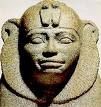
-690 Shebtiku dies, and his brother Taharka (Taharqa) (Tirhakah) (d. -664), the Black Dionysus (Tirhakah in 2 Ki. 19:9) becomes king #5 of the 25th Egyptian (Kushite) Dynasty, campaigning as far E as Palestine and doing extensive building at the capital of Napata; his sister Lady Rodophos becomes Athena Nikephoros, the Black Athena. A plague in the Assyrian army saves Judah from a 2nd invasion.
-689 King Humban-Nimena of Elam suffers a stroke, taking Elam out of the war; Sennacherib lays seige to Babylon for 9 mo., captures it, then destroys it completely in a rage over the death of his son, diverting the Euphrates into the ruins - do you remember when we used to sing sha-la-la-la? The city of Gela (Gr. "laugh") (named after the Gela River) in S Sicily is founded by Greek colonists from Rhodes and Crete, becoming the home of Greek tragedian Aeschylus.
-688 The 23rd Olympiad. The city of Hyperesia in Achaea defends itself from an army from Sicyon by tying burning torches to the horns of goats, spooking them into retreating, causing the town to be renamed Aigeira ("goat town").
-687 On Apr. 22 the Chinese record a meteor shower in the Lyra Constellation.


-685 This year (-716?) after (according to Herodotus, Bk. 1) he makes the mistake of letting him see his wife naked, and she finds out and gives him an ultimatum to do it and marry her to make her an honest woman, his bodyguard (ancestor of Croesus) Gyges (Gugu) of Ludi (d. -652) (d. -647?) kills his closest friend king Candaules (Gr. "dog throttler") (Myrsilus) (son of Myrsus), king #22 of Sardis, sending six golden bowls weighing 30 talents (approx. 1 ton) to Delphi to placate the gods, which are placed next to the royal throne of Midas, ending the Heraclidae Dynasty, and founding the Mermnad(ae) Dynasty in Lydia in W Asia Minor, going on to capture Colophon. Greeks from Megara colonize Chalcedon on the Asiatic side of the Hellespont, and it becomes known as "the city of the blind" because the settlers missed the better site of Byzantium on the European shore. Sennacherib receives tribute from Karib'il Watar, king (malik) of Saba in S Arabia, who conquers Ma'in, Wadi Hadramaut, Aswan, and Qataban, taking the title of mukarrib (emperor) and founding the (black?) Sabean Empire (ends -332), which engages in massive building projects in Marib to distribute the waters of the Wadi Dhana - I'll maqa that on my calendar? The Second Messenian War begins (ends -668); Greek poet Tyrtaeus, a lame schoolmaster of Attica sent to Sparta to assist them against the Messenians, er, that's just a legend; actually, he was a Spartan gen. in the Second Messenian War who uses poetry to spur them to victory; he also creates the trombone - good way to spur them to victory, sticking the slide in their backs? Guan Zhong (Yiwu) (-725 to -645) of Yingshang is appointed PM of China by Duke Huan of Qi, going on to modernize the state, switch from hereditary to prof. administrators, and create state monopolies on salt and iron.
-684 The 24th Olympiad. There is an unusally high inundation of the Nile River in year 6 of the reign of Taharka.
-683 By this time Athens has unified Attica; Eryxias dies, and Athens abolishes its monarchy; the six thesmothetai (junior archons) or magistrates are instituted to interpret the laws, and along with the civil archon, the king archon (who performs the king's religious duties) and the polemarch (war archon) constitute the Nine Archons, who are chosen annually from the aristocracy by the Aeropagus (council of ruling aristocrats, who met on a low rocky hummock on the W side of the Acropolis), while the Ecclesia (citizen assembly) has little power.
-682 Creon is elected as the first archon basileus (ruler/tyrant) of Athens, with a 1-year term. Zhou Zhuang Wang dies, and Zhou Xi Wang (d. -676) becomes Dong Zhou king #4 of China.

-681 Sennacherib, kicker of Israel's ass is murdered by his son Arda-Mulish (Mulish-shi) while praying in a temple, and his younger son Esarhaddon (Ashur-Aha-Iddin)("Ashur has given a brother") (-713 to -669) becomes king of Assyria (until -669) after a little civil war; he goes on to lavishly rebuild Babylon and begin to win the Babylonians over against the Elamites.
-680 The 25th Olympiad adds a 4-horse chariot race at the Hippodrome, becoming the only event not performed in the olive-oiled nude - I wanna be your man, I wanna be your ma-a-a-a-an? Merodach's son launches an unsuccessful attack on Ur. Nimlot E (Lamintu) (d. -660) becomes the last king of Hermopolis. Abd Melquart dies, and Assyrian puppet Baal I (d. -660) becomes king of Tyre (until -660). Gemenef-khons-Bak dies, and Pedubast II (d. -665) becomes king of Tanis. Argishti II dies, and his son Rusa II (d. -645) becomes king #10 of Urartu, building the new capital of Rusahinili (Toprakkale), along with a great water canal from the Hrazdan River (Ildaruni) to Quarlini. Pheidon becomes king of Argos, going on to increase its power and invent weights? Architecture: The first Doric temples, known for simple circular pincushion-shaped capitals and lack of bases on their columns are built in the Peloponnese. Births: Greek (Ionian) lyric poet Archilochus (d. -640) on Paros Island; inventor of iambic poetry (iambic trimeter); known for bitter satire, causing the terms "Archilochian bitterness" and "Parian verse" to be coined; once he gets even with Lycambes and his daughter Neobule for reneging on a marriage arrangement with them by satirizing them so harshly that they freak and hang themselves.
-679 The Cimmerians invade Cilicia and stir up a revolt, which is defeated by the Assyrians.
-677 Vassal king Abdi-Milkuti ('Abdmilkot) revolts from Sennacherib, who captures Sidon, beheads him, and razes the city to the ground, then deports its pop., turning it into an Assyrian province; a new city is built opposite it called Ir-Asaraddon (Kar-Esarhaddon); the island city of Tyre becomes the main city of what's left of Phoenicia, with Baal I as king, stripped of his mainland territories and forced to pay tribute. Assyrian king (since -681) Esarhaddon (d. -669) invades Israel to pacifiy Arab tribes around the Dead Sea, chasing them to the Brook of Egypt (Nile River?).
-676 The 26th Olympiad. Zhou Xi Wang dies, and Zhou Hui Wang (d. -651) becomes Dong Zhou king #5 of China. Yauta' (d. -652) becomes king of Qedar in N Arabia, and later allies with Ashurbanipal. Traditional date of the death of Roman king Numa Pompilius (-672?).
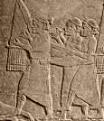
-675 The Elamites invade Assyria, are repulsed and invaded in return, and a puppet king installed. The Babylonians defeat an Elamite invasion by themselves. Deiokes (d. -646) becomes king of the Medes (until -646). Greek lyric poet Terpander of Lesbos (-712 to -645) starts a musical rev. in Greece by changing the kithara (lyre) from 4 to 7 strings and creating the Mixolydian Scale. Theopompus dies, and Anaxandridas I (d. -660) becomes Eurypontid king of Sparta. Traditional date of the reign of Roman king #3 Tullus Hostilius (d. -641), a warlike dude who destroys Alba Longa and fights against the Uncle Nasties (Sabines).
-674 Esarhaddon ends a revolt in Ashkelon, then invades Egypt, and is defeated.

-672 The 27th Olympiad. Esarhaddon divides the Assyrian Empire between his sons, giving Assyria to library-lover Ashurbanipal (-692 to -627) ("Ashur is the creator of an heir") (AKA Sardanapalus), and the subordinate throne of Babylon to Shamash-Shum-Ukin (d. -648).
-671 Assyrian king Esarhaddon sieges Tyre, but it holds out, and he then defeats the Egyptian army, forcing it to retreat to Memphis, and "conquered it in half a day by means of mines, breaches, and assault ladders; I destroyed it, tore down its walls and burnt it down" (his own words), and establishes Assyrian rule in Egypt, becoming the last major territorial expansion of Assyria; Ramses XI is KIA?; Pharaoh Taharqa flees S to Kush (Nubia), after which the capital of Kush (Nubia) moves to Meroe (MeroŽ) on the E bank of the Nile River near modern-day Shendi, Sudan 120 mi. NE of Khartoum; Kush becomes known as Ethiopia; Esarhaddon appoints 20 local princes to govern Egypt, led by Menkheperre Necho (Nekau) I (d. -664) in Sais; too bad, they can't obtain Egyptian loyalty to the hated Assyrians against the Nubians.
-670 King Esarhaddon of Assyria restores Babylon.
-669 Taharqa returns and recaptures Memphis and massacres the Assyrian garrison; in fall after erecting a victory stele for his V in Egypt, and hearing of a revolt by Prince Ushankhuru, Esarhaddon dies while returning to Egypt. Argos S of the Gulf of Corinth defeats Sparta and Tegea in the Battle of Hysiae (Hysiai), and later defeats Athens and Epidaurus to become the leading Greek power; King Pheidon introduces coinage into mainland Greece with a mint at Aegina?

-668 The 28th Olympiad. Esarhaddon's son Ashurbanipal (Ashur-Ban-Apli) (-692 to -627) (Sardanapalios, Sardanapalus, Asenaphar, Asenappab) becomes king of Assyria, and begins collecting the great Library of Ashurbanipal containing 22K+ cuneiform clay tablets, incl. a copy of the ancient Epic of Gilgamesh, which has the Babylonian accounts of the Creation and Flood excavated beginning in 1845 C.E.); some cuneiform is so tiny (6 lines per in.) that it must be read through a magnifying glass; he installs his brother Shamash-Shuma-Ukin (d. -648) as king of Babylon, who has the Shamash-Shuma-Ukin Chronicle inscribed on a small tablet.
-667 Ashurbanipal puts down a revolt in Arvad, then prepares to invade Egypt to quell Taharka's uprising.
-666 The 25th Egyptian Dynasty is conquered by Ashurbanipal, who drives the rulers out of Memphis back up the Nile (southward), then occupies Thebes (No) (home of the chief Egyptian god Amon-Ra), razing it to the ground; Necho I of Sais (-664) is handed over to the Assyrians and carried away to Nineveh, but Ashurbanipal decides he needs local help to rule Egypt so he releases him and installs him as vassal prince of Egypt.
-665 Polydorus dies, and his son Eurycrates (d. -640) becomes Agiad king #11 of Sparta.
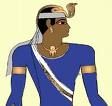
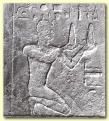
-664 The 29th Olympiad. Taharqa dies, ending the 25th Egyptian (Kushite) Dynasty, and his son Tanutamun (Tenuatamum) (Tantamani) (Tandaname) (Tanwetamani) (Bakare) ("Glorious is the soul of Ra") (d. -656) becomes king #6 of the 25th Egyptian (Kushite) Dynasty at Napata; he kills Necho I and captures and sacks Thebes, causing Ashurbanipal to return and reconquer and raze it to the ground; the sacking of Thebes by Big Ashpan is considered a universally accepted fixed date of chronology; Necho I dies helping Tanutamun defend Lower Egypt from the Assyrians, and his son (by Istemabet) Psamtik (Psamtek) (Psammetichus) (Psammetikhos) I (Wah-Ib-Re) ("Constant is the heart of Ra") (d. -610) becomes king of Egypt (until -610), founding the Egyptian Twenty-Sixth (26th) Dynasty (ends -525), beginning the the 54-year-siege of Azotus (modern-day Ashdod) (ends -610), and going on to unite Egypt and free it from Assyrian control; the Third Intermediate Period (begun -1077) ends, and the Late Period of Ancient Egypt begins (ends -332), with foreigners ruling the country while Egyptian culture flourishes in its last gasp. Greek colonies Corinth and Corcyra begin an economic rivalry.
-662 Ashurbanipal puts down a revolt in Tyre.
-661 Ashurbanipal installs Psamtik I as viceroy of Lower (N) Egypt. The Jin eliminate the Wei Kingdom and the Huo Kingdom in China.


-660 The 30th Olympiad. On Feb. 11 young whippersnapper Jimmu (Jinmu) Tenno (-711 to -585) ascends to the throne of Japan (until -585), founding the Yamato Empire as emperor #1; ; his motto is "All the world under a roof of eight poles", with everybody paying homage to the Sun goddess and obeying her god-on-earth, him. The Elamites invade Babylonia. Baal I of Tyre dies, after which who knows who's in charge of Tyre for the next 70 years (until -591). Ashurbanipal demands tribute from King Gyges of Lydia, and sends emissaries, as recorded on a tablet of Ashurbanipal. Anaxandridras dies, and Archidamus I (d. -645) becomes Eurypontid king of Sparta. About this year an enormous solar storm strikes Earth. Architecture: The earliest temple to Artemis in Ephesus is destroyed by the Cimmerians, and is rebuilt 2x by -550. Births: Persian Zoroastrianism founder Zarathustra (Pers. "camel driver") (Zoroaster = Gr. "undiluted stars") (d. -583) (flourished in -625?) in Media. Deaths: King Nimlot E of Hermopolis.
-659"> Greek Athenian lawgiver Draco (Drakon) (d. -601).
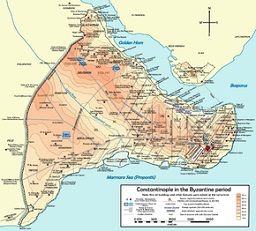
-657 Cypselus (d. -625) overthrows the Bacchiad oligarchy and becomes the first tyrant of Corinth. Greeks from Megara found a colony at Byzantium (Byzantion) (modern-day pop. 14.1M/14.7M) on the site of the 11th-13th cent. B.C.E. Thracian fishing village of Lygos between the Golden Horn (an arm of the Bosphorus) and Sea of Marmara (Propontis) on the European side of the Bosphorus across from Chalcedon on the Asiatic side, and name it after Megarian leader Byzas (Byzantas) of Thrace, who was told by the oracle of Apollo at Delphi to settle there, marrying Lygos gov. Barbysios' daughter Phidalia; located on the Silk Road, and the only sea route between the Mediterranean Sea and Black Sea, it dominates trade; on May 11, 330 C.E. Roman emperor Constantine dedicates it as his new capital, becoming the largest and wealthiest city in Europe from about 450-1204, when it is captured by the Latin Crusaders, then reconquered by the Greek Byzantines in 1261, holding on against yearly Ottoman Muslim attacks until it falls on May 29, 1453, becoming Istanbul ("to the city"), after which the Ottoman Empire rules it until its dissolution on Oct. 29, 1923, when it becomes part of the Turkish Repub.
-656 The 31st Olympiad. In Mar. Psamtik I dispaches a naval fleet to Thebes that compels Kushite princess Shepenupet (Shepenwepet) II to adopt his daughter Nitocris I (d. -585) as her heiress as depicted in the 6' x 4.5' red granite Adoption Stela in Karnak (discovered in 1897 by Georges Legrain), ending the Nubian 25th Dynasty's control over Upper Egypt; Tanutamun dies after being driven from Egypt by the Assyrians, but the Kushite Kingdom of Napata continues.
-655 Psamtik I rebels from Assyrian rule, aided by Carian and Ionian mercenaries sent by Gyges of Lydia, and gains control of all of Egypt, founding the Egyptian Twenty-Sixth (26th) (XXVI) Dynasty (ends -525), which rules from Sais, and enjoys a cent. of independence. The Elamites under Tept-Humaan invade Babylon, and their king is KIA. The Jin eliminate the Guo Kingdom and the Yu Kingdom in China.
-654 Phoenician settlers found a port on the Balearic Island of Ibiza (Eivissa) (Phoenician "Iboshim" = dedicated to Bes, goddess of music and dance) off the E coast of Spain; the Romans later call it Ebusus, and the Greeks later call it and sister island Formentera the Pitiusas ("pine-covered islands") (modern-day Pine Islands); within 160 years Carthage takes it over. Births: Greek lyric poet Alcman (Alkman) (d. -611).
-653 King Phraortes of the Medes lays siege to Nineveh, and is defeated and killed with the help of the Scythians.
-652 The 32nd Olympiad. The Babylonians under King Shamash-Shuma-Ukin begin a revolt against the Assyrians under his brother Ashurbanipal with the support of Phoenicia, the Arabs, Judah, the Chaldeans and the Elamites; Ashurbanipal invades the S and sieges Babylon for two years, driving it its pop. to cannibalism. Perdikkas I dies, and Argaios (d. -621) becomes king of Macedonia. The Cimmerians attack Lydia, occupy Sardis, and kill King Gyges; he is succeeded by his son Ardys II (d. -624), who becomes the 2nd Mermnad king of Lydia, going on to attack Miletus and capture Priene, and spend most of his reign fighting the pesky Cimmerians. Ashurbanipal helps depose Yauta' in favor of Abiyate (d. -644) as king of Qedar in N Arabia. The earliest recorded coins are produced in Lydia (in modern-day Turkey), during the reign of King Gyges, and are composed of electrum (naturally occurring gold-silver amalgam).
-651 The Cimmerians are driven from Lydia by Ardys, who then plans an electrumfying campaign against the Greek cities on the coast of Asia Minor. Zhou Hui Wang dies, and Zhou Xian Wang (d. -619) becomes Dong Zhou king #6 of China. The Sicilian Greek colony of Selinus is founded by Dorian Greek colonists from Megara Hyblaea; being the closest one to the Phoenician cities it sometimes switches sides in Greek-Phoenician disputes?



-650 Between this year and 323 B.C., Greece has 1.2K separate city-states. The Egyptians expel the Assyrians, who are weakened by their war with Babylon. The Messenians revolt against the Spartans, starting the Second Messenian War (ends -630), allying with Argos and Arcadia ("people of the bear") and winning the Battle of Senyclarus. King Manasseh of Judah returns to Jerusalem from captivity in Babylon and institutes reforms while building better defenses. About this time 1-eyed Lycurgus (the Lawgiver) (Gr. "he who brings into being the works of a wolf") (-700 to -630), reorganizes Sparta, broadening its power base and instituting a polyandric (sloppy seconds?) male chauvinist militaristic culture, with lifelong military training starting at age seven, rigid oligarchic govt. with three Doric tribes each providing a lochos (regiment) for the army, a Gerousia (council) of 28 elders and two kings, an Apella (assembly) made up of adult male citizens (spartiates), five ephors (chief magistrates) with wide powers, and a subclass of non-Spartan Laconians called the Perioikoi who serve in the army but have no vote in the assembly. About this time the city of Rome begins to take off, with homes having foundation blocks, tiled roofs, landscaping, inscriptions, art, etc., and exotic imports from the Greek world. In this decade Greek poet Archilochus of Paros leads a colonizing party to Thasos; he later gets in a battle with the Thracians, loses his shield and runs from the fight, then writes verses trying to whitewash himself, causing the Spartans to banish him back to Paros, where he dies in a war with Naxos. About this time the rulers of Yemen move their capital from Sarwah (Khriba) to Ma'rib (60 mi. E of Sana'a), and change their title from makrib to king of Sheba (ends -115). In this half-cent. the Greek city-colony of Paestum (Posidonia), 25 mi. SE of modern-day Salerno (50 mi. ESE of Naples) on the Gulf of Salerno is founded by colonists from Sybaris, and devoted to Poseidon, to whom they build a colossal Doric Temple of Poseidon, (Hera?) which survives to modern times as one of the most well-preserved ancient Greek temples. By this time the Greeks have stripped their hillsides of trees, leading to erosion. By this time iron working spreads to North Africa - to make cooking pots for missionaries? Inventions: About this time papyrus is used for written scrolls by the Egyptians; demotic (Gr. "popular") script, a cursive form of hieratic script written from right to left is developed, and used until the 5th cent. C.E. About this time the first historical reference is made to triremes, boats with three rows of oars and battering rams; they eventually work up to 170 rowers - pass the deodorant? Art: The Black Figure Period in Greek Art (decorated pottery) begins (ends -510).
-648 On Apr. 6 the Greeks record their first total solar eclipse. The 33rd Olympiad adds the pancratium, a no-holds-barred extreme-ultimate wrestling-boxing event. The Babylonian revolt against the Assyrians is miserably unsuccessful; Babylon is sacked and Shamash-Shuma-Ukin commits suicide; Ashurbanipal installs Kandalanu (d. -627) as king of Babylon, except for Nippur.
-647 Median king Deioces dies after being captured and deported to Hamath by Sargon II. Ashurbanipal sieges Susa; his soldiers topple it with pickaxes and crowbars and carry off the spoils; Cyrus (Kurush) I becomes an Assyrian vassal.
-646 Phraortes (d. -625) becomes king of the Medes.
-645 Egyptian king Psamtik I recaptures what is left of Thebes from the Assyrians. Archidamus I dies, and his son Anaxilas (d. -625) becomes Eurypontid king #10 of Sparta. Rusa II dies, and his son Sarduri III (d. -635) becomes king #11 of Urartu; the Urartian kingdom around Lake Van begins a decline, although he does erect a monument called the Treasury Gate and another at Alexandropol (modern-day Leninakan) to crow about his Vs with the Hittites to the W and the Manni (Minni) to the E. Deaths: Chinese PM (-685) Guan Zhong (b. -725). Greek Lesbian poet Terpander of Antissa (b. -712).
-644 The 34th Olympiad.
-642 Judean king (since -696) Manassah dies, and "Wicked King" Amon (d. -640) (Heb. "master builder or workman") becomes yet another bad king of Judah (2 Ki. 21:19); cents. later a Hellenistic Jew writes The Prayer of Manasses (Manassah), in which he confesses his sins and begs Jehovah for forgiveness.

-640 The 35th Olympiad. Persia becomes a vassal state of Media. Eurycrates dies, and his son Anaxander (Anaxandros) (d. -615) becomes Agiad king #12 of Sparta. Ancus Marcius (Martius) (d. -617) becomes Etruscan king #4 of Rome (until -617), going on to construct Rome's first jail, the Carcer on the NE slope of the Capitoline Hill facing the Curia, the Sublician Bridge, the first bridge across the Tiber River, and the port of Ostia at the mouth of the Tiber River (14 mi. SW of Rome), becoming the first Roman colony, famed for salt works and as a port for grain from Sicily, Sardinia, and Africa, as well as chief base of the Roman navy; Marcius captures many Latin towns and moves their pops. to Rome. The kingdom of Macedon (Macedonia) is founded after Perdiccas I of the Argead Dynasty conquers the Macedonian plain and establishes a capital at Aegae (Aigai) (Vergina) in N Greece; Greeks, Illyrians, and Thracians move on in and Hellenize the aristocracy? Amon is murdered by his own servants, then the "people of the land" (Heb. "'am ha-'a'rets") put them to death and place Amon's 8-y.-o. son (by Jedidah the daughter of Adaiah) (2 Ki. 22:1) Josiah (Josias) (d. -609) (Heb. "may Jehovah give", "Jehovah heals") on the throne of Judah, burying Amon in the garden of Uzza (2 Ki. 21:19-26, 22:1-2, Chron. 33:20-25); Josiah is the son of Jedidah the daughter of Adaiah (2 Ki. 22:1); his wives are Hamutal and Zebidah (2 Ki. 23:31-6); of his four sons, only the firstborn Johanan does not rule as king of Judah after him; of the seven Judean kings after Hezekiah, he is the only one who takes steps to rid the land of false worship after Zephaniah (Tzepfanayah) (Sophonias) (Heb. "Jehovah has concealed") writes The Book of Zephaniah (Sophonias) during his reign, warning about the coming "day of the Lord" when he will punish Jerusalem for going after other gods, causing Josiah to tear down the high places and the Asherah poles and reinstate the worship and feasts of the One True God Jehovah; in 2019 an agate stone and lump of burnt clay used as seals are discovered in the old City of David, mentioning Nathan-Melech, Josiah's servant? Births: Greek soldier Pittacus of Mytilene (d. -568) in Mytilene. Deaths: Greek poet Archilochus (b. -680).
-639 Assyria destroys Susa, and devastates the land of Elam; the Assyrian Annals (state records) abruptly end this year; "With the year 639, the sources for Assyrian history cease... No explanation can be given for this curious blackout. With appalling suddenness, the Empire disintegrated." The Interpreter's Dict. of the Bible)
-638 Births: Greek lawgiver (first Athenian poet) Solon (Gr. "wise") of Athens (d. -558) in Athens; son of Execestides; descendant of Codrus, last king of Athens; ancestor (six generations removed) of Plato; relative of Pisistratus (their mothers are cousins).
-636 The 36th Olympiad. Gong Zi Zhong Er (d. -628) becomes the Duke of Jin.
-635 Sarduri III dies, and his son Erimena (d. -629) becomes king #12 of decaying Urartu.
-634 The Medes under Cyaxares (Kyaxares) (U-ma-kis-tar) (grandson of Deioces) capture Asshur, then Cyaxares meets with Nabopolassar by the captured city and makes an entente cordiale. Josiah's wife Zebidah gives birth to his 2nd son Jehoiakim (Heb. "Jehovah raises up") (2 Ki. 22:1, 23:36).
-633 Josiah's wife Hamutal gives birth to his son Jehoahaz (Heb. "Jehovah has taken hold") (Shallum) (2 Ki. 22:1, 23:31; Jer. 22:11).
-632 The 37th Olympiad. The Cylonian Affair sees Athenian noble (Olympic champ) Cylon attempts to establish a tyranny in Athens with help from Megara (run by his tyrant father-in-law Theagenes), but the people don't support him, and they hole-up in the Temple of Athena on the Acropolis, after which Cylon and his brother escape, but the rest are captured by the nine archons of Athens led by Megacles and the Alcmaeonid aristocratic clan while hiding in the Temple of Athena on the Acropolis, then promised their safety and massacred, causing the Curse of the Alcmaeonidae, an inherited miasma (stain) on them. The Duke of Jin unites the remaining Chinese kingdoms and defeats the Chu in the Battle of Cheng Pu.
-630 Ashurbanipal abdicates, and appoints his son Ashur-Etil-Ilani as regent. Sparta wins the Second Messenian War (begun -650), and forces the poor Messenians back into helotry (serfdom). About this time the town of Histria (Istros) (Gr. "By the Danube") on the Dobrudja Black Sea Coast at the mouth of the Danube River is founded, becoming the first Greek town in modern-day Romania, opening up trade with the interior. About this time Greek elegiac poet Mimnermus of Smyrna (born in Colophon, Ionia) flourishes (until -600), composing Nanno, a collection of love poems addressed to a flute player. Births: Greek lezzie poet ("the Tenth Muse") ("the Poetess") Sappho (d. -570); leaves The Midnight Poem; written between Jan. 25 and Mar. 31?; "The Moon is set, and the Pleiades./ It's the middle of the night./ Time passes./ But I sleep alone." Greek (Dorian) lyric poet Stesichorus (Gr. "chorus master") (d. -555); first poet to use a palinode (an ode retracting a view expressed in an earlier poem), retracting his view that the Trojan War was all Helen's fault.
-629 Erimena dies, and his son Rusa III (d. -601) becomes king #13 of Urartu.
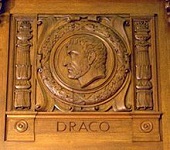
-628 The 38th Olympiad. Athenian thesmothetai (judge) Draco (Drakon) (Gr. "serpent, dragon") the Lawgiver (-659 to -601) is elected ruler of Athens, going on in -622/-621 (39th Olympiad) to enact the draconically strict Law Code (Constitution) of Draco, the first law code of Athens, displayed at a central public location, which punishes the stealing of cabbages with death; "And Draco himself, they say, being asked why he made death the penalty for most offenses, replied that in his opinion the lesser ones deserved it, and for the greater ones no heavier penalty could be found"; uninentional and intentional homocide are first distinguished, with crimes adjuticated at the Aeropagus - is that a trick question? King Josiah of Judah begins a 6-year campaign against idolatry, which extends even into the former lands of the 10-tribe kingdom of Israel (2 Chron. 34:3-8).
-627 Kandalanu dies, and Assyrian Gen. Sin-Shum-Lishkar is appointed king of Babylon; Ashurbanipal's viceroy Kandalanu dies, and he revolts but is ousted. Ashurbanipal dies, and his son Ashur-Etil-Ilani (d. -624) becomes king of the Assyrians. The city of Epidamnos (Epidamnus) (Epidamnos) (modern-day Durazzo or Durres, pop. 201K) in Illyria on the Albanian coast opposite Bari and Brindisi across the Adriatic Sea is founded by Greek colonists from Corinth and Corcyra, becoming known for its natural rocky harbor surrounded by swamps and cliffs, making it very durable and secure from attack; the Romans seize it in the 4th cent. B.C.E. and change its name to Dyrrachium.
-626 A 3-year civil war erupts for control of the Assyrian throne; Sin-Shum-Lishkar is KIA, and Ashurbanipal's son Sin-Shar-Ishkun (d. -612) becomes king of Babylon; Chaldean king Nabopolassar declares himself king of Sealand, stirs up a revolt, and drives Sin-Shar-Ishkun back to Nineveh, capturing Babylon.

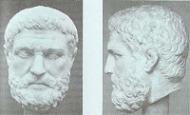
-625 Chaldean king Nabopolassar (Naboplashar) (Nabu-Apla-Usur) (d. -605) becomes king of the Babylonians, founding the Nabo-Bab, er, Neo-Babylonian Empire (ends -539); the term Chaldea (formerly only the region in S Babylonia bordering on the "Nether Sea" or Persian Gulf) becomes synonymous with all of Babylonia. Anaxilas dies, and Leotychidas I (d. -600) becomes Eurypontid king of Sparta. Cypselus dies, and his son Periander (Periandros) (d. -585) becomes the 2nd tyrant of Corinth, bringing it to its zenith; and becoming one of the Seven Sages of Greece. Median king Phraortes dies.

-624 The 39th Olympiad. Cyaxares (Kyaxares) (Huvakhshtara) (Uvakshatra) (d. -585) (grandson of Deioces) ends Scythian domination, and becomes king of the Medes, reorganizing the army along Assyrian lines - use their own tactics against them? Births: Greek philosopher (the first?) ("the Father of Science") Thales of Miletus (d. -547); father of Greek philosophy, and Mr. Water Is the Source of All Things (Arche); regarded by Aristotle as the first philosopher; "Western philosophy begins with Thales" (Bertrand Russell).

-623 Ashur-Etil-Ilani is KIA in a battle near Nipur by his brother Sin-Shar-Ishkun, who becomes king of Assyria (until -612). Anlamani (d. -593) becomes king of the Kushite kingdom of Napata, and campaigns against the nomadic Nubian Blemmyes (Blemmyae); not to be confused with the legendary Blemmyes, who are headless, with their eyes and mouth in their chest. In the 18th year of King Josiah of Judah, during the repair of the Temple, the Book of Deuteronomy (Heb. "the book of Jehovah's law by the hand of Moses") is "found" by Jewish priest Hilkiah (Heb. "my portion is Jehovah"), causing the king to rip his garments and then assemble all of the people to read it to them; he then arranges for the biggest Passover (Nisan 14) since the days of the prophet Samuel, which features 30K animals and 3K cattle slaughtered and BBQed (2 Ki. 23:21-23; 2 Chron. 35:1-19). The Chu eliminate the Jiang Kingdom. Births: Real date for the birth of Gautama Buddha?
-622 After the Jewish Temple is repaired, King Josiah of Judah orders the Ark of the Covenant returned from safekeeping; prophet Jeremiah says that the Ark will not be missed because "Jerusalem itself will be called the throne of Jehovah" (Jer. 3:16-17); in John's Revelation "the Ark of the Covenant was seen in his temple sanctuary" in heaven (Rev. 11:19) - so Indiana Jones fans must be out of luck?
-621 Argaios I dies, and Philip (Gr. "horse lover") I (d. -588) becomes king of Macedonia (Macedon).
-620 The 40th Olympiad. Greek colonies housing Greek soldiers are founded in Egypt around the trade center of Naucratis (Naukratis) (Gr. "the city that wields power") at the mouth of the Nile River, encouraged by Psamtik; the different Greek tribes who live there create the first nat. Greek identity? - ancient multiculturalism? Periander decides to build a canal across Corinth, but the Oracle of Delphi (who hoards the precious formula for dynamite?) warns against it, so he begins to build a road to carry boats on instead, the 3.5-mi. Diolcos (Gr. "haul across") (Gr. "movable platform") (finished -606). About this time cithara-playing Arion of Methymna invents dithyrambic poetry in Lesbos and composes named dithyrambic choruses, the predecessor of the Greek drama (Gr. "to act") in Corinth. Births: Grecian "Aesop's Fables" freed slave fable king (hunchbacked dwarf) Aesop (d. -560) in Phrygia or Thrace; starts out as a slave in Samos, then lives at the court of Croesus, meets Solon, dines with the Seven Sages of Greece and Periander in Corinth, and visits Athens and pisses-off Peisistratus.
-619 Zhou Xian Wang dies, and Zhou Qing Wan (d. -612) becomes Dong Zhou king #7 of China.
-616 The 41st Olympiad. Nabopolassar unsuccessfully sieges Ashur. About this time the Etruscans conquer Rome and found a dynasty of Etruscan princes, the gens Tarquinia; traditional date of the beginning of the reign of Roman (Etruscan) king Lucius Tarquinius Priscus I the Elder (d. -579), who kicks neighboring Latin tribes' butts, then unites the Seven Cities of Rome, and begins the construction of public bldgs., draining and paving the central area of the Roman Forum between the Capitoline and Palatine ridges, and building a huge Etruscan-style Capitoline Temple (dedicated to Jupiter?) with three cellae (rooms) on the Capitoline Hill; the communities on the Palatine and Capitoline Hills are also enclosed with fortifications, remnants of which survive to modern times.
-615 The Medes invade Assyria, capture Arrapha, and siege Nineveh. Anaxander dies, and his son Eurycratides (Eurycratidas) (Gr. "wide ruler") (d. -590) becomes Agiad king #13 of Sparta, presiding over the devastating war with Tegea.
-614 The Assyrian city of Assur (Ashur) falls to the Medes under Cyaxares, who allies himself with the Babylonians under Nabopolassar.
-613 Nebuchadnezzar (Nabu-kudurri-usur) II, son of Cyaxares of Media marries the granddaughter of Babylonian king Nabopolassar; the Assyrians launch an offensive aginst the Babylonians. The Mayans begin to keep their calendar.
-612 The 42nd Olympiad. The Assyrian capital of Nineveh (pop. 100K) is sieged, sacked, and destroyed by the Babylonians under Nabopolassar, the Medes under Cyaxares, and the Scythians (Nah. 3:7), turning it into "ruin-hills and heaps of debris" (Babylonian Chronicle 21901 of the British Museum); the ruins aren't rediscovered until 1849 C.E.; the great library of Ashurbanipal is destroyed (22K cuneiform tablets found in modern times); the Assyrian Empire is threatened with collapse as the Medes and Babylonians divide it; Sin-Shar-Ishkun dies, and Ashur-Uballit II (d. -609) becomes the last king of the Assyrians, taking what is left of his army and fleeing 225 mi. W to Haran; Nippur falls to the Babylonians after a prolonged siege; Nahum writes The Book of Nahum about the time of Nineveh's fall? Zhou Qing Wang dies, and Zhou Kuang Wang (d. -606) becomes Dong Zhou king #8 of China.
-611 Deaths: Greek lyric poet Alcman (b. -654).


In the late 7th cent. or 6th cent. B.C.E. according to modern Bible scholars, the Pentateuch (Five Books of Moses) (Torah) incl. Genesis, Exodus, Leviticus, Numbers, and Deuteronomy begin to be composed by four different sources, which are collated into the final version in the 5th cent. B.C.E.; the first two are "J" (Jahwist/Yahwist), living in the southern Kingdom of Judah, and "E" (Elohist), living in the northern Kingdom of Israel; in the 6th cent. B.C.E. "P" (Priestly) writes the first chapter of Genesis, and "D" (Deuteronomist) writes Deuteronomy; there are two versions of the creation story in Genesis; E's version of creation (Gen. 1:1-2:3): "In the beginning (Bereshith) God created the heaven and the earth. And the earth was without form, and void; and darkness was upon the face of the deep. And the spirit of God moved upon the face of the waters. And God said, 'Let there be light'; and there was light..."; J's version of creation (Gen. 2:5-7): "At the time when Yahweh God made earth and heaven, there was as yet no wild bush on the earth nor had any wild plant yet spring up, for Yahweh God has not sent rain on the earth nor was there any man to till the soil. However, a flood was rising from the earth and watering all the surface of the soil. Yahweh God fashioned man (adam) of dust from the soil (adamah). Then he breathed into his nostrils the breath of life and thus man became a living being." Psamtik I dies, and his son (by Mehtenweskhet) Necho (Nekau) (Neku) (Nechoh) (Nikuu) II Wahem-Ib-Re ("Carrying out the heart of Ra") (-658 to -595) becomes king #2 of the Egyptian 26th Dynasty (until -595); meanwhile the Median-Babylonian army marches on Harran, where his ally Ashur-Uballit II is holed-up, and he attempts to assist him, sending a small army which proves too small and retreats; meanwhile the 54-year siege of Azotus (Ashdod) by Egypt (begun -664) ends, becoming the longest siege so far in history. Births: Greek philosopher (Thales' pupil) Anaximander of Miletus (d. -546); the first writer on philosophy, and Mr. Undefined Unlimited Boundless Substance Is the Source of All Things.

-609 In spring Necho II leads a large army of mercenaries along the Via Maris coastal route ino Syria to help Ashur-Uballit II in Harran fight Babylonian conqueror Nabopolassar, but on the way he is intercepted by King Josiah of Judah at Megiddo, where Josiah is shot by an Egyptian archer in his war chariot (2 Chron. 35:20-25, 2 Ki. 23:29-30), and brought back to Jerusalem to die, after which Necho II sends messengers with the soundbyte: "What quarrel is there between you and me, O king of Judah? It is not you I am attacking at this time, but the house with which I am at war. God has told me to hurry; so stop opposing God, who is with me, or he will destroy you" (2 Chron. 35:21); after Nabopolassar captures Kumukh, cutting him off, Necho II goes on to capture Kadesh in Syria on the Orontes River, sending his battle clothes to Branchidae of Miletus, who dedicates them to Apollo; meanwhile Ashur-Uballit II flees Harran SW to Syria, hooking-up with Necho II and returning over the Euphrates (becoming the first pharaoh to cross it since Thutmose III) to siege Harran, but fail to capture it and retreat back to N Syria, after which Ashur-Uballit II vanishes from history, and Assyria is kaput, swallowed by the Babylonians, who annex Megiddo but leave it waste to get even for centuries of maltreatment; by popular acclaim Josiah's 4th and youngest son, 23-y.-o Jehoahaz (Joahaz) (b. -632) (Heb. "Jehovah has taken hold") (AKA Shallum) becomes king of Judah for 3 mo. (2 Ki. 23:29-31, 2 Chron. 36:2) and rules badly until Necho II imprisons him at Riblah and removes him in favor of his 25-y.-o. brother Eliakim, changing his name to Jehoiakim (-634 to -598) (Heb. "Jehovah raises up") (2 Ki. 23:34-6, 1 Chron. 3:15); his 11-year rule is marked by injustice and oppression, and raids from marauder bands; Jehoahaz is later taken to Egypt, where he dies in captivity (2 Ki. 23:31-4, Jer. 22:10-12); the Book of Hakkuk, warning of the coming wrath of God using the Chaldeans (Babylonians) to execute his judgment on Judah for their sins is written during his reign? The Medes conquer Urartu. Alyattes (d. -560) (Lydian "walwi" = lion) becomes king #4 of Lydia, and sets out to conquer the Greek cities of coastal Asia Minor, scoring all of them except Miletus. During his Syrian campaign, Necho II begins building a canal linking the Pelusiac branch of the Nile River with the Red Sea (Erythraean Sea) (precursor of the Suez Canal), founding the city of Per-Temu Tjeku ("The House of Atum of Tjeku) in modern-day Tell el-Mashkuta 9 mi. W. of Ismalia, but stops it to go to war and never finishes it after 120K workers die trying to build it; after forming a navy using Ionian Greeks, Necho II's ships begin a 14-year circumnavigation of Africa from east to west.
-608 The 43rd Olympiad. Necho II retakes Kumukh after a 4-month siege, and executes the Babylonian garrison.
-607 Babylonian king Nabopolassar and his son crown prince Nebuchadnezzar assemble independent armies; within a month the father goes back to Babylon, and his son successfully wars in mountainous territory, returning with much spoil. The year (Ab 7-11, 5th Jewish month) in which the Babylonians conquer Big J's Holy City of Jerusalem after a 3-year siege and take the Jews into captivity, according to the Jehovah's Witnesses (everybody else thinks this happened in -587, but they are all wrong because the JWs are right?); this makes their freeing by Cyrus II the Great 70 years later conform to the JW Bible chronology based on the key year 1914 C.E. when 2520 years (7 x 360 years) (seven years of years) are added, although it disagrees with all secular historians, and pushes all prior Bible dates back 20 years - still, it would be funny if? About this time Jewish prophet Obadiah (Abdias) ("worshipper/servant of Jehovah") writes the Book of Obadiah (Abdias), and "the weeping Jewish prophet" Jeremiah ("Jehovah exalts") writes the Book of Lamentations.
-606 After being taken into taken into captivity at Jerusalem by Nebuchadnezzar II of Babylon in the 3rd year of Jehoiakim (-587 according to the Jehovah's Witnesses), noble Jewish youth Daniel (Heb. "Jehovah is my judge") becomes the king's minister. Rome passes a law prohibiting the playing of any musical instrument except the pipes; the reforms of Servien permit the tuba and cornu to be played. Zhou Kuang Wang dies, and Zhou Ding Wang (d. -585) becomes Dong Zhou king #9 of China. Architecture: The Dioclos (begun -620) is completed.
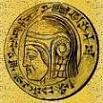

-605 In summer Babylonian crown prince Nebuchadnezzar (Nabuchodonosor) (Nabu-Kudurri-Usur) ("O god Nabu, preserve my firstborn son") II (d. -562) defeats the Egyptians under Necho II (his rival for control of Syria and Palestine) at the Battle of Carchemish (Karkemish) on the W Bank of the Euphrates River 400 mi. N of Jerusalem (Jer. 46:1-2) (35 mi. SE of Gaziantep in S Turkey on the Syrian border), and overtakes and annihilates the fleeing Egyptian army at Hama; both sides take heavy casualties, and Nabopolassar is KIA; Egyptian power in Asia is destroyed (2 Chron. 35:20); "For the mighty man has stumbled against the mighty, and they are fallen both of them together (Jer. 46:12); on the first day of Elul (Aug.-Sept.) his son Nebuchadnezzar II is crowned king of Babylon and becomes undisputed ruler of W Asia (until -562); Judean king Josiah takes on Necho on his way to Carchemish in violation of God's orders, and is wounded by archers and brought back to Jerusalem, where he dies, and Jeremiah utters laments for him, which "are written in the Laments" (2 Chron 35:20-27); Josiah is succeeded by 23-y.-o. Jehoahaz, who reigns 3 mo. until Necho deposes him and lays a tribute of 100 talents of silver and one talent of gold on the land, then makes his 25-y.-o. brother Eliakim king of Judah, changing his name to Jehoiakim (Heb. "He whom Yahweh has set up"), taking his brother Jehoahaz hostage back to Egypt; "He reigned eleven years in Jerusalem, and did what was evil in the sight of the Lord his God" (2 Chron. 36:1-8). About this time "the weeping Jewish prophet" Jeremiah ("Jehovah exalts") begins composing the Book of Jeremiah, a prophecy directed against Israel, Judah and all the nations dictated it to his secy. Baruch (Jer. Ch. 36). Births: Greek (Athens) tyrant (-560 to -527) Pisistratus (Peisistratos) (Peisistratus) (d. -527) (pr. pie-SIS-truh-tus) in Athens; son of Hippocrates; relative and friend of Solon.
-604 The 44th Olympiad. Nebuchadnezzar II returns to Hattu, and in the month Shebat (Jan.-Feb.) returns to Babylon with vast booty; he again leads his forces through Hattu, and destroys the Philistine city of Ascalon (Ashkelon) after it rebels. In the month of Chislev (Nov.-Dec.) Jehudi reads Baruch's scroll to King Jehoiakim, predicting Judah's destruction by Babylon; the king orders it burned in his brazier (Jer. 36:1-4, 21-29). Big man Nebuchadnezzer begins construction of the Wonder of the World Hanging Gardens of Babylon - if I were to give it a grade from A-F, I'd give it a Y, for why did I do it? Births: Chinese philosopher (founder of Taoism) Lao-Tzu (Lao-Tze) (Laozi) (Laozi) (Lao Zi) (Laotze) (Lao Tse) (Chin. "old master") (d. -531) in Chu (d. -470 at age 130?).
-603 Nebuchadnezzar II conducts another campaign into Hattu.
-602 Nebuchadnezzar II conducts another campaign into Hattu.
-601 The Saite king Necho II defeats Nebuchadnezzar II; Jewish king Jehoiakim seizes the initiative to revolt from Nebuchadnezzar and defect to the Egyptians; Nebuchadnezzar defeats the invading Egyptians, and forces Judean king Jehoiakim (d. -598) to become his vassal for three years (II Ki. 24:1). Rusa III dies, and his son Sardure IV (d. -585) becomes king #14 of Urartu. Deaths: Greek Athenian lawgiver Draco (b. -659) in Aegina.

-600 The 45th Olympiad. The Iron II Period of Archeology (begun -1000) ends, and the Iron III Period of Archeology begins (ends -330). Critias is elected ruler (archon) of Athens. Leotychidas I dies, and Hippocratidas (d. -575) becomes Eurypontid king of Sparta. Athens seizes Sigeum in Asia Minor from Mytilene, causing a war (ends -590). Cleisthenes, tyrant of Sicyon transfers Arion's tragic choruses to Dionysus. The Spanish harbor town of Gades is destroyed by their rivals the Phoenicians. About this time the city of Vercelli on the Sesia River between modern-day Milan and Turin in modern-day Piedmont, Italy (modern-day pop. 46K) is founded, becoming known for rice paddies; in 1228 the world's first publicly-funded univ. is founded there (closed in 1372). In this cent. the Mediterranean port city of Marmaris (originally Physkos or Lyscus) in a part of Caria belonging to Rhodes (modern-day Mugla Province, W Turkey on the Turkish Riviera), with a magnificent harbor and sacred grove to Leto; Herodotus claims that a castle existed there since 3,000 B.C.E. About this year the first recorded circumnavigation of Africa by ships of Egyptian pharaoh Necho II (manned by Phoenicians) takes three years, sailing from the Red Sea around Africa, rounding the Cape of Good Hope heading W, noting that the Sun i s to their right, then N to the Mediterranean, pausing each year to sow and harvest grain; Herodotus is later skeptical of this voyage, not knowing that the Earth is spherical. About this time the dense pop. of Zealand, Jutland, and Skane suddenly collapses after being hit by a cyclone or tsunami, after which the North Atlantic freezes, the Arctic becomes a solid ice sheet, and Scandinavia develops a damp, cool climate, causing the Scandinavians to move N inland, displacing the indigenous Bronze Age Gamla Folk whose civilization was founded around 1600 B.C.E. In this cent. the isolated Greek state of Boeotia (Beotia) in C Greece, founded by Aeolic tribes from Thessaly emerges, bounded on the N by Locris Opuntia, on the E by the Atalante Channel and the Evripos Strait, on the S by Attica, Megaris, and the Gulf of Corinth, and on the W and NW by Phocis; the capital is Thebes; Boeotians are famed for stupidity. In this cent. the Sangam Period (ends 3rd cent. C.E.) begins in ancient Tamil country in S India, now known as Tamilakam, incl. modern-day Tamil Nadu, Kerala, Puducherry, Lakshadweep, S Andhra Pradesh, S Karnataka, and N Sri Lanka, speaking the Tamil language; 230 sq. km. 96.5 km-long Vembanad (Vembanadu) (Punnamada) (Kochi) Lake in modern-day Kerala, India's largest lake features the Kuttanad (Chuttanad) ("place of the burnt forest) region, with rice paddies below sea level, becoming known as "the Rice Bowl of Kerala". In this cent. the city of Delhi (modern-day pop. 16.8M/26.5M) in N India is founded, going on to become the capital of several kingdoms and empires and get captured, sacked, and rebuilt several times. In this cent. the 15th cent. B.C.E. city of Kabul (Kubha) on the Kabul River in modern-day Afghanistan (modern-day pop. 4.6M) is conquered by the Achaemenid Empire, becoming a center of learning of Zoroastrianism, followed by Buddhism, Hinduism, and Islam (870 C.E.). In this cent. the Phocaeans of Massalia found Monaco (Gr. "Monoikos" = single house) (Lat. Monoecus), which becomes known for its worship of Greek god Hercules. About this time Yaharil founds the Kingdom of Haram in S Arabia (ends -175). About this time the small 7-hill town of Rome experiences food shortages and is conquered by several Etruscan princes; the Etruscan League of Cities is formed in Italy, and Rome is ruled by Etruscan kings. About this time the Celtic Gauls, experiencing overpop. problems invade N Italy under their king Bellovesus with six excess tribes, the Bituriges, Arverner, Senonen, Haeduer, Ambarrer, Carnutes, and Aulerci, receiving help from the Greeks in Massilia (Marseille) to cross the Alps in the Tauriner area, then defeat the Etruscans under king Tarquinius Priscus at the Tessin River, and settle Insubria, founding the city of Mediolanum (modern-day Milan) (Lat. "middle of the plain") ("central town or sanctuary"?) ("half-wool", after a boar sow is lifted from the excavation of the city walls?) (modern-day pop. 1.3M), and becoming known as the Insubres, and the region as Insubria. In this cent. the city of Theline (modern-day Arles) in S France on the Rhone River is founded by the Greeks. In this cent. the seaport of Pozzuoli on the Bay of Naples is founded by Greek colonists. In this cent. the town of Constanta (Tomis) in Romania on the Black Sea Coast is founded, becoming the oldest to survive to modern times. The original Downy it's a beautiful feeling? In this cent. the Cloaca Maxima, which drains the site of the Roman forum is begun; public restrooms are later constructed by hewing open (no privacy, or gender segregation) toilet seats out of hillside rock, with the cloaca running underneath (just lift up your toga, sit down and tinkle and plop?); ass-wiping is done with toilet paper, er, Sears and Montgomery Ward catalogs, er, dried corn cobs, er, sponges on sticks, which are swished in the cloaca as needed, so that Roman butt is always clean enough to eat off of?; later, fountains are set up at the entrances, sometimes with slaves providing towels and perfume for washing up; the key to Roman superiority is not white is right (since some of their barbarian enemies are whiter than they are?), but I've got a cleaner ass than than you twig and leaf wipers? In this cent. crucifixion begins to be used by the Persians, spreading in the 4th cent. B.C.E. via Alexander the Great to E Mediterranean countries; in the 3rd cent. B.C.E. the Phoenicians introduce it to the Romans, who go on to perfect it until Constanine I the Great abolishes it in the 4th cent. C.E. Speaking of ass-wipe? The Plates of Brass, containing the five books of Moses and "a record of the Jews from the beginning... down to the commencement of the reign of Zedekiah" are brought from Jerusalem to America by the people of Lehi (a descendant of Joseph) in a ship, and find the new land called Bountiful to have "the cow and the ox, and the ass and the horse, and the goat and the wild goat" (1 Nephi 18:25); but first Lehi's sons (by Sariah) Laman, Lemuel, Sam, and Nephi "take the daughters of Ishmael to wife", then Nephi's brothers rebel against him, and Nephi ends up building the ship and becoming the first Columbus, beginning an official chronicle called the Large Plates and Small Plates, which are destroyed in 385 C.E. - all according to the Mormons - wake me up when September ends? In this cent. the Armenians invade Median-run Urartu from Phrygia or farther west (N of the Black Sea?), speaking their own Indo-European language, and begin adopting the cool new monotheist Zoroastrian religion; Urartu begins to disintegrate - Khaldis is dead? In this cent. the region of Bombay on the W coast of the Indian peninsula is overrun and controlled by the Persians (until -327). In this cent. Corinth founds the colony of Potidaea in the N Aegean in order to trade with Macedonia. In this cent. Neapolis (New City) (modern Naples) (modern pop. 1M) is settled by Ionian Greeks from Cumae. In this cent. Massalia (Massilia) (Marseille) (modern pop. 1M) on the Gulf of Lion on the Mediterranean is founded by Ionian (Phocaean) Greek and Phoenician colonists, despite Carthage trying to prevent it; the first historic mention of the Celtic Gauls (Gaels) ("love people?") and their country of Galatia (Gael. "Gaeltachd" = "land of the Gaels") ("milk-giving"?), who get introduced to olives and grape wine, and take a litle too well to wine, not drinking it diluted like civilized people?; the Anatolia (Greeks) find it hard to colonize Italy, being confined to the W; they are discouraged by the Phoenicians from settling in S Spain and Corsica, but establish colonies in Egypt. In this cent. the Celts, Goidels, Brythons (Britons), and Saxons (Gael. Sasunnach or Sassenach) begin settling Scotland, joining the Neolithic peoples from the Mediterranean already settled there, followed in ? by the Picts. In this cent. the Erainn (Euerni) (Firbolg) tribe of Celtic Belgii from N Gaul begins arriving in the British Isles, claiming to be descended from the god Daire and his son Lugaid, going on to invade and settle in Eire (Ireland), subduing the Neolithic inhabitants and creating the Fifths of Ireland, incl. Ulster (north), Connaught (west) (home of the Wild West family of Connaught Eastwood?), Leinster (east), and (East and West, or undivided?) Munster (Muma) (south) (home of Herman and Lily?) - the gall of it? In this cent. Athenian Tetradrachmas, known for their beauty incl. an image of Athena on one side and an owl on the other become the currency of the ancient Western world, lasting until the Romans replace it with their currency in the 2nd cent. B.C.E. Christianity's muddled origins in Ancient Greece, or did they get a bootleg copy of the Bible translated badly? In this cent. the mystic Greek cult of Orphism is founded, generating a large body of sacred poetry ascribed to legendary Thracian poet-musician Orpheus, whose doctrines, esp. transmigration of souls (metempsychosis) influence Pythagoras, Plato, and Socrates; you see, the good god Dionysus, creator (Logos?) of the material world started out as a silver egg swallowed by Zeus, 6th son of titans Kronos (Chronos) (Cronus) and Rhea; Zeus, who was born in the Dictaen Cave on Crete is himself saved by his mommy after his daddy Big K, who has already shown his style by castrating his daddy Uranus (Heaven) to separate him from his mommy Gaea (Earth), swallows each of his children by her at birth (Hestia, Demeter, Hera, Hades and Poseidon), causing her to wise up and hide Zeusy baby in Crete (with the aid of Curetes), then give Kronos a rock instead of him for breakfast, allowing Zeus to grow up and force Kronos to disgorge his brothers and sisters; the egg Zeus swallows passes through his semen into Persephone, then is born as Dionysus Zagreus (son of God), but the ever-hungry Titans eat him, and Athena (goddess of wisdom) saves his heart, which Zeus eats, and this time he comes out of Semele as the final day-star-network Dionysus, and Zeus destroys the Titans with his thunderbolt and scatters their ashes through the material world, so that all humans have both good and evil elements; but if they rid themselves of the evil Titanic elements and preserve the good Dionysiac elements, they will eventually become totally purified after a series of reincarnations and go to heaven, while the rest go to hell - nine months later I felt lighter? In this cent. humped cattle from India become widespread in the Mediterranean colonies. In this cent. Babylon establishes a silver standard which leads to abuses such as usury. The Triskelion symbol of three interlocked spirals is found on a Greek vase made in this cent.; it later becomes the basis of the Greek cross (gammadion). About this time the golden Fibula Praeneste (Praenestine Brooch) is made, becoming the oldest modern specimen of Latin after being found in 1886 C.E. in Praeneste, Italy; it contains the inscription "Manius me fecit Numasio" (Manius made me for Numarius"), with the funky antique spelling "Manios med fhefhaked Numasioi". The (Celtic?) Leopontic Inscriptions in a script derived from Etruscan are made in Lugano, Switzerland incl. Lake Como and Lake Maggiore. The Maya Civilization is founded in the lowlands of Mesoamerica (modern-day Guatemala) in this cent., with centers at El Mirador and Nakbe, complete with pyramids and stone and stucco bldgs. Architecture: In this cent. the Temple of Alcmeonidae to Apollo in Delphi, Greece is erected to restore the one that burned down; it is destroyed in -373 by an earthquake; "Know thyself" (Gr. "gnothi seauton") is inscribed in the forecourt (pronaos). In this cent. the Greek shrine of Dodona in the Epirus region 50 mi. E of Corcyra (modern-day Corfu) is first mentioned as a favorite place of King Croesus of Lydia, featuring a temple of Zeus and his consort Dione, whose priests interpret the rustling and other movements of a great oak tree along with the murmurings of a fountain as the words of Zeus. Inventions: In this cent. the left-to-right writing system is developed - by a person with lazy eye? In this cent. the first Egyptian Merkhets ("instruments of knowing") are used to establish time at night. In this cent. writing is invented in Mesoamerica by the Olmecs or Zapotecs. Science: About this time Sushruta (Sansk. "well-heard") of Varanasi, India becomes the first plastic surgeon and father of surgery, leaving a Compendium, containing descriptions of 1,120 illnesses, 700 medicinal plants, and detailed surgical techniques for incisions, probing, cauterization, prostate gland removal, hernia surgery, cataract surgery, Caesarian section et al.
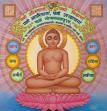
-599 Nebuchadnezzar II raids the Qedar region of Arabia. Births: Indian Lord Mahavira (Sans. "Great Hero") (Vardhamana) (d. -527), AKA Vardhamana (Sans. "increasing") ( for bring prosperity to the kingdom while still in the womb) on Apr. 12 (13th day of the rising moon of Chaitra) in Kundalpur, Vaishali (modern-day Bihar, India); son of King Siddartha and Queen Trishala; founder of Jainism; the 24th and last Tirthankara ("fordmaker"), who founds a Jain Tirth (community) that acts as a ford across the river of human misery.
-598 Wicked king Jehoiakim, who had withheld the laborers' wages after building a new palace, and who had ordered the prophet Urijah captured in Egypt, then brought back and killed, rebels in his 3rd year of vassalage to Nebuchadnezzar II, causing the latter to begin sieging Jerusalem.
-597 On Mar. 16 after receiving Jeremiah's prophesied doom, the burial of a he-ass (Jer. 22:13-19), Judean king Jehoiakim loses Jehovah's protection, allowing the Babylonians under Nebuchadnezzar II sieging Jerusalem to capture it on the 2nd day of the Jewish month of Adar, and begin deporting the Jews, along with Jehoiakim (bound in fetters) (2 Chron. 36:6), and the future prophet Ezekiel to Babylon (2 Ki. 24:11-16, Jer: 22:24-27, 24:1, 27:19-20, 29:1-2), taking "part of the vessels of the house of the Lord... and put them in his palace in Babylon" (2 Chron. 36:7); Jehoiachin's 8-y.-o. son (by mother Nehushta) Jehoiachin (Jeconiah) (Coniah) (Heb. "Jehovah firmly establishes") succeeds him as king of Judah, but his reign lasts only 3 mo. 10 days. after "he did what was evil in the sight of the Lord, and in the spring Nebuchadnezzar sent and brought him to Babylon with the precious vessels of the house of Jehovah" (2 Chron. 36:9-10); Nebuchadnezzar then makes 21-y.-o. Mattaniah the new king of Judah under the name Zedekiah (Heb. "Jehovah is righteousness"), and he reigns 11 years in Jerusalem as a puppet; (guess what?) "He did what was evil in the sight of the Lord his God, and did not humble himself before Jeremiah the prophet... he also rebelled against Nebuchadnezzar, who had made him swear by God... all the leading priests and the people likewise were exceedingly unfaithful, following all the abominations of the nations, and they polluted the house of the Lord which he had hallowed in Jerusalem" (2 Chron. 36:12-14), causing "the wrath of the Lord to rise against his people, till there was no remedy" (2 Chron. 36:16), resulting in him eventually ordering the king of the Chaldeans to wipe out his own temple in Jerusalem (Jewish First Temple) to punish them for 70 years (2 Chron. 17-21).
-596 The 46th Olympiad.


-595 Nebuchadnezzar II conquers all of Phoenicia except Tyre; his army suffers serious losses while quelling a revolt. Come on and safari with meroe? Necho II dies, and his son Psamtik (Psammetichus) (Psammeticus) II Neb-Ib-Re ("Beautiful is the heart of Ra") (d. -589) becomes king #3 of the Egyptian 26th Dynasty, going on to lead an expedition into Nubia in year 3 of his reign, reaching the 3rd or 4th Cataract and inflicting a heavy defeat on the kingdom of Kush, which loses its power to threaten Egypt, capturing Napata and forcing King Aspelta to move the capital S to Meroe (MeroŽ) near the 6th Cataract, founding the Kingdom of MeroŽ (Meroe) (ends 350 C.E.), with a pop. of 500K which worships the god Amun in the form of lion god Apedemak ("Lord of Royal Power"), and develops a unique building style; the rulers continue to be buried at Napata; too bad, Psamtik II fails to pursue them and retreats back to the First Cataract, leaving Elephantine as the S border of Egypt, contenting himself with defacing the monuments left by the Egyptian 25th Dynasty Kushite kings. Solon the Wise (-638 to -558) is elected sole ruler (archon) of Athens, with special legislative powers to quiet civil unrest caused by the introduction of coined money and debt slavery. The First Sacred War (ends -585) begins when the fortified city of Kirrha (Cirrha) (Crisa) (N of the Gulf of Corinth) causes a crisis by levying tolls on visitors to the sacred Shrine of Apollo on Delphi, causing the Amphictyony of Anthela led by Thessaly to form the Amphictyonic League along with Sicyon and Athens and declare war.

-593 Anlamani dies, and Aspelta (d. -568) becomes king of the Kushite kingdom of Napata.


-592 The 47th Olympiad. On July 13 Jewish prophet Ezekiel is allegedly called by Jehovah in Babylon to warn the pesky Jews to repent before it's too late, which they don't, causing him to lower the boom in -587/-586; he writes the Book of Ezekiel, ch. 1 of which describes a Heavenly Chariot/Throne (Merkabah) (1:16), which sends true believers into tizzies ever after, incl. those who think it's really spaceships: "The appearance of the wheels and their work was like unto the colour of a beryl: and they four had one likeness: and their appearance and their work was as it were a wheel in the middle of a wheel"; in 1974 C.E. NASA engineer Josef F. Blumrich (1913-2002) pub. the book The Spaceships of Ezekiel, claiming it was a real spaceship. Solon is appointed "reformer of the constitution", and both pleases and pisses-off the voters by cancelling debts with his Seisachtheia (Gr. "shaking off of burdens"), which bans debt slavery and frees all debt slaves, and redeems those sold abroad at state expense; he replaces Draco's Laws with new ones less draconian (except for homicide), and creates the heliae, a popular court to which citizens can appeal decisions of magistrates.

-591 Pstamtik II of Egypt invades Palestine "to foment a general Levantine revolt against the Babylonians" incl. by King Zedekiah of Judah. The Lydians (allies of the Spartans), and the Medes, dominated by Cyrus ("Sun", "throne") II the Great (Elder) (-600 to -529) of Persis (modern-day Pars), Persia, leader of the Persian People ("from Persis") begin a 5-year war in Asia Minor (ends -586). Esh-Baal (Ittobaal) III (d. -573) becomes king of Tyre (until -573). Solon creates a Council (Boule) of 400, with 100 nobles from each tribe, which can propose laws to the assembly (ecclesia), and now elects all the magistrates but can only accept or reject the proposals of the Areopagus (Gr. "Mars Hill") (Boule on the Areopagus) aristocratic council, consisting of four classes of citizens based on wealth, the Pentacosiomedimni (500 medimni or measures or bushels of grain, wine or olive oil a year), the Hippeis (300 medimni plus a war horse), the Zeugitae (Teamsters) (200 medimni plus a yoke of oxen), and the Thetes (no medimni); the top three classes supply the army, and the 4th rows the triremes and can take part in the assembly and serve on jury duty.
-590 Alyattes of Lydia begins a 5-year war with Cyaxares of Media (ends -585). Tyrant Periander of Corinth arbitrates the Athenian-Mytilene War (begun -600) in Athens' favor. Eurycratidas dies, and his son Leon (Gr. "lion") (d. -560) becomes Agiad king #14 of Sparta, fighting to a draw with Tegea. Solon leaves Athens for 10 years to travel around the Mediterranean, leaving Athens to break out into factional fighting between the pediakoi (rich aristocrats of the plain) led by Lycurgus, and the paralioi (merchants and craftsmen) led by Megacles the Alcmaeonid.


-589 On Jan. 27 B.C.E. (Tebeth 10) after Judah's vassal king Zedekiah revolts against Babylon and enters into an alliance with Egyptian pharaoh Hophra, the Babylonians under king (since -605) Nebuchadnezzar II (-634 to -562) begin their 18-mo. (30-mo.?) Final Siege of Jerusalem, releasing Hebrew slaves on Sept. 29 (Tishri 1) at the beginning of the Hebrew Sabbatical year, then starving the pop. into submission. In Feb. Pstamtik II dies, and his son Apries (Wahibre Haaibre) (Waphres) (d. -570) (Hophra in Jer. 44:30) becomes king #4 of the Egyptian 26th Dynasty (until -570), going on to build the Palace of Apries in Memphis, along with temples at Athribis (Tell Atribis), Sais, and Bahariya Oasis. Anacharsis, brother of Scythian king Saulis becomes an envoy in Athens, becoming known for "Scythian eloquence"; "In Greece wise men speak and fools decide."
-588 The 48th Olympiad. In Oct. after King Zedekiah allies with Egyptian Pharaoh Apries, who sends an army to protect Jerusalem, Nebuchadnezzar II lifts the siege of Jerusalem until he defeats them next Apr. in Phoenicia. Philip I dies, and Aeropos I Argaead (d. -568) becomes king of Macedonia. Traditional date of the Revelation of Zoroaster (Zarathustra), by Zoroaster (Zarathustra) (-660 to -583), a Median religious reformer who got the goods from Thirta, who got it from King Fiedoon, who got it from King Jamshid, who got it from Homa; later Zoroaster's son-in-law Jamaspa writes it down in the Zend Avesta, which incl. the Visperad (Visperad) ("Worship"), describing religious rituals, and Vendidad ("Given Against the Demons"), an ecclesiastical code, which mentions 16 perfect lands of Ahura Mazda incl. Airyanem Vaejah (Ariana Vaeja), ("expanse of the Aryans"), the original homeland of Iranians; Zoroaster introduces monotheistic semi-dualistic (Light v. Dark) Zoroastrianism (Zarathustraism) (Mazdaism) (Magianism) to the Medes and Persians, banning animal sacrifice and the use of intoxicants, introducing the idea of individual salvation through the freewill choice of Ahura Mazda (Good) over Ahriman (Angro-Mainyu) (Evil), and introducing the Zoroastrian Eschatology, where Time will end and the Universe will be cosmically renovated; the priests come from the Median tribe of Magi.
-587 On Apr. 29 (Nisan 7) after defeating the Egyptians Nebuchadnezzar II heads for Jerusalem, breaching the wall on July 29 (Tammuz 9) and capturing Zedekiah after completing his 11th reignal year) attempting to escape on the plains of Jericho, who is brought to Big Neb blindfolded (2 Ki. 25:2-8), then retires to Riblah "in the land of Hamath", leaving the siege to his chief bodyguard Nebuzaradan ("Nebo has given offspring") (2 Ki. 25:8-12), who comes to Jerusalem 1 mo. later (Aug. 25) (Ab 7); on Aug. 28 (10 Ab) the Babylonians enter Jerusalem, wreck the wall, and loot the Temple of Jehovah (Solomon) (2 Ki. 25:8-20, Jer. 39:8-10, 43:5-6, 2 Chron.); the Ark of the Covenant is not there (captured by Pharaoh Shishak, or given by Solomon to the Queen of Sheba's son Menelik?); they capture and blind King Zedekiah, slaughter "all the nobles of Judah" (Jer. 39:1-8), and take the remainder of the pathetic Jews into the Babylonian Captivity, allowing some of the lowliest ones to remain; on the 10th day of Ab Nebuzaradan inspects and then burns the temple (on the same day that the rebuilt temple is burned in 70 C.E.) (the Jews commemorate the 7th day of Ab with a fast, and also celebrate the 9th day of Ab, or Tishbah b'Ab); Nebuzaradan releases the prophet Jeremiah from the nasty old cistern where he had been thrown by royal princes Gemariah, Jucal (Jehucal) et al., gives him supplies, and appoints Gedaliah as gov. over those remaining (2 Ki. 25:22, Jer. 39:11-14, 40:1-7, 41:10); the kingdom of Judah ceases to exist, becoming a province of Babylonia, and never again does a king rule in Jerusalem; in 2005 Israeli archaeologist Eilat Mazar et al. find a .04-in. clay seal on the site of the palace which reads "Belonging to Yehuchal son of Shelemiyahu son of Shovi"; another seal contains the name Gemariah, son of Shaphan, the 1st royal minister, Yehuchal being 2nd.

-586 Nebuchadnezzar II begins a siege of the pesky island city of Tyre under Esh-Baal III, which alone of all Phoenician city-states continues to maintain its independence (ends -573). Egyptian Pharaoh Apries gets his sister (daughter of Psamtik II and Takhuit) Ankhnesneferibre (d. -525) adopted as the wife of Amun in Thebes; meanwhle his big D in Judah causes a mutiny of his garrison in Awan, which he puts down.
-585 On May 28 after a battle near the Halys River, the Eclipse of Thales, predicted by Thales of Miletus causes a sudden end to the 5-year war between the Lydians and Medes for fear of displasing the gods, resulting in a treaty; Alyattes' daughter marries Astyages, son of Median king Cyaxares, who dies. The First Sacred War (begun -595) ends after the Amphictyonic League defeats and demolishes Crisa; the Amphictyony takes over the admin. of Delphi and moves its HQ there, and admits Athens and the Peloponnesian Dorians as members; the Pythian Games in Aug.-Sept. in honor of Apollo (for killing the dragon Python, who emerged from the slime left on Earth after the Great Flood, and lived in a cave on Mt. Parnassus, after which he is called Pythius Apollo, founding the Pythian Games at Pytho, later called Delphi) are changed to include music, art and athletics contests, incl. horse racing in the Crisaean plain below Delphi, with a wreath of laurel as prize (ends 4th cent. C.E.). Periander, tyrant of Corinth dies, and his nephew (son of Gordias) Psammetichus (d. -582) (named after the Egyptian pharaoh?) becomes the 3rd tyrant of Corinth. Zhou Ding Wang dies, and Zhou Jian Wang (d. -571) becomes Dong Zhou king #10 of China. Ammiyitha (d. -570) founds the Kingdom of Kaminahu in S Arabia (Yemen) (ends -140). Births: Greek philosopher Anaximenes of Miletus (d. -528); student of Anaximander, and Mr. Air Is the Source of All Things (arche). Deaths: Japanese Yamato emperor #1 (-660 to -585) Jimmu on Mar. 11.

-584 The 49th Olympiad. Astyages (Arshit-vega) (d. -550), son of Cyaxares becomes Media King, er, king of the Medes (Media), and declares war on the Urartians under Rusa IV, destroying their capital of Rusahinili.
-583 Nafpaktos (Lepanto), "the jewel of the Corinthian Gulf" is destroyed by earthquakes. Teia Tephi goes to Ireland with Jeremiah the Bible prophet, bringing the Stone of Scone, AKA Beth-El (House of God) - making the Scots the lost tribes of the Jews? Jimmu's son Tagashimimi tries to seize the Japanese throne, but is overthrown by his youngest brother Kamuyaimimi no Mikoto. About this time the Judeo-Christian legend of Satan begins as the Hebrews and the Babylonians attempt to mix like oil and water. About this time "Weeping Prophet "Book of Jeremiah? Deaths: Persian thus-spracher Zoroaster (b. -660).
-582 Nebuchadnezzar II takes more Jews into exile after they flee to surrounding territories. Psammetichus, tyrant of Corinth is murdered, and oligarchic govt. is reestablished - three tichs and you're out? Acragas (Akragas) (Agrigentum) (modern-day Girgenti) on Mt. Camicus in S Sicily is founded by Greeks from Gela, becoming the #2 city after Syracuse, building great temples in the Valley of the Temples. Births: Greek lyric poet Anacreon (d. -485) in Teos (Asia Minor).
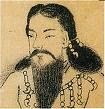
-581 Suizei (-632 to -549), 3rd son of Jimmu becomes Yamato emperor #2 of Japan (until -549).
-580 The 50th Olympiad. In the spring the biannual (1st and 3rd years of the Olympiad) Isthmian Games at the Temple of Poseidon in Corinth are founded. Malchus becomes king of Carthage (until -550), who goes on to conquer almost all of Sicily. About this time the Spartans under Pentathlus attempt to colonize W Sicily, and are defeated by the Elymians and Carthaginians. Births: Greek philosopher-mathematician Pythagoras of Samos (d. -497) in Samos, Ionia; pupil of Anaximander, going for the air or ether is the arche theory.
-578 Traditional date of the beginning of the reign of Roman Etruscan king Servius Tullius (d. -534) of Latin servile descent, the next-to-last Etruscan king of Rome, who frames a new Servian Constitution and enlarges the boundaries of the city of Rome; after the plebs begin acquiring wealth and property and get a bad disease of lust for powah, the Servian Reforms let them serve in the army, with rank based on wealth, and the army reorganized into five classes and 193 centuries based on wealth - did you get that memo?
-576 The 51st Olympiad.
-575 Hippocratidas dies, and Agasicles (d. -550) becomes Eurypontid king of Sparta. The Tegean War between Sparta and Tegea begins (-ends -555).
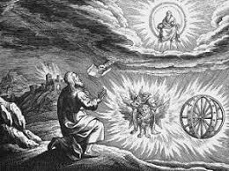
-574 On Apr. 10 Ezekiel's last of six oracles is recorded, about Ezekiel's Wheel, a wheel within a wheel, according to Ernst Kutsch - a UFO? Carthage becomes independent of Tyre.
-573 Nebuchadnezzar II conquers Tyre after a 13-year siege (begun -586), during which the heads of his soldiers are made bald from the chafing of their brain buckets (helmets), and their shoulders are rubbed bare from carrying construction materials; the city is put under Babylonian-dominated judges (sufetes) (until -564), starting with Baal (Baalu) II (d. -564).
-572 The 52nd Oympiad. The Neo-Babylonians conquer Damascus. Births: Greek Athenian Alcmaeonid statesman ("Father of Greek Democracy") Cleisthenes (Kleisthenes) (Clisthenes) (d. -485) in Athens; maternal grandson of tyrant Cleisthenes of Sicyon.
-571 Zhou Jian Wang dies, and Zhou Ling Wang (d. -544) becomes Dong Zhou king #11 of China.



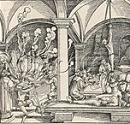
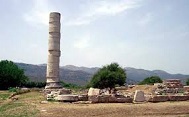
-570 After they begin invading Libya, Pharaoh Apries sends an army against the Dorian Greek city of Cyrene, and it is soundly defeated, the news causing a civil war to break out between native troops and foreign mercenaries, after which Apries flees, and gen. Ahmose (Amasis) II ("the Moon is born, son of Neith") (d. -526) (victorious gen. in the -592 Nubian invasion) becomes king #5 of the 26th Dynasty, and the last great pharaoh of Egypt before the Persians swallow it up. After turning his job of building a temple of Zeus Atabyrius in the citadel into an excuse to seize power, Phalaris (d. -554) becomes tyrant of Acragas (Agrigentum) in Sicily, ruling with an iron hand, building up, strengthening and providing water to the city, and pursuing imperialist expansion, going on to take over the whole island of Sicily, starting with Himera in the N; an epicure, he enjoys eating suckling babies; after brassmaker Perillos of Athens proposes it to him, Phalaris builds the brass Sicilian Bull (Bull of Phalaris), which he uses to roast criminals to death while a complex piping system turns their cries into the bellowing of a bull, while the fire is stoked with fragrant incense; after it is reopened, the scorched bones supposedly shine like jewels and are made into bracelets; guess who is the first victim, you guessed it, Perillos. Pisistratus (Peisistratos) (Peisistratus) (-605 to -527) of Athens (a relative of Solon) begins a war against the Megarians (ends -565), making him a military leader with political ambitions. Architecture: The Heraion of Samos, a temple of Hera is built in Samos by architect Rhoikos, lasting only a decade before being destroyed by an earthquake, becoming the first Ionic temple built in Ionia, the SW coast and islands of Asia Minor settled by Ionian Greeks, spreading to mainland Greece by the 5th cent. B.C.E. Inventions: About this time Greek philosopher Anaximander of Miletus (-610 to -546) constructs the first known geographical and star charts. About this time the Persians develops their own Persian Cuneiform, consisting of 36 mainly alphabetic characters and a word divider (ends -370). Births: Greek Ionian philosopher-theologian-poet (early monotheist) Xenophanes of Colophon (d. -470) in Colophon; spends most of his life traveling the Greek world; teacher of Zeno of Elea? Deaths: Greek lezzie poet Sappho (b. -630) in Mytilene (suicide by jumping off the Leucadian Cliffs for love of ferryman Phaon?); leaves 10K lines of poetry, which were preserved in Alexandria in 8 vols.; onl 650 lines survive.
-568 The 53rd Olympiad. Aeropos I dies, and Alketas (d. -540) becomes king of Macedonia. Deaths: Greek gen. Pittacus of Mytilene (b. -640).
-567 The Saites defeat another Babylonian invasion of Egypt led by ex-pharaoh Apries, who is KIA, and Ahmose II has his body buried in Sais with "full military honors", and marries his daughter Chedebnitjerbone II (Nitetis?) to legitimize his rule.
-566 The Panathenaic Games (Panathenaea) are founded in Athens, Greece, held every four years until the 3rd cent. C.E.
-565 Pisistratus conquers the island of Salamis from Megara, which boosts his political capital; he organizes the Diakrioi ("men of the hills"), a new party of small farmers, shepherds, artisans, and poor people based in the hill country of N Attica, competing with Solon's two factions of the Pediakoi ("men of the plains") and Paraloi ("men of the shore"), and begins a rise to powah in Attica.
-564 The 54th Olympiad. Baal II dies, and Yakin-Baal becomes the last independent king of Tyre; he is overthrown by an oligarchy, which sets up shoftim (judges), starting with Chelbes (d. -563).

-563 Chelbes dies, and Abbar (d. -562) becomes judge #2 of Tyre (until -562). Births: Indian sage Siddhartha (Sans. "siddha" + "artha" = achieved meaning) (d. -483) Prince Fo of the Sakya (Shakya) tribe of Kapilavastu and its Gautama (Gotama) clan (founded by Hindu philosopher Gautama in Lumbini, Shakya Repub. (Nepal); author of the Institutes of Gautama); later called the Buddha (Sans. "awake", "enlightened") (d. -483); before enlightenment under the Bodhi (Bo) Tree (a special old sacred fig tree of species ficus religiosa with heart-shaped leaves at the Mahabodhi Temple in Bodh Gaya, 62 mi. from Patna, Bihar, India) he is called Bodhisattva (Sans. "one destined for enlightenment").
-562 Nebuchadnezzar II dies, and his son Evil-Merodach (Amal-Marduk) (Amel-Marduk) (d. -560) (2 Ki. 25:27, Jer. 52:31) becomes king of Big Bad Babylon (until -560); the Jehovah's Witnesses insert a 20-year gap between the rule of this king and Nabonidus (-555). Abbar dies, and Mattan III and Ger Ashthari become judges #3 and #4 of Tyre (until -556).
-561 The first documented case of power of attorney is in Babylon between two brothers.
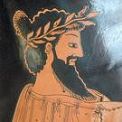

-560 The 55th Olympiad. About this time the earliest Hebrew scrolls of the Bible (Gr. "ta biblia" = little library) are written, backdated as far as 1,500 B.C.E.?; "40 independent authors, representing 20 occupations, living in 10 countries during a 1,500-year span, working in three languages, with a cast of 2,930 characters in 1,551 places... This massive volume covers every conceivable subject, expressed in all literary forms - prose, poetry, romance, mystery, biography, science and history" (Terry Hall); the Jewish identity is formed around this little library of books - the hardest years, the darkest years, the wildest years, the hottest years? Alyatttes dies, and the enormous tumulus Tomb of Alyattes is erected for him in Sardis; his son Croesus (d. -546) becomes king of Lydia, becoming known for his great wealth, going on to subjugate the Greek Ionian colonies and Bithynia, controlling all of Asia Minor W of the Halys River except Cilicia and Lycia, bringing Lydia to its apex; pure gold coins are minted by him for the first time; his gold refining workshop at his capital of Sardis is uncovered in 1964-8 by a team of Harvard and Cornell U. archaeologists led by Russian-born George Maxim Anossov Hanfmann (1911-86) and Albert Henry Detweiler (1906-70). Pisistratus seizes the Acropolis, expels Megacles and the rich aristocratic Alcmaeonids from Athens (until -554), and is elected ruler of Athens, becoming a people's choice best in show tyrant, founding the Peisistratid Tyranny (ends -510), which becomes known for founding great festivals. Evil-Marodach is murdered by his sister's husband, and his son-in-law Neriglissar (Nergal-Shar-Usur) (d. -556) becomes king of Babylon (until -556). Leon dies, and Anaxandridas II (d. -520) becomes Agiad king of Sparta. About this time Corsica is colonized by Greek (Phocaeans) from Ionia. About this time Heraclea Pontica at the mouth of the Lycus River on the coast of Bithynia in Asia Minor is founded by the Greek city-state of Megara, and named after Heracles (Hercules), who they believe entered the underworld at a cave on the adjoining Archerusian Promontory on Cape Baba; the city subjugates the native Mariandynians and agrees not to sell them into slavery outside their homeland, and extends its control along the coast E to Cytorus, going on the found Black Sea colonies in Cytorus, Callatis, and Chersonesus; the city is broken by the Mitridatic Wars (-88 to -63). Nonfiction: The two Books of Kings cover Jewish history from Solomon (970 B.C.E.) through this year. Deaths: Greek fable king Aesop (b. -620) in Delphi (executed for embezzlement?): "God helps those who help themselves"; leaves Aesop's Fables (Aesopica), which are first pub. in Greek about -300 by Demetrius Phalerus, and in Latin about -25 by Phaedrus; incl. The Fox and the Grapes, The Tortoise and the Hare, The North Wind and the Sun, and The Boy Who Cried Wolf.
-559 Persian King Cambyses I, son and successor of Teispes marries the daughter of Median king Astyages, and his son Cyrus II the Great becomes a cmdr. in the Median army.
-558 Pisistratus is reelected ruler of Athens. Deaths: Athenian lawmaker Solon (b. -638); leaves the Story of Atlantis, picked up in the Egyptian city of Sais from the priests, about an island off the Pillars of Hercules (Heracles) that was populated by a golden race, but went bad and began attacking Egypt, and was saved by the Athenians, after which it was destroyed by earthquakes and floods, and was swallowed up in one day and night; too bad, he says this happened 9K years ago, not 900 when the volcanic island of Thera (Santorini) exploded: "Before he dies, call no man happy - he is at best but fortunate."
-557 The Qi kingdom eliminates the Lai Yi.


-556 The 56th Olympiad. Cambyses I dies, and his son Cyrus II the Great (d. -529) becomes king of Persia, and builds his capital of Pasargadae near modern-day Shiraz in SC Iran (50 mi. N of Persepolis). Neriglissar dies, and his son Labashi-Marduk becomes king of Babylon, but reigns only 3 mo. before being killed by his friends, who elevate grass-eating Nabonidus (Nabu-Na'id) (d. -539) in his place next year. Baal-Eser III (d. -555) becomes judge #5 (last) of Tyre (until -555). Births: Greek lyric poet (inventor of the Memory Palace) Simonides of Keos (Ceos) (d. -468) on Keos (Ceos).
-555 Sparta defeats Tegea after a difficult war (begun -575), making it into a subject ally with nominal independence but obligated to supply troops and follow its foreign policy; Sparta creates the Peloponnesian League, an alliance which eventually incl. all the states in the peninsula except Achaea and Argos; each member contributes two-thirds of its military forces in war under Spartan leadership, and has a vote in foreign policy decisions; Spartan King Anaxandridas II leads a campaign which overthrows the tyrant of Sicyon (Sikyon) (the big sicy?); Spartan politics are dominated by the ephors (chief magistrates), led by Cheilon. King Croesus of Lydia captures Ephesus, moving it from Mt. Pion to a level region to the E; he begins a major reconstruction of the Temple of Artemis (finished -430). Births: Athenian gen. Miltiades (d. -489); member of the prominent Philaid family. Deaths: Greek poet Stesichorus (b. -630).
-554 Megacles and the Alcmaeonids return and drive Pisistratus out of Athens (until -541), and Pediakoi (rich aristrocrat party) leader Lycurgus is elected ruler of Athens; Pisistratus goes to Euboea (Evvoia) off the E coast of Greece, and winds up in Thrace, where he gets rich from mining. Phalaris, tyrant of Acragas is overthrown by Telemachus, ancestor of tyrant Theron, and executed in his own brass Sicilian bull.
-553 Nabonidus conquers Edom. Cyrus II of Persia leads a revolt against his grandfather Astyages of Media (ends -549).
-552 The 57th Olympiad. Nabonidus conquers N Arabia and relocates to the oasis of Tema (Teima) in the Arabian desert SE of Edom, remaining there for 10 years while creating military and trade posts; his son Balshazzar (Balshezer) (Bel-Shar-Usur) (d. -539) rules as regent.

-551 The monarchy is restored, and Hiram III (d. -532) becomes king of Tyre (until -532). The period of the One Hundred Schools of Thought begins in China (ends -221), in which all the major schools of Chinese thought are founded - compare, bundle, and save? Inventions: The Diatonic Musical Scale is invented in Greece; Lasos of Hermione discovers that vibrations are the basis of sound. Births: Greek artist Exekias (d. -525) in Athens. Chinese sage ("Confucius Say") Confucius (K'ung Fu-tzu) (Fu-tse) (Kong Fuzi) (Master/Teacher Kong) (Kin Chung Ni) (d. -479) on Aug. 27 (Sept. 28) in Qufu.
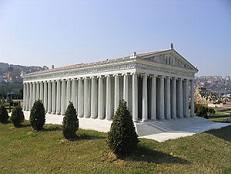
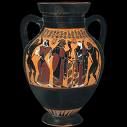
-550 Agasicles dies, and his son Ariston (d. -515) becomes Eurypontid king of Sparta. After open war breaks out between the Greeks and an alliance of the Etruscans and Carthaginians, the latter under Carthaginian king Malchus campaign successfully against the Greeks in Sicily; Mago founds a new dynasty that dominates Carthage until the 4th cent. B.C.E. Waqahil Yafush (d. -530) becomes king of Inabba in S Arabia. About this time the 12-16 Mahajanapadas ("great kingdoms") are founded in N India (ends -322). The city of Verona (Veronia) in the Po River Valley of N Italy is ceded by the Euganei ("well-born") to the Cenomani Gauls. About this time the city of Thebes in Boeotia in EC Greece (44 mi. NW of Athens), allegedly founded by Cadmus (Kadmos) (Gr. "from the east") (son of King Agenor of Tyre and brother of Europa, Phoenix, and Cilix, and inventor of the Phoenician alphabet) from troops created out of dragon teeth (while he ultimately turns into a serpent?) (causing its acropolis to be called Cadmeia) forms the Boeotian League and begins absorbing the smaller city-states around it, incl. Orchomenos (Orchomenus) to the NW (Lake Copeis), Thespiae, and 12 others (14 total), creating a major player between Attica on the S and Phocis on the W and NW. About this time the Seven Sages (Wise Men) of Greece (Greek Antiquity), with their "pithy and memorable dicta" posted on the wall of the Temple of Delphi as dedications to the god Apollo are retroactively created in a literary hall of fame: Solon (Gr. "wise") of Athens (-638 to -558) ("Nothing in excess"), Chilon (Chilo) of Sparta (-600s) ("Know thyself"), Thales of Miletus (-624 to -547) ("To bring surety brings ruin"), Bias of Priene (-600s) ("Too many workers spoil the work") ("Most men are bad"), Cleobulus (Cleobulos) of Lindos (-600s) ("Moderation is the chief good"), Pittacus of Mitylene (-640 to -568) ("Know thine opportunity"), Periander of Corinth (d. -587) ("Forethought in all things"); alternates incl. Myson of Chen (Chenae) (Khenai) (-600s) and Anacharsis (-600s) (from Scythia). Architecture: The Temple of Artemis (Diana) (Artemision) in Ephesus (Asia Minor) on the Ionian coast is begun by Lydian King Croesus and Greek Cretan architect Chersiphorn of Knossos and his son Metagenes, becoming one of the Seven Wonders of the Ancient World, evolving into the best little whorehouse in Asia Minor? - the original Charles and Diana? The Greeks build a temple of Athena and temple of Hera in Paestum in S Italy about this time. Art: The Painter of Berlin 1686 decorates vases and amphorae with the black figure technique in Athens. Births: Greek historian (1st) Hecataeus of Miletus (d. -476) (d. -490?) in Miletus; born to a wealthy father named Hagesandrus; named after the goddess Hecate; first to attempt to distinguish myth from historical fact, although he accepts Homer as an authority; first to use the term Celts. Greek gen. (victor of Marathon) Miltiades the Younger (d. -489); step-nephew of Militiades the Elder (d. -524).
-549 On May 10 emperor (since -581) Suizei (b. -632) dies, and Annei (-577 to -511) becomes Yamato emperor #3 of Japan (until -511). Median king Astyages loses the army and then Ecbatana, and is deposed and killed by his grandson Cyrus II the Great (d. -529), who becomes emperor of Persia and Media, founding the Achaemenid (Achaemenian) (First Persian) Dynasty (ends -330); he goes on to conquer Sogdiana in C Asia between the Jaxartes (Syr Darya) and Oxus (Amu Darya) Rivers. Births: Persian king (-522 to -485) Darius (Darayavaush) (Pers. "upholder of goku", "maintains possessions well") I Hystaspis (the Great) (the Lawgiver) (d. -485) (pr. dah-RYE-us); son of Hystapes; grandson of Arsames.
-548 The 58th Olympiad. King Croesus of Lydia defeats Cyrus II the Great at the Battle of Pteria in Cappadocia on the site of ancient Hatti - where are all these histrionics leading?
-547 Cyrus II the Great conquers Phrygia, then outmaneuvers, defeats and captures King Croesus of Lydia at Sardis, causing him to commit suicide next year, after which Lydian noble Pactyas takes the throne and continue resistance; according to Herodotus (Bk. 1), the Oracle of Delphi predicted that retribution for the crime of King Gyges would come in the 5th generation. Deaths: Greek philosopher Thales of Miletus (b. -624); leaves Thales' Theory of Geometry and Thales' Intercept Theorem, becoming the first true mathematician who discovers a mathematical theorem and uses deductive reasoning to derive corollaries (four); helps the Egyptians measure the height of the pyramids; predicts an eclipse.
-546 Midas couldn't take it with him? Pactyas of Lydia is defeated, ending the Phrygian Kingdom and Lydian Kingdom; Persia learns to mint gold coins from captured Lydians; Persia divides Asia Minor (pop. 4M, incl. 250K Greeks) into four satrapies: the coastal satrapy, consisting of Lydia (incl. Bithynia), Mysia and the W coast cities (incl. Ephesus), ruled from Sardis; Phrygia, extending to the Halys River, ruled from Daskylion; Cilicia, ruled from Adana; Cappadocia, ruled from Mazaca; the 1677 mi. Persian Royal Road connecting Sardis to Susa is built - Greece is next on the Persian menu? Deaths: Greek philosopher Anaximander of Miletus (b. -610).
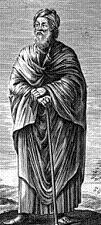
-545 About this time Greek philosopher-poet Xenophanes of Colophon (-570 to -470) leaves his home town of Colophon in Asia Minor and becomes a wandering poet-minstrel in Greece and Sicily, settling in Elea in S Italy in -536 for awhile and joining and/or co-founding (with Parmenides of Elea) the Eleatic School of Philosophy, which ridicules polytheism and pushes pantheism, dissing Homer for his anthropomorphic gods, with the famous soundbyte that if oxen could paint and sculpt they'd depict gods who look like oxen, espousing a belief in a supreme God that is non-mortal and eternal and doesn't intervene in human affairs; he reduces the world to the qualities of wet and dry (water and earth), dissing Anaximenes and his air theory by noting from his examination of fossils that water once covered the Earth, differentiating belief from knowledge; his pupil Parmenides of Elea (-515 to -445) carries on his work.
-544 The 59th Olympiad. Sparta and Argos fight the Battle of the 300 Champions, each side picking 300 hoplite champions to fight to the death to decide control of the plain; after neither side accepts the result, the armies go at it, and the Spartans win, reducing Argos' regional power - what did they have for breakfast? Zhou Ling Wang dies, and Zhou Jing Wang (d. -519) becomes Dong Zhou king #12 of China. Births: Chinese sage Sun Tzu (d. -496).
-541 Pisistratus defeats the aristocrats of Euboea with the help of Thebes and Argos, then lands at Marathon in Attica, and marches on Athens, while his partisans from the countryside swell his ranks, then defeats his opponents at the Battle of Pallene in Chalcidice, going back to being dictator of Athens until death (-527), while giving lip service to Solon's constitution for the best of both worlds; for 17 years he sets up a mini-golden age, having the first written ed. of Homer's poems prepared for recitation at the ramped-up annual festival of Panathenaea, and commissioning many classic bldgs., incl. the Lyceum and temples to Athens, Apollo and Zeus; a people-pleaser, he confiscates the lands of his opponents and distributes them to the hektemoroi ("sixth parters") (serfs), introducing the Boeotian-based Cult of Dionysus to reduce the power of the hereditary priesthoods of the aristocrats; he sends Miltiades to recover Sigeum at the entrance to the Hellespont and establish a tyranny over Thracian Chersonese (modern-day Gallipoli), which controls the passage between Europe and Asia; he "purifies" the big-deal (center of the Cyclades) island of Delos of an Ionian religious league to extend his control into the Cyclades; originally a floating island, Zeus (father of the gods) fastened Delos to the bottom of the sea so that his mother Leto, daughter of the Titan Coeus, whom his wife Hera was jealous of could have a safe haven to give birth to two more divine rugrats (equal to him?), Apollo (god of music, light and medicine) and Artemis (goddess of the moon and wildlife) - the good, the bad, and the ugly?

-540 The 60th Olympiad. Nabonidus returns from Arabia to fight the Persians; Gobryas, Babylonian gov. of Assyria deserts to the Persians; when the Persians attack, the people revolt against Nabonidus and he has them slaughtered; Sippar falls to the Persians without a fight, and Nabonidus flees. Alketas dies, and Amyntas I (d. -498) becomes king of Macedonia. Births: Greek dramatist-philosopher ("the Prince of Comedy" - Socrates) (first comic writer?) Epicharmus of Kos (Comicus) Syracusanus (d. -450).
-539 On Oct. 6 (Oct. 12?)(Oct. 29?) after strange Handwriting on the Wall, "Mene, Mene, Tekel, Upharsin (Parsin)" (Eenie Meenie You'll Tackle a Persian?) (Eenie Meenie Miney Moe, Listen Balshazzar, Out You Go?) allegedly appears on the wall of his court during a "great feast for a thousand lords" where he "drank wine in front of the thousand", overconfident Babylonian co-king (with Nabonidus) Balshazzar (Belshazzar) ("Bel, protect the king") ignores the "numbered, numbered, weighed and divided" interpretation of captive Jewish prophet Daniel that Jehovah has decided to have the Medes and Persians axe him, and yada yada yada (Daniel, Ch. 5; after diverting the Euphrates so it no longer can act as a big moat, Gobyrus and his warriors find the giant double-leaved main doors in the 300-ft.-high wall open, and enter party-pooped Babylon in the wee hours unopposed, then Cyrus II the Great's Medes and Persians (assisted by the Scythians) conquer it and level it by fire, incl. the Hanging Gardens (only burnt crumbs remain on the plate?); Nabonidus is captured and sent into exile; Balshazzar is KIA at the Battle of OpisN of Babylon on the Tigris River; Phoenicia is (bloodlessly?) absorbed into the Persian-Median Empire as the 5th satrapy, with admin. center at Tripolis, and vassal kings in Sidon, Tyre, Arvad, and Byblos; N Arabia is absorbed (until -331); the Persians rule Babylonia until -331; never again will Mesopotamia be an independent political entity?

-538 As one of his first acts after conquering Babylon last year, monotheist Zoroastrian Persian king Cyrus ("Sun", "throne") II the Great (-600 to -529) issues an edict (2 Chron. ch. 36) granting his exiled fellow monotheist subjects the Jews the right to return to Israel after 50 years of Babylonian captivity, contributing treasure to help rebuild the Temple of Jerusalem (Solomon); the Bible book of Isaiah Chap. 44 and Isaiah Chap. 45, allegedly written 200 years earlier predicts the capture of Babylon by Cyrus, the draining of the Euphrates (44:27), the gates being left open (45:1-2), and even calls him by name (45:1) and describes him as the Anointed (Messiah)?; 42K-50K (42,360?) Jews from the tribes of Judah and Benjamin return (the Aliyah of Zerubavel), settling in the Persian province of Yehud (Judea), but the majority stay (cooler summers?); the first wave of 1K young Jews is known as Sheshbazzar's Aliyah, the 2nd wave of 42,360 is known as Zerubbabel's Aliyah; the Karaites (Heb. "mikra" = scripture) migrate to the Crimea (Black Sea), where they later adopt Turkish customs and language but remain Jews, reject the rabbinical oral Torah, and never throw a Bible manuscript away (see 1859 C.E.); Jewish leader Mordecai is among the leaders of the returning Hebrews, but not necessarily the same Mordecai who is the cousin of Esther in Isfahan (Ezra 2:1-2, 2:5-7). The Persian Achaemenid Empire (founded in -550 by Cyrus II the Great) annexes Damascus (until -333).
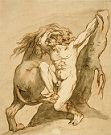

-536 The 61st Olympiad sees famous Greek athlete Milo of Croton (Crotona) (-552 to ?), who won the boys' wrestling event in the last Olympics win the men's wrestling event for the first of 5x, becoming the source of all kinds of manly stories, incl. training by carrying a newborn calf on his back every day and working up to a 4-y.-o. cow, or holding his arm out with fingers outstretched and challenging anyone to pull his finger, er, sorry, that's Babe Ruth, bend his little finger. Greek tragedian Thespis of Icaria invents Tragedy (Gr. "tragos" = goat, the sacred animal and symbol of wine god Dionysus AKA Bacchus) at the festival of the Greater Dionysia; it eventually develops the elements of Hamartia (fatal flaw, of which hubris is a favorite), Nemesis, and Catharsis - thespian jokes here?
-535 The Carthaginian-Etruscian alliance crushes the Phocaean Greek settlers from Corsica in the naval Battle of Alalia off the coast of Corsica. Theline in S France (Gaul) is captured by the Celtic Salyes (Salluvii) Tribe, who rename it Arelate (Arles), and occupy the plain S of the Druentia (Durance) River between the Rhone River and the Alps. Traditional date of the reign of Roman (Etruscan) king #7 (last) Lucius Tarquinius Superbus (AKA Tarquin the Proud) (d. -495) (rules until -509). Confucius gains a local govt. position, shows ability in the settling of disputes, and formulates the negative Golden Rule (Don't do to others what you wouldn't want them to do to you, or Watchit). Births: Greek philosopher ("Dark or Obscure Philosopher") (dark clothing) ("Weeping Philosopher") Heraclitus (d. -475) in Ephesus; Greek philosopher of the Logos, and Mr. Fire Is the Source of All Things; adds the concept of becoming to that of being, and holds virtue to consist in subordinating the individual to the laws of society, as long they are based on a universal and reasonable harmony.
-534 Massalia defeats Carthage, limiting Carthaginian influence in the NW Mediterranean. Gen. Darius Hystaspes (later King Darius I), a big fan of Ahura Mazda leads his Persian army across a floating bridge on the Bosporus Strait to subjugate the pesky Scythians. The city of Felsina (modern-day Bologna) in Italy at the foot of the Apennines (50 mi. NE of Florence in the Po River Valley between the Reno and Sevana Rivers) is founded by Etruscan colonists in an area previously inhabited by the farmer-shepherd Villanovians. Thespis introduces the first speaking actor into a tragedy.
-533 Gautama abandons his wife and newborn first son as they sleep, flees past the sleeping female minstrels, and rides off into the night to get enlightenment, becoming a yellow-robed shaved-head pauper with a begging bowl and a placard saying, "Ex-prince needs to eat too" - impotent at what age?
-532 The 62nd Olympiad.


-531 Deaths: Chinese philosopher Lao-Tzu (b. 604); dies after founding Taoism (Daoism); leaves the Tao Te Ching (Dao De Jing), which incl. worship of the blue-skinned bird-headed thunder god Lei Kung; "A journey of a thousand miles must begin with a single step"; "The greater the number of laws and enactments, the more thieves and robbers there will be."

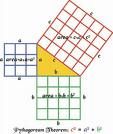



-530 Shut your pi hole and do your math homework? About this time after traveling to Egypt and learning the doctrines of the Egyptian priests, Greek Ionian philosopher (pupil of Anaximander, going for the air or ether is arche theory) Pythagoras (-580 to -497) is driven from Samos by tyrant Polycrates, and founds his mystical philosophical sect in Italy's Toe City Croton (Crotona), teaching reincarnation, numerology, and dietary restrictions (no beans), and gaining the support of superstar athlete Milo of Croton after claiming to be a reincarnation of Trojan War soldier Euphorbus; although he leaves no writings, his school discovers the Pythagorean Theorem and raises math to a science, considering Number to be the ultimate principle of the Universe, and believing the Earth to be a globe revolving with the planets (incl. the Sun) around a central fire, separated from each other by intervals corresponding to the harmonic lengths of strings, which play the Music (Harmony) of the spheres, with the incantation: "Ace choired plus bees choired e-quills seas choired"; Pythagoreans don't eat beans because they make bad music?; About this time Pisistratus founds the Festival of the Greater Dionysia in Athens, held at the end of Mar. each year to honor Dionysus Eleuthereus, who had been introduced to Athens by the village of Eleuterae; besides the usual parades and sacrifices, three tragic poets present tragedies on a single theme plus one satyr (burlesque) play, with a prize awarded to the best, after which a comedy competition is introduced in -486. Art: A fresco painted on the Tomb of the Augurs in Tarquinia shows how the Etruscans dress in dresses. The Monteleone Chariot is made by the Etruscans, and ends up in the New York Metropolitan Museum in modern times. Exekias (-551 to -525), Achilles and Ajax Playing Checkers (painted vase). Births: Greek Athenian statesman gen. Aristides the Just (d. -468). Greek Pythagorean philosopher Hippasus of Metapontum (d. -450) in Megapontum; discoverer of irrational numbers.
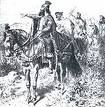

-529 Cyrus II the Great dies after conquering 2M sq. mi., incl. the Median Empire, Babylonia, Assyria, Syria, Palestine, the Indus Valley, and S Turkestan; he is succeeded by his cruel inhuman drunken son Cambyses (Kambujiya) II (d. -522) (Ahasuerus of the Bible) as king of Persia; the Tomb of Cyrus II in Pasargadae is built (discovered in 1951 C.E.).
-528 The 63rd Olympiad. Deaths: Greek philosopher Anaximenes of Miletus (b. -585) - he got jets and the girl?


-527 Confucius' mother dies, profoundly affecting him and causing him to resign his public office and mourn at her grave for the next 27 mo. - are all Confucians mamma's boys? Pisistratus (b. -605) dies, leaving sons Hippias (d. -490) (elder) (future traitor) and Hipparchus (d. -514) (younger), AKA the Pisistratidae, who are both elected tyrants of Athens (until -510). Deaths: Athenian tyrant Pisistratus (b. -605).
-526 Amasis III dies, and Psamtik (Pstamtek) III becomes king #6 (last) of the Egyptian 26th Dynasty, ruling for 6 mo. After seven years of searching for the cause of evil and suffering, Gautama sits down under a bo (pipal or sacred fig) tree (Ficus religiosa) at Gaya for 4-7 weeks, finally receiving enlightenment and becoming the Wise Bud Weiser, er, Buddha, and shaving his head in obedience to a divine command; his first speech in a holy park in Varanasi nets him five disciples, who also shave their heads (which definitely sets them apart from Jewish priests, who are commanded not to shave their heads in Lev. 21:5) - tastes great, less filling, beechwood-aged Shaved Bud?
-525 In May after Cambyses II kills his brother Smerdis (Bardiya) to ensure the throne of Persia, but makes a big mistake by keeping it secret, then leads a campaign to capture Egypt, the last remaining independent kingdom in the East, which is just too sexy for him to pass up, he defeats the Egyptians at the Battle of Pelusium, causing them to retreat to Memphis and surrender after a siege; Cambyses II gets on his horse before Peluseum and tosses cats (their sacred animal) into the air to taunt them (were they those Egyptian Mau cats with gooseberry green eyes?); Psamtik III is captured and carried off in chains to Susa to be executed; Egypt down to but not incl. Meroe is conquered by the Achaemenid Persians, who destroy many Egyptian temples and establish the get-down Twenty-Seventh (XXVII) (27th) Dynasty (First Egyptian Satrapy), which rules Egypt with an iron hand as a satrapy (until -404), beginning the First Persian Occupation (ends -404); foreigners dominate Egypt for the next 2.5K years (until 1952); an unsuccessful attempt is made to conquer the Kushite kingdom of Meroe at the Sixth Cataract; too bad, a sandstorm in the W Egyptian desert buries 50K Persian warriors sent to attack the oasis of Siwa and destroy the oracle at the Temple of Amun, whose priests refuse to accept his claims to rule Egypt; their remains are found in 2010; they really were ambushed and defeated by Egyptian rebel leader Petubastis III?; the same oracle later confirms that Alexander the Great is the divine son of Zeus (Amun) in -332. Cleisthenes (-572 to -485) becomes chief archon of Athens. Births: Greek tragedian ("Father of Greek Tragedy") Aeschylus (d. -456) in Eleusis.
-524 The 64th Olympiad. Miltiades succeeds his uncle as ruler of Chersonesus Thracia (modern Gallipoli). The Spartans support an unsuccessful attempt to overthrow Polycrates, tyrant of Samos, and go on to work for the overthrow of any and all other tyrants within their reach (until -510). Cumae in S Italy is attacked by a coalition of Etruscans and other tribes, and Syracuse helps Cumae throw them off, but at the expense of becoming dependent on them. Confucius breaks off his mourning, leaves his wife and son, and becomes a traveling teacher journeying through China - this child is not coming anywhere near me with anything sharp?
-523 Cambyses II abandons plans to attack Carthage after his Phoenician mariners refuse to fight their brothers - without love where would you what?

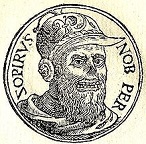

-522 After Sparta deposes the tyrant of Naxos, the Magian (Persian subject people) Artaxerxes (Bardiya) (Gaumata), claiming to be Cambyses II's brother Bardiya (who nobody knows is dead except Cambyses II) claims the throne for 7 mo., until the news reaches the real Cambyses II, pissing him off and causing him to gather his army in Egypt and head for Persia; too bad, he dies in the summer while camped in Syria either by suicide or by an accident while mounting a saddle; in Oct. Nebuchadrezzar III (Nabu-Kudduri-Usur) (real name Nidintu-Bel), claiming to be the son of Nabonidus seizes the Babylonian throne until Dec., when Gen. Darius (Darayavaush) I the Great (-549 to -485) defeats him on the Tigris River; meanwhile Gaumata is executed by six nobles in Nisaia in Media, then allegedly receives a favorable oracle declaring him king and assumes the throne (even though he is from another branch of the Achaemenid family, and his father and grandfather are still alive); meanwhile 4 days later revolts begin in Assina in Elam and Nidintu-Bel in Babylon, spreading to Persia itself after Vahyazdata, another Bardiya pretender pops up, causing Darius I to marry Cambyses' wife-sister Atossa to solidify his claim, then win 19 battles in one year to solidy his reign, after which he goes on to reorganize the admin. and establish the first (20) Persian satrapies, and codify the laws for the sprawling empire of 20 countries, which eventually incl. the former realms of the Egyptians, Chaldeans, Ionians, Persians, and Medes, and stretches from the Mediterranean to the Indus Valley, and S into Africa (Libya), becoming the largest ever, with a pop. of 15M-16M, incl. 4M in Persia; royal residences are at Susa (at the E end of the Persian Royal Road, which runs through Gugamela and Harran to Sardis in Lydia), Persepolis (in S Persia 200 mi. SE of Susa), Ecbatana (100 mi. N of Susa) and Babylon (100 mi. W of Susa); Armenia is the 13th Persian satrapy; he introduces a standard gold coinage, the Achaemenid Daric to go with the silver Siglos, becomes the first emperor in Europe, trying to portray himself as backed by God, protecting the weak and meting out justice; Darius I brings Egypt under his rule, and order the finishing of the canal linking the Nile River at Bubastis with Suez, allowing his ships to sail through the Red Sea by Saba to Persia, making it wide enough for two triremes to pass each other with extended oars, with a 4-day time of passage (cry me a river?); Darius I orders the construction of the new capital city of Persepolis in the S Zagros Mts. in SW Persia (NE of modern-day Shiraz); he erects the Behistun Rock, a commemoration of his achievements in three parallel sets of Old Persian, Elamite, and Akkadian cuneiform (413 lines), placed prominently on the way into the city, harping about his being the lawgiver and justice dispenser, and portraying him holding a bow (symbol of wisdom and strength), becoming the first political billboard and political logo?; in modern times it becomes the Rosetta Stone for cuneiform. After Babylon revolts against Darius I, Persian nobleman Zopyrus defaces his face, has himself whipped, and with Darius I's approval goes to Babylon and palms himself off as an abused deserter-exile, rising to CIC of the army, allowing him to set the city up for reconquering by Darius I, receiving honors and getting created a satrap.
-521 In Aug. Nebuchadrezzar IV (Nabu-Kudduri-Usur) (real name Arakha), an Urartian claiming to be the son of Nabonidus seizes the Babylonian throne and rules until Nov. before being defeated and impaled - he tried to grab the southwest by the bottle?

-520 The 65th Olympiad. The building of the Jewish Second Temple in Jerusalem begins in earnest under Jewish prophets Haggai and Zechariah, working with Jerusalem gov. Zerubbabel and high priest Yeshua (Joshua) (yes, Jesus); local opponents petition Darius I the Great to have the work stopped (Ezra ch. 5-6), but Darius responds with a decree calling on his imperial officials to support the work based on Cyrus' earlier royal decree, which can never be revoked. Carthaginian seaman Hanno of Carthage explores the W coast of Africa with a fleet of 60 ships, sailing through the Straits of Gibraltar and founding seven colonies in Morocco, visiting modern-day Sierra Leone, and finding the natives hirsute and savage, capturing three females who are so ferocious that they have to be killed, their skins preserved and kept in the Temple of Tannit, surviving until the Romans destroy Carthage in 146 B.C.E.; they call the people "Gorillae", causing 19th cent. Euro explorers to name man-sized apes after them. Anaxandridas II dies, and Cleomenes I (d. -490) becomes Agiad king of Sparta, reasserting royal power and bringing the Peloponnesian League to its zenith. About this time an Attic black-figure Amphora of Aeneas and Anchises is created, showing Aeneas carrying his father Anchises from the ruins of Troy. Haggai (Heb. "festal") writes The Book of Haggai about this time? Births: Spartan Agiad king #17 Leonidas I (Gr. "lion-like") (d. -480); son of Anaxandridas II (d. -525).
-519 Plataea (in S Boeotia on the border with Attica) refuses to join the Boeotian League of Thebes, causing the Athenians to come to their aid, while Euboea allies with Thebes, starting a war (ends -506). Zhou Jing Wang dies, and Zhou Jing Wang (d. -476) becomes Dong Zhou king #13 of China. The Behistun Inscription of Darius I is created, mentioning Armenia as being under Persian rule (until -330). Births: Roman model aristocrat Lucius Quinctius Cincinnatus (Lat. "curly hair") (d. -430).

-518 Darius I orders the construction of the Great Palace of Persepolis, which is finished by Xerxes I and features a wide staircase leading to the apadana (audience hall) decorated with carved reliefs of subject peoples bringing tribute. Zechariah writes the The Book of Zechariah about this time? Births: Greek lyric poet Pindar (d. -442) in Cynoscephalae (near Thebes); of the aristocratic far-flung (Sparta, Thera, Cyrene) Aegeidae family; loses a poetry contest with Corinna of Boeotia, who advises him to "sow with the hand not with the whole sack"; is fined by the Thebans for the line "O splendid, violet-crowned, glorious Athens, famed in song, pillar of Hellas, city divine", causing the Athenians to compensate him, and Alexander the Great to spare his house when he sacks Thebes in -338.
-517 Milo of Crotona compiles a Training Log. :)
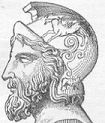
-516 The 66th Olympiad. Militiades the Younger (-550 to -489) seizes the Thracian Chersonese and becomes tyrant - is your makeup showing, guess what, those days are over? Architecture: Construction of the Jewish Second Temple is completed during the reign of Persian Achaemenid king #3 (-522 to -486) Darius I the Great (-550 to -486), 70 years after the destruction of the First Temple; Jehovah comes back to the holy of holies inside the new-improved Golden Arches, and the holy barbecuing resumes?; Aramaic, the language of the Aramean internat. land traders becomes the universal language of the civilized Western world by the time of Darius I the Great.
-515 Ariston dies, and Demaratus (d. -491) becomes Eurypontid king of Sparta. He Lu becomes the Duke of Wu. About this time (July -518?) Scylax of Caryanda, a Greek in the Persian navy is sent by Darius I to explore the coastlines of India and Egypt, spending 30 mo. and helping Darius I conquer the Indus River Valley. The city of Benghazi (Bengasi) is founded on the N African coast (modern-day Libya) by citizens of Cyrenaica (modern-day pop. 650K). Art: About this time the Euphronios (Sarpedon) Krater (one of 27 vases by Euphronius to survive to modern times, and the only undamaged one) is placed in an Etruscan tomb, and stolen in modern times, then smuggled out of Italy, where it ends up in the Metropolitan Museum of Art in New York City; in Feb. 2006 the museum agrees to return it to Italy in return for loans of other antiquities.
Births: Greek philosopher Parmenides of Elea (d. -445) in Elea, S Italy; co-founder (with Xenophanes) of the Eleatic School, which considers the real to be motionless, and distinguishes between belief and knowledge, influencing Plato.-514 Athenian aristocrats Harmodius and Aristogeiton attempt to assassinate tyrants Hippias and Hipparchus, but screw up and don't take out Hippias, causing him to become more tyrannical, imposing oppressive taxes, selling public offices, and executing anybody he suspects; the Alcmaeonidae (suspected plotters) flee from Athens, incl. poet Simonides of Keos (Ceos) (-556 to -468), who attaches himself to the ruling families of Thessaly, the Scopadae and Aleuadae, later returning to Athens and sucking up by lauding the Greek heroes of the Persian War. Births: Athenian gen., adm. and statesman Themistocles (d. -462).
-513 Miltiades accompanies Darius I on a Persian expedition against the Scythians, leading to an expansion into Europe.
-512 The 67th Olympiad. Darius I retreats to Sardis after being unable to force a decisive battle against the Scythians, then leads a great army across the Bosporus, subjugating E Thrace, getting Macedonia to submit voluntarily and making King Amyntas I a Persian vassal, then invading the Balkans and crossing the Danube River in order to pacify the nomadic tribes, making it to the steppes of the Ukraine (the Volga River, according to Herodotus) before satisfying himself that he has pacified the Wild West side of his empire. The Persians siege the Greek colony of Barcus in N Africa, tunneling under the city walls and intending to start an underground fire until the Greeks use a bronze shield placed on the ground to locate the tunnel, dig their own, and surprise the Persians, becoming the first known use of a speaker? With the help of Sun Tzu, He Lu eliminates the kingdom of Xu.
-511 A Crotonian army commanded by Olympic star Milo of Croton defeats the Sybarites; Milo dresses like Hercules in a lion's skin with a club. Phrynichus, a disciple of Thespis wins his first V in tragedy at the Greater Dionysia. On Dec. 6 emperor (since -549) Annei (b. -577) dies, and Itoku (-533 to -477) becomes Yamato emperor #4 of Japan (until -477). Deaths: Japanese Yamato emperor #3 (-549 to -511) Annei of Yamato on Dec. 6.
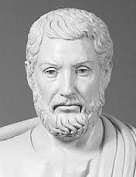


-510 Hippias of Athens (last Athenian tyrant) is overthrown by the Alcmaeonidae allied with the Spartans, and goes into exile along with his relatives at the court of Darius I of Persia, trying to talk him into invading Greece; the aristocrats, led by Isagoras are overthrown by the common people, headed by Athenian Alcmaeonid Cleisthenes (-572 to -485), who institutes a dem. reform of the constitution, making citizenship independent of clan, which shocks Spartan Agiad King Cleomenes I, who wants a pro-Spartan oligarchy, causing him to lead an expedition into Attica, which is foiled by fellow Spartan (Eurypontid) king Demaratus, compounded by the defection of Corinth; the Greek Archaic Period (begun -800) ends, and the Classical Age of Greece begins (ends -323), with Cleisthenes becoming known as "the Father of Greek Democracy". The Greek city of Sybaris in S Italy (Magna Graecia) is destroyed by the bean-no Pythagoreans who seize political control of Croton, and make use of internal dissensions in Sybaris to defeat it, sack it, and divert a river over its site; meanwhile Spartan leader Dorieus allies with Croton and tries to colonize W Sicily, but is killed by the Phoenicians and Segestans. End of the Black Figure Period, and start of the Red Figure Period of Greek Art (decorated pottery) (ends -330). Nonfiction: Sun Tzu (-544 to -496), The Art of War; the classic textbook - make wise choices, surround yourself with wise people, and sit at whose feet? Births: Spartan gen. Pausanias (d. -468); son of Cleombrotus, nephew of king Leonidas (-520 to -480), and member of the Agiad royal family of Sparta - the stuff of a hero? Greek philosopher Anaxagoras of Clazomenae (d. -428) (b. -500?) in Clazomenae (Klazomenae), Ionia, Anatolia; brings philosophy to Athens, making it the center; teacher of Socrates.



-509 It all starts with Shakespeare's Rape of Lucrece? After a cent. of rule by Etruscan kings (since -616), Lucius Junius Brutus (d. -509) leads a rebellion of the Roman aristocrats against Etruscan king Tarquinius Superbus (Tarquin the Proud), whose son outrages Lucretia, wife of Lucius Tarquinius Collatinus, causing her to commit suicide after telling her hubby, igniting Lucius's cousin Brutus to lead the outraged Roman people to overthrow the Etruscan monarchy and expel the Tarquins from Rome; Superbus spends the rest of his life whipping up Etruscan and Latin support for a comeback that never happens; the aristocratic Early Roman Repub. is founded (ends -264), a collection of Latin city-states dominated by 320 sq. mi. Rome, with patrician (top dog), pleb (plebeian) (commoner) (middle dog) and proletarian ("offspring") (low dog), and lower-than-a-dog slave classes below them, two elected (1-year term) sovereign consuls (magistrates) (praetors) (whose edicts have the force of law), an advisory Senate, which permits conscripti or enrolled pleb members, causing all senators to be called patres conscripti (conscript fathers), and a popular assembly; too bad that only patricians can become praetors, causing simmering pleb discontent; on Sept. 13 the Capitoline Temple of Jupiter-Juno-Minerva is dedicated. The first Roman consuls are Lucius Junius Brutus (praenomen, nomen, cognomen) and Lucius Tarquinius Collatinus, who are elected for 1-year terms (the beginning of a 1957-year chain); the Roman Repub. is weak at first, but after 200 years of war it controls most of the peninsula and starts its imperial push to make the whole world bow to it - why do they always send the poor?
-508 The 68th Olympiad. Cleisthenes institutes dem. reforms in Attica, creating 140+ townships (demes) to replace the phratries as the basis for citizenship, along with 10 tribes (phylai), with several (three?) demes comprising a third (trittys), and 10 trittys forming a region, and each tribe made up of one trittys from each region; Attica is divided into three regions, the city of Athens, the coast, and the interior; a Council (Boule) of 500, with 50 chosen from each tribe replaces the Solonian Council of 400, and its jurisdiction is increased to judicial and admin. matters, incl. impeachments, naval maintenance, and revenue control; the army is organized into ten tribal regiments; ostracism is introduced by Cleisthenes as a milder form of banishment? Etruscan king Lars Porsenna (Porsena) of Clusium allegedly attacks Rome in an unsuccessful attempt to restore Tarquin to the throne; Carthage signs a treaty with the new Roman state confirming Roman dominance of Latium. Roman consul Valerius Poplicola enacts the Lex Valeria, the "habeus corpus of Rome", stating that whenever the life or rights of any citizen are at stake there should be an appeal from the magistrates to the gen. assembly. Roman consuls: Publius Valerius Poplicola and Titus Lucretius Tricipitinus.
-507 After Isagoras invites the Spartans to invade Attica, Cleisthenes is expelled and the aristocracy restored, but the Athenian pop. rises up and drives the Spartans out and restores Cleisthenes. Roman consuls: Publius Valerius Poplicola and Marcus Horatius Pulvillus. Births: Athenian gen.-statesman Cimon (d. -449); son of Militiades and Hegesipyle, daughter of King Olorus of Thrace; relative of Thucydides through Olorus.
-506 Athens defeats Thebes, preventing it from forcing Plataea into the Boeotian League. A second Spartan invasion of Attica fails, and Cleisthenes returns from exile and becomes indisputed elected ruler of Athens and father of Greek democracy; the Athenians crush the Boeotians and Euboeans and annex part of the territory of Chalcis; Persian king Darius demands the restoration of tyrant Hippias, and the Athenians tell him to fork off - shakalaka? Roman consuls: Spurius Larcius Rufus and Titus Herminius Aquilinus.
-505 Alt. date for the founding of the Early Roman Repub. Cleandrus (d. -498) becomes tyrant of Gela in S Sicily. Roman consuls: Marcus Valerius and Publius Postumius Tubertus.

-504 The 69th Olympiad. Etruscan King Lars Porsenna is defeated by the Latins led by four Roman aristocrats incl. Publius Valerius Publicola (d. -503) (AKA Poplicola = "friend of the people") at the Battle of Aricia. In -504 to -501 Greek Socratic philosopher ("the Dark or Obscure") (dark clothing) ("the Weeping Philosopher") Heraclitus of Ephesus (-535 to -475) flourishes, becoming the philosopher of the Logos, and Mr. Fire Is the Source of All Things, adding the concept of becoming to that of being, and holding virtue to consist in subordinating the individual to the laws of society, as long they are based on a universal and reasonable harmony, leaving On Nature; he becomes known for the soundbytes: "No man ever steps in the same river twice", "The path up and down are one and the same", and "All entities come to be in accordance with the Logos (word)." Roman consuls: Publius Valerius Poplicola and Titus Lucretius Tricipitinus.
-503 Roman consuls: Agrippa Menenius Lanatus and Publius Postumius Tubertus.
-502 Roman consuls: Opiter Verginius Tricostus and Spurius Cassius Vecellinus.
-501 The first dictator, Aulus Postumius Albinus is appointed in Rome. In Attica the strategos (general) of each of the 10 tribal regiments is elected annually. About this time Greek historian Hecataeus of Miletus pub. a description of the Celts (Gr. Keltoi), saying that they live near the town of Massilia (Marseille), and also live in Nyrex (Noreia, Austria?). Roman consuls: Postumius Cominus Auruncus and Titus Larcius Flavus.